#just goes to show that you are SEVERELY lacking in the matter of morals and human decency
Explore tagged Tumblr posts
Text
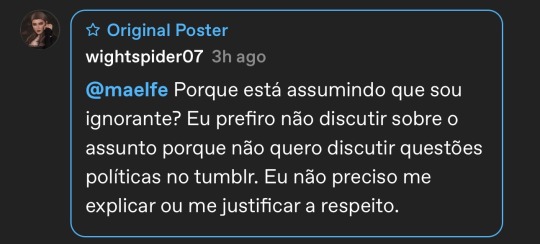
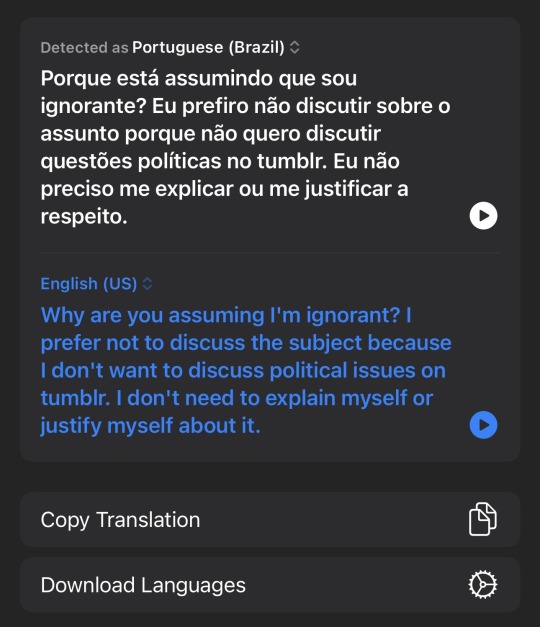
…refusing to disavow and divest from a zionist website that’s actively using every drop of engagement they get to line the pockets of the IDF is a…bizarre (deplorable) choice, given the fact that we’re watching a genocide occur before our eyes.
to call said genocide a ‘political issue’ is—also!—a very bizarre choice! 🫠
ANYWAYS!
FREE PALESTINE! STOP DOWNLOADING CC VIA CURSEFORGE.
(and throw a follow to @simmers-against-curseforge!)
#also … being silent on ‘political issues’ (*left eye twitches violently*)#when the ‘pOLitIcAl IsSuE!¡’ in question is GENOCIDE#just goes to show that you are SEVERELY lacking in the matter of morals and human decency#*in MY opinion*#but like … what do I know??#s/o to simmersagainstcurseforge!#lord pls take all palestinian people’s suffering and give it to zionists!#jas.is.talking
3 notes
·
View notes
Text
Okay I have to say it.
Will, Ada and Montresor did something way worse than Annabel Lee.
Why? Because motive matters. Now don't get me wrong, a good motive cannot justify an inherently evil action, it however matters more and more when going deeper into more morally grey areas.
Annabel has made it very clear she understands these people, including Duke to be damned regardless of her actions and basically sees herself confronted with a trolley problem that goes: "You, your wife and like X other people are bound to rails. A trolly will run over all but one of you. However if you pull just the right levers, both you end your wife will survive. The first lever you must pull is on Duke." While this doesn't make her actions noble, it gives them a noble cause and one could argue in several ways that she's acting within a moral grey area if we take the situation to be as unshakable as it seems. To make to examples, one could argue in an utalitarian way (this saves more lives than the other option) or in a very human way (this saves a loved one at the cost of a soon to be dead man, who could blame her?). There are also concepts of morality that would condemn her, like for example the categoric imperative or Jewish or Christian (and I think Muslim) religion, in which it is inherently bad to kill a single person even to safe thousands of others.
Annabel considers killing Duke a necessary evil.
Montresor however is acting out of pure sadism and spite and he puts on quite a show to make this clear. He had done so even if he believed everyone would get a happy end and he is having the time of his life killing Duke. That is picture book chaotic evil behaviour right there and by no means redeemable.
Will and Ada? Arguably worse than Montresor, at least not a bit better. This is the kind of stuff that makes large scale modern genocides possible. Hannah Ahrendt (great woman, you should look her up) argues in her book "Eichmann in Jerusalem: A Report on the Banality of Evil" that evil at its worst is not some kind of demonic evil like it has been preached in medieval times, but lays within the sheer banality of an office worker casually doing the phone calls and paper work necessary to send thousands to their certain death, while the office worker goes back home, eats dinner with his family and thinks "I'm just doing my job. It's my supervisors moral responsibility, not mine."
Ada and Will tried to kill for no other reason than because they have been told to do so and the lack of willingness to accept responsibility really shows in their actions afterwards. So I am a bit confused when I see people arguing how terrible Annabel Lee is while defending the "poor boy Will".
So, controversial opinion: in this very specific case, even though Annabel Lee either started this or at the very least didn't stop it when she clearly could have, she hasn't committed anything as immoral as her henchmen committed, who did not even need a motive to kill.
Also I would every day prefer an Annabel Lee willing to kill Duke to safe her wife in the long run over an Annabel Lee that prefers to not be a controversial female character. Let's not forget these people don't actually exist.
#nevermore webtoon#annabel lee whitlock#montresor nevermore#will nevermore#ada nevermore#annabel lee#annabel lee nevermore#annabel nevermore#nevermore
226 notes
·
View notes
Note
I was about to pass out when I wrote that last ask (cause I was sleepy) so I couldn't even complete what I was writing.
The fact he felts guilt over her death even years later proves to he did feel bad about it on a moral level rather just avoiding consequences for his actions, plus I think the fact that it bothers him that he doesn't feel bad about the bad stuff he does shows he doesn't like being a bad person even if he can't change it.
About the Ashley point, I was gonna add that part of his attitude towards Ashley after the death of Nina is the fact that the reason she did that was because she was jealous and wanted Andree for herself, which from his perspective feels incredible stupid because he's always been there for her and he's always taking care of her, even when he repeats it over and over, it isn't enough for her, it's never enough for her, which is probably when he actually started thinking all those horrible stuff about her and being actually mean to her, if Andy isn't enough for her no matter what, then why bother acting like him?
To add on, I think it's implied that him acting violent started during his breaking point towards the end of Episode 1 when he snaps and starts trying to choke her, it's his first act of actual rebellion and what starts to change their relationship, it's implied that he was docile and doormat before up to that point...so 15 years, that's a lot of restraint.
About him being an uncaring person, I feel that he can care about other people if they're close to him, like he does with Ashley and he still cares about Julia, it should also be noted that the people he ends up killing so far are complete strangers to him or people he dislikes (or tried to kill him) as shown with those wardens, that gamer girl, the hitman and his parents, considering he does felt guilt about Nina and goes to kill himself after he kills Ashley in the Decay route (although that's it's own can of worms) shows that killing people he does care about does mess him somewhat.
I be honest, IDK what was I going with this (drinking medicine after so long really messed me up) but the point is I don't think Andy is as messed up or cruel as some go so far as to saying, obviously he's far, far from a saint as you can get but I don't think he's as evil as Ashley or his mom
I figured it wasn't complete :P
No, Andrew isn't cruel. I don't think anyone can argue in good faith that he's cruel. He draws no enjoyment from the crimes he commits - the only time he expresses something resembling it is when he thinks back to the warden who was "leering on Ashley" and he regrets not killing him slower. But that's just simple brotherly protectiveness or is it
it isn't enough for her, it's never enough for her, which is probably when he actually started thinking all those horrible stuff about her and being actually mean to her, if Andy isn't enough for her no matter what, then why bother acting like him?
Aside from this being painfully relatable lol, I love how this is one of the two ways that lead to the Decay route. I've seen most people talk about entering it through Andrew accepting his mother's olive branch, which symbolizes his desire to be "normal" and blaming Ashley for everything bad he did. But Ashley not trusting Andrew with their parents also has merits - the big argument in Ch1 that ended with Andrew choking her started precisely because Ashley didn't trust Andrew, she seriously believed he wanted to fuck the lady, that he wasn't faithful to her. Ashley has severe abandonment issues and a complete lack of a sense of self-worth, which is what pushes her to force Andrew to be "stuck" with her - because no one would actually love her, if they had the choice!
Obviously Andrew, as anyone would, grows tired of this shit, the lack of trust and respect after everything he has done for her, hence the route where they grow apart :D
Again, I've gone on a tangent. I really want to talk about them <3
he still cares about Julia
That's the other thing people are split about. Did he care? And how much? When Julia says that Ashley should learn some independence (which is code for "dude she's too invested in our relationship and it's creepy), Andrew dodges the issue, justifies Ashley and talks positively about her. He asked her to tie up her hair which is very obvious why. When Julia broke up with him, Andrew could only offer a "I'm sorry, I guess? But why should I be blamed?" (although he does call out Ashley for interfering in his romantic life). Then there is the matter of the voicemails that he hears in his dream: were those made up by his subconscious? (and considering how most of them are Ashley slutshaming Julia and bragging about Andrew needing her, bro) Or did Andrew, somehow, hear them... and did nothing?
I really want to dissect Andrew under a microscope lol. He's not a poor innocent victim nor he is an abuser in the same way as Ashley... but he's such an unreliable narrator that I think most of his psyche is still shrouded in mystery.
#the coffin of andy and leyley#andrew graves#sorry i can't give a concrete answer#it's just. there's a lot to consider
12 notes
·
View notes
Text
Kill Boksoon (2023)
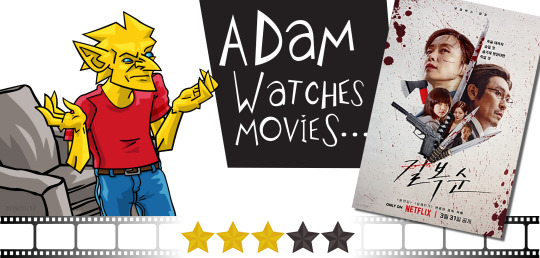
As an action film, Kill Boksoon has the pulse-pounding sequences of hand-to-hand combat you're looking for. When the picture slows down to focus on its family drama and side characters, it can’t help but feel derivative of other works. Whether the stunts and choreography are enough for you, I can't be sure. For me, I found it lacking.
Single mother Gil “Kill” Bok-Soon (Jeo Do-yeon) is a hitwoman working for M.K. Ent, one of several criminal organizations specializing in discreet - or not-so-discreet, if that’s what you want - assassinations. Gil is also a single mother who struggles to connect with her teenage daughter, Jae-yeong (Kim Si-a). As Gil contemplates retirement, the two worlds she’s worked so hard to keep separate start moving too close together for comfort.
I never buy into these “assassins with a code of honour” movies. Bok-Soon’s boss, Cha Min-Kyu (Sol Kyung-gu) goes into great length about this airtight secret society of killers he and his peers assembled, how they won’t slaughter children, will always do the jobs they’re assigned (among other rules) and how this has made the criminal underworld a better place. It just doesn’t hold up. Firstly, any drug addict will accept to do pretty much anything if you give them $100, so how exactly can Min-Kyu and his sister Cha Min-Hee (Esom) guarantee only "sanctioned" killers are "working"? We see them take out targets outside of Korea. Are we supposed to believe there aren't any mercenaries anywhere else? Next, that code of honour. Give me a break. So you’re not killing little kids. What you are willing to do is make them orphans, and the second someone turns 18, they’re fair game so don’t pretend like you have some moral high ground. You didn’t see Mother Teresa handing envelopes of cash to get someone whacked. What I’m getting at is that no matter how much the film tries to get you to sympathize with Bok-Soon, a part of you will always think “she freely admits she’s going to Hell because of all the crimes she’s committed. I’m pretty sure the planet would be better off without her.”
Even if you don’t have issues with the problems above, the premise isn’t original. You figure Bok-Soon will eventually have to turn on her fellow assassins, with her boss - the man who taught her everything - facing off against her at the very end. We’ve seen that a thousand times. There is a bit of intrigue in the family drama stuff. After a violent incident at school, mom wonders if the apple doesn’t fall so far from the tree. Too bad that business makes the film swell up to a needlessly hefty 137 minutes. Way too long.
The action scenes are the reason to see this picture. Director Byun Sung-hyun does this cool thing where he has his protagonist imagine how a scenario might go, and then show Bok-soon snapping out of her fantasy so she can try something different. It’s a clever way to extend the fights and more than once, catches you by surprise. The stunt choreography is great, with an extended brawl in a bar is the film’s highlight.
In North America, Kill Boksoon is being released via Netflix, which means you can see it "for free". This is a film that ultimately, I doubt you'll remember, which means that's the right price for it. From the comfort of your home, you can set aside the blemishes and focus on what works, which are the action scenes and to a certain extent, the family drama. (Original Korean with English Subtitles, May 21, 2023)

#Kill Boksoon#movies#films#movie reviews#film reviews#Byun Sung-hyun#Jeon Do-yeon#Sol Kyung-gu#Kim Si-a#Lee Jae-wook#Esom#Koo Kyo-hwan#2023 movies#2023 films
2 notes
·
View notes
Note
It’s important to note several things with starco:
- Marco is canonically 26-35. The magic system that has been used to determine all of previous canon reality is not suddenly “just joking around haha ha” when the choice was made for some godawful reason to, instead of adhering to the already kinda sus Narnia rules of age dilating child characters, just canonically make him an adult man in a teenager’s body. Nobody asked them to. Nobody expected them to.
That is pedophilia. A 26-35 year old man dating a 14-16 year old teenage girl is pedophilia. We aren’t entertaining the inverse “she looks 12 but she’s really 1000 so it’s okay if an adult lusts after her” thing: that’s not why the predator is choosing an immortal character with the body of a young child. And so we are not fucking doing the “Marco’s a grown adult in his thirties but he looks like a 14-16 year old teenage boy, so it’s completely natural and reasonable for him to have romantic/sexual feelings for and relationships with actual teenage girls!” That is fucking sick. And the horror of what Heckapoo’s grooming did to him would have been really interesting to explore with the gravity and tone it deserved.
- Marco is both the only bipoc main character with visibly brown skin, and the character chosen to gaslight a possibility of trans representation and allyship. Like. Think about that. This melanated, Mexican character that was teased as being trans, is the one who at the end of the show is canonically an adult man dating a teenage girl. So we have an adult Mexican man who’s worn a dress to break into women only spaces (Saint O’s) dating a white teenage girl. The layers of transphobia and racism are baked in. You can’t sift that out anymore. (and how an audience of trans kids was lead on by that gambit is unironically deeply transphobic and fucking cruel, they are desperate for representation, we all are, and kids by their lack of experience tend not to notice the same red flags as adults in their community would. I’m trans, it fucking hurt to see kids think the show was still on their side and didn’t see them as freaks)
- Disney has a long vast history of colonial apologetics, racism, transphobia, homophobia, and endorsing pedophilic relationships to teenage girls specifically (though don’t get me wrong, there is plenty of Disney media that endorses pedophilic relationships between adult women and teenage boys.) I was a teenager in the 00/10s. And I was watching Disney media“about teenagers” before I was one, too. One of the things I see still painfully underdiscussed is how Disney was and apparently still is full of open endorsement for teenage girls to date adult men. Men aged 26-35. This matters. People barely ever touch on the colonialism in how it goes deeper than just sloppy surface racist arguments (already not good) and the corporation retains a very established stake in delusions of a white master race throughout its works, in how it approaches narratives of colonialism and genocide.
If you like the ship, could you figure out how to headcanon Marco as a teenage boy? Teenagers processing this and absorbing it uncritically are not in the wrong, and I’m not yelling at them for not being able to understand the 4D dilation distance between a teenager and an adult, given they literally have not traveled that distance yet and so have no concrete sense of the actual berth and mass of it, how an adult looking at a kid will only ever see a kid, and that is a boundary that is violated by choice. Kids have crushes on adults and don’t process adults are not just slightly older kids all the time. That’s a normal part of being a child. But the adults. The adults who created these conditions whether they’re on the crew on in the fandom. You are fucking sick. I don’t care about moral superiority. I don’t care what you think you technically have “the right” to create. You are showing children. You are endorsing this to children. Real children. I’m not angry because it’s x show or y media corporation. I’m angry because of my understanding of pedophilia as an atrocity against mankind itself. The dehumanization of children, turning them into objects let alone sexual objects, is evil. I use that word very seriously now. It is an atrocity that is part of every genocide both actively committed and occurring in trauma cycles. If you have some compulsive urge to create and promote pedophilia to children, get help, real fucking help, and don’t fucking show the content to children. Keep that shit to yourself. Burn it after you’re finished. It should not exist.
SVTFOE writers: We made Star and Marco major assholes- I mean, make dumb decisions because that’s how real teenagers act. Also SVTFOE writers: Star and Marco loved each other since episode one!!!1!!
Lmao 😂
Hey, it’s true that relationships can be messy and that teenagers, being unexperienced, can make a lot of dumb decisions.
But they overdid it a little bit with Star and Marco.
10 notes
·
View notes
Text
Setting the Stage - A “Triple Frontier” Criticism and Edit
Part 1 of 4
Words: 8.3k
Warnings: Discussion of canon-typical violence/gun violence, the US military, the drug trade, murder, racism, racial stereotypes, mention of character death.
Credit: Photos taken from IMDb

Hi my name’s E and I’m here to offer extensive criticism and a rework of what I consider a bad movie.
These critiques and changes are predicated on a familiarity with the movie, Triple Frontier. I will assume if you’re reading this you know the story and the characters; this won’t exactly be fanfiction, as I am not rewriting the entire movie, but I am taking the gist of the movie and changing some scenes and dialogue to give more character depth and better motivations, thereby strengthening the existing plot. Sort of a chiropractic adjustment. The overall story has the same narrative. The point is to say “Here’s how it could have worked or been more effective.” I’ll be using character names and nicknames interchangeably. Most ideas and criticisms are being given in bullet point format, with a few notable dialogue and scene changes written in story format. This is more of a conversation/PowerPoint than a refined essay; excitement and agitation means I’m able to actually get the words out. That being said, I apologize if I repeat myself but it’s for emphasis and to make sure the next thing I say is in the context I’ve established.
I'll start off by saying I watched the movie because it had some actors I like and I’m usually a fan of action movies.
I’m not going to get too in depth about the glorification of the US military that’s pushed regardless of what consequences do occur in the movie; the main characters are still framed as somewhat justified in the end because we never see any direct repercussions for the rest of their actions as far as being apparently-influential and still resourceful, highly skilled men going on a rogue money-grabbing mission by themselves with no oversight or accountability, and the antagonists are all portrayed as being mostly nameless, violent South American drug runners. Sure, Tom dies and they lose the money, but they still murdered SEVERAL innocent people and threatened/coerced even more into cooperation at several turns (their informant and her brother, the villagers, the kid with the Jeep, the boat captain, etc.), and they’re still somehow able to just leave and do whatever they want at the end?? Who is helping these people? There are hardly ANY supporting characters in this film??
So the critique is here because having seen the movie, I was disappointed. The movie was neither ‘good’ nor ‘enjoyable.’ By ‘good’ I mean that the story was weak, the characters and plot were not compelling, and there was no decent take away from it at all. I’m not saying all movies need to have some grand moral message at the end, but they do need a “why.” Why tell this story? Why does it matter? Why should it matter to me?
And as far as enjoyable goes, I mean that it wasn’t even a popcorn flick. It’s not fun. There’s no humor or levity (which I’ll come back to later), the dialogue/script was weak, the given scenario wasn’t compelling or complex or even that interesting to be honest, there wasn’t anything especially noteworthy about the flat characters, and the treatment of the antagonist/s and obstacles left much to be desired. (This is besides my complaints about the pro-US military vibe and lack of recognition of the US’s involvement in the drug trade history in South and Central Americas.)
What little I liked: The connection between Will and Benny showed through as a convincing brotherly relationship, which directors/writers somehow often get so wrong in movies. These two seemed like real brothers (especially in the way they fight after Tom’s death), and I liked the camaraderie between Catfish and Pope because those actors already have good chemistry with each other. The actors did okay with what they were given, but they weren’t given much. The scenery was pretty and the folks in charge obviously had the budget for the production value they achieved; it was a well-funded action movie, but that was about it. I didn’t care about the characters, so the people didn’t hold my attention in any emotional sense, and it didn’t really say anything at the end.
You could say the theme they were going for was “What will these people do in the most dire of circumstances with the biggest possible reward of their life in front of them?” but because we don’t care about the barely-introduced, two dimensional characters and because we have no levity, humor, or depth of character history to contrast the dire circumstances to, and because the actions they take are despicable (seemingly without any repercussions at the end), the theme is just left hanging. It's like the writers said “Ooh will these men resort to breaking their code of ethics for money???” but… We’re shown almost immediately that they do. And they do it again, and again, and again, doing increasingly despicable things as the movie progresses. On my rewatch of the movie, Pope has a line in Tom’s car in the first act when he’s trying to convince him to join where he says “And wasn’t most of the live combat you saw against the Geneva Convention technically?” and Tom says “Yeah…” Which is bafflingly bizarre to me that you would tell the audience to our faces that these men are self-admitted war criminals??? How on EARTH are you going to convince me to be on these guys’ sides of the story after a line like that??
Since we didn’t know much about the characters before the inciting event (Pope receiving intel about Lorea and the money), for all we know these men could have already been ready to make these decisions because they’d done them before. I don’t just mean killing people, I specifically mean murdering innocent people in cold blood for money because they’re wound tight and the probability of being caught continues to increase. They endure immediate physical consequences as they escape but we aren’t given a satisfactory resolution at the end for us to see any repercussions or sacrifices other than Tom himself dying (which didn’t impact me either) and signing over what’s left of the money to Tom’s family estate (which I also didn’t care about). The men don’t even convincingly show us there’s any significant emotional impact to losing him aside from the immediate scene where he’s killed.
This is besides the gaping plot holes of everything setting up the mission being far too easy and almost barely researched. It seemed like the writers said “They’re retired special forces, they already have all the contacts and gear and skills they’ll need to do the mission”. So much of their ability to get to Lorea’s house in South America was too convenient. “I know a guy, he owes me a favor” was the excuse we heard so often when we don’t see many of those alleged side characters on screen until they provide what the MCs needed, and we don’t see the trade offs/sacrifices to having what was needed at a moment’s notice. In short, it seemed like the writers were playing with action figures on a fun movie set instead of crafting circumstances that would weave these characters’ struggles together in a way that would have compelled audiences to care about the good in them and feel anguished when they start to slide against what should have been some sense of ethics. It was too easy for them to start shooting people (and yes, I’ll concede that this was one of the things they briefly addressed in the movie, but it didn’t work because I wasn’t given a contrast of their characters to care about).
So let’s talk about the characters. (Brief canonical details listed with my suggested changes)
Will ‘Ironhead’ Miller
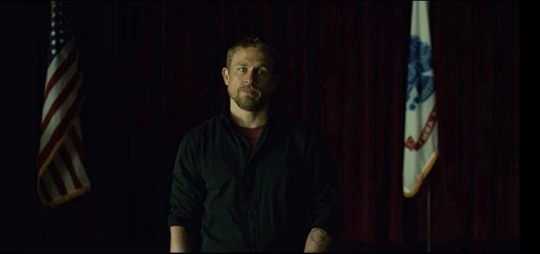
I had the initial impression that Will was supposed to be the moral compass of the group. He’s the most centered and mild, level headed and in control of himself. How he carries himself and how he speaks in that opening scene almost gave me the sense that he’s really dealt with the reality of returning from active duty and maybe even had some therapy which has helped him. I thought the rest of his speech was going to be “If this is the career choice you want to make, make it carefully because these are some of the consequences of what could happen when you return. Here are the ramifications for making the split-second decisions in the field that are being asked of you. Weigh your ethics and your constitution because this will be what you’re capable of; whether or not you choose this opportunity is still up to you.”
He tells the story in the beginning of the likely PTSD-induced episode at the supermarket, and it’s given to us/the other soldiers as a cautionary tale… At first. The second half of his speech after the break to Santiago’s introduction almost seems like a 180 because he’s encouraging the potential spec-ops soldiers to follow in his footsteps specifically “To be warriors”, saying they’ll be ready to exact violence at a moment’s notice because of their potential training (which I know is predicated on the idea of the US military elite being Super Cool and What You Should Strive to Be, The Best of the Best of the Best Sir with Honors).
What would have made this scene/characterization more compelling is if we’d seen that he didn’t actually believe what he was saying, he was just doing what he was required to, being paid to sell the idea of the military like every recruiter is, but he’s personally disgusted by what he has had to do (both in active service and by giving speeches he doesn’t believe in because he’s in need of money).
Easy fix? He tells Santiago exactly that in his conversation directly after. It would have been better for him to be the character most wanting to separate himself from his earlier career because the other clues and indications throughout the movie almost seem to allude to that, even though he’s also the one spouting the whole “we used to be warriors” bull, which I'm nixing from the retelling. (This won’t be the first time the writers have some weird contradicting characterizations.)
His reticence to join Santiago would have had more grounding. His careful keeping count of confirmed kills and more obvious remorse seemed to me like he was maintaining personal accountability, and his lack of initiating the first shot in the shooting scenes, his quiet reprimand of Tom in the helicopter after dropping off the informant and her brother, and his initiative to sign over the money first at the end all point to someone with a more fixed moral compass than the others of the group, and I think his quiet leadership is understated in a way that would have made his contrast and conflicts with the other men into a stronger character. I thought him asking the other men how many people they killed was supposed to be construed as holding them accountable and facing the reality of what they did in order to maintain their humanity and keep them from being trigger-happy in the future.
Maybe he only agrees to the recon because he thinks Pope is going to go through with it anyway, and he feels obligated to make sure nothing goes too far.
Maybe one of the bullets Tom took while in active duty was meant for Will or one of the others and Tom put himself in the line of fire to protect them, hence Will saying he thinks they owe Tom (it is unclear what exactly they owe him in the movie; an opportunity to make money? To regain a sense of purpose? Not sure.)
Maybe (and this is the line of thought I’m going to follow through with) he says he’ll do it if Redfly does because he genuinely thinks Tom will be able to keep the crew in line and run a tight ship (which would set up the bitter irony of Tom’s decisions later)
I think Will could have been established for us to see him as a strong choice for a leader of a group but he consciously chooses not to be because he doesn’t want that responsibility, he doesn’t want to have to take up the mantle of leadership even if others (any or even all of the guys) think he’s more than worthy of it
Because they respect him as the guiding moral compass
Going back to the idea of Will being our lens through criticizing the military life and how it’s the reason the five of them are in the positions they are, we could have even set Will up as working with the VFW or helping retired soldiers who had seen active duty reacclimate to civilian life, showing us that he’s seen what it’s like for so many, not just himself. There are plenty of first-hand real-life accounts of the government/military not providing enough proper care for discharged soldiers upon their return to civilian life; if we base where the characters start at the movie on that idea, then we know why they’re desperate, why they’re in need of money, why they’re struggling in their social circles and jobs, hence why some of them are willing to go to the lengths they do when they agree to the heist. Small moments of bitter cynicism or conflicted reluctance when they talk about the service didn’t have to be overt or even verbalized, it could have easily been conveyed through the characters’ mannerisms and tone of voice– Instead in the movie, the script has them touting the “We used to be warriors” BS as a way of saying “We used to do a cleaner job eliminating obstacles” instead of “We use to fight in the name of defense.”
It’s weird that they never say what branch of the military these guys served in, but my gut says special forces? The flag to the right of our view of Will in the above picture is a US Army flag, and it’s possible either his or Benny’s tattoos may have a clue, but that’s not enough for me since it’s implied these guys are more highly trained. Regardless, the movie doesn’t show us their internal struggle with morality because it’s not addressed in the beginning as being an issue. Yes, they talk about whether or not they’ve gone too far after they shoot a bunch of villagers, but I never felt that as an audience member because they still continued to make worse decisions. Part of that is due to the story naturally needing to up the stakes, but the tension wasn’t portrayed through the characters’ internal debate or personal conflicts between each other
Santiago ‘Pope’ Garcia
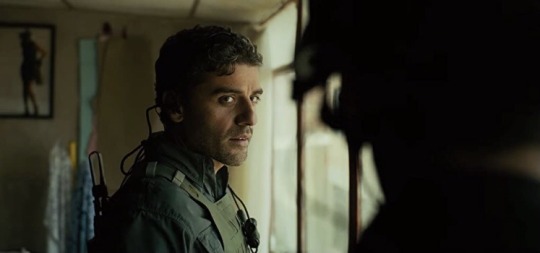
Santiago is the idea and resources guy, the hands of the operation. He’s focused on a mission, a goal that he can pull from his resources to accomplish. He’s the people-person, the contact-expert, the organizer, the voice the face the persuasion. He keeps a running catalog of people, names, places, favors, and skills, anything he can use at his disposal in order to get a job done. He likes to have a hand in being in charge and being in the know, and he likes providing answers when things go awry
Santiago is also framed as the main character (though even that is weak at best), which is why I think the struggles should have tied more to him than they did
That being said, because the plot and circumstances aren’t that deep, I personally think it should have been him in charge of the strategy, since he’s obviously smart enough and he’s the one with the initial intel— he knows everything about the given circumstances already. The fix? Give the characters internal conflict. Tom’s in charge is because Santi asked Will to be in charge first but Will wouldn’t do it, and not only that, Will wouldn’t come along unless Tom was in charge. Santi thinks Will is a stronger leader (and in the changed scenario he’s right), but for whatever reason Will thinks Tom is a better leader/more upright/whatever, and if it comes down to Tom being a former higher rank anyway, Santi has to bite his tongue and cede the position to Tom in order to ensure he gets Will onboard at all
This conflict strengthens when it comes out that Santiago has deceived them/“omitted certain truths” in order to tempt them into a solo mission instead of pairing with the agency he’s part of; Will has a deeper reason to be angry with Santi and it strengthens Will’s thought that Tom was the right choice to lead this in the first place (furthering what should have been the tragedy of Tom’s death, because it’s good for a character who is generally right and upstanding (Will) to have made the wrong choice in trusting someone. As is, Tom’s death was because of Tom’s greed, hubris, and wrong decisions.)
In the rewrite of the movie, making the heist itself more complex would at least explain Santiago’s need for someone other than himself to make the plan. The fix is to not give Santiago all the intel before their recon, let the five of them discover some of the potential dangers while they’re there (legitimizing their reason for having a recon mission in the first place), complicate the plan by making Lorea himself a fully rounded character, and have them formulate the plan together. Focus a bit more on the heist being a bigger part of the movie, not their escape.
This is a side note, but I think it’s important to address in the topic of fandom at large: Fanfic authors should be aware of how they might be characterizing Santiago as this sort of vocal, overly-flirtatious, sexually-charged character in their stories because we don’t actually get a lot of that from the movie itself; any reference to Pope being a ladies’ man comes from Tom. Tom’s the one who insinuates that Pope’s informant is A. a woman, B. an attractive woman, and that C. Santiago is sleeping with her.
Benny only makes a remark about Yovanna being Pope’s girlfriend after Tom does, and Benny’s the one to say she’s beautiful. Tom’s the one to again say “I knew it, I called it.” Santiago makes a brief rebuttal, but has no visible reaction in the movie; it would have been nice to see him bite his tongue or glare at Tom, just for a second, so we could see Santiago’s thoughts concerning Tom’s continued assumptions of his and Yovanna’s characters/relationships. Heighten the interpersonal tensions through the actors.
Santiago and Yovanna both deny that they slept with each other, and neither of them appear to be lying. Santiago genuinely does seem like he cares about her safety (shown through the lengths he goes through to ensure she gets away and is provided for, as well as having not told her any information that could lead Lorea’s men to her if they got to Santiago). If we go with the changed story where Santiago is only asking Tom to be on the team because Will told him to, his non-answers when it comes to Tom’s prodding can be attributed to him having to bite his tongue and redirect the conversation back to persuading Tom to join the mission
Tom also makes a somewhat racist comment about not having seen Santiago for a few years, thinking he’d “Gone native down in the jungle.” Maybe Tom has a history of saying little things like this that get under Pope’s skin. They can all still have this friendly brothers-in-arms camaraderie, but even real-life friends make crappy insinuations you don’t always get to call them out on.
Now why do I think this is an important distinction? Because the “sexy Latin lover” stereotype is one that is a consistent problem in both media and fandom spaces, and I’ve specifically seen it attributed to Oscar Issac’s characters quite often. I understand a lot of fanfic writers write romance, but there comes a point when how someone speaks about an actor/character of color plays more into a stereotype than what we’re actually given even in the source material, especially in this case when the comments about Santiago’s relationships with women come from Tom, who we all agree is pretty much The Worst (so why should we take what he says about Santiago at face value anyway?)
And yeah I know the point of fanfic is often to pick and choose what parts of canon we incorporate, and to do what we see fit with the characters, but this is specifically a racist stereotype that I think people need to be more aware of when it comes down to writing Santiago’s character
Onto Santiago’s flaws: Ambition, greed, impulsiveness, and a lack of accountability. He sets himself up to make the wrong decisions in forgoing the partnership with the agency. I think he’s aware that Will would be able to direct and delegate to the rest of the men, keep them calm and focused. Maybe he’s aware that he’d be too keen to do things his way, and he doesn’t want to strongarm them into helping because he does need their help and he does trust his friends, and he needs for his focus to be on Lorea
He’s the one to suggest doing this mission on their own without government/agency oversight. He lays out the most well-laid plans in order to coax the other four of them into helping pull this off because it should be easy and he can’t do it without them. He has the strategy, he has the intel, he has the resources, now he just needs the hands.
Tom ‘Redfly’ Davis
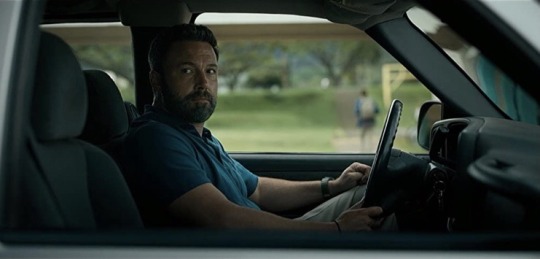
Tom as he stands in the movie is framed as the head. We’re told that he’s the strategy-minded planner and leader .
Tom already seems like he doesn’t have much left to lose at the beginning of the movie, which is why I think his marriage should have been on the rocks instead of already over. We get the introduction of his daughter Tess and the strained relationship he has with her, and then she’s never mentioned again whatsoever. He hasn’t adapted well to a civilian job and he’s an alcoholic, and while all of this is in line with struggles returning vets face (often in accompaniment with PTSD), it seems like he’s already given up because those relationships are already over. If he doesn’t have anything to substantial to fight for, then why is he willing to take the risky recon mission even if it does pay well? There’s no tension if we already know he’s only there to get the money for himself.
Again, I think Santiago should have logically been the head of the op because nothing Tom strategized is that difficult to pull together. Santiago could have come up with that exact plan to enter the compound and kill Lorea, because he already knew the family would be at church on Sunday. The only thing Santiago doesn’t seem to have is the actual lay of the land. This is a weak point in the plot itself, being that the recon wasn’t really that hard to accomplish, because it should have at least set up that the actual mission, once they decided to do it themselves, would be more difficult (especially with it just being the five of them instead of a full team).
If we established that Tom did have more at stake back home, he could have been more manipulative in how he gets the guys to go along with his commands. Heighten interpersonal tensions by having him telling Will to think of Benny, and by relating to Catfish by telling him to think of his family. It would give his own greed credence, and give the men forward motion to push through their own reluctance (because in the film, the guys already show us they disagree with Tom while they’re packing the money. It was too early to show the team Tom has already morally failed as a character.).
It’s important to note that after Will gets shot, Santiago is ready to call it and make a safe trek through the jungle each with what they can carry, and Tom is the one to overrule. Santiago was in control, and the movie could have ended there if Tom hadn’t pushed past it.
One of the failures of the script is in framing Tom as someone who pushes for what he wants (taking longer to ransack the house, overloading the vans, pushing to carry the full load on the helicopter, wanting to cover up their tracks by killing Yovanna and her brother), but not actually making his verbal arguments anything stronger than a complaint. This is a failure where they tell the audience he’s pushy instead of making stronger cases by showing us. He repeats himself, but doesn’t say much more than what he’s already said before (“Are we really going to leave this much money on the runway?”) before the guys cave to his demands, nor does he do anything to physically intimidate or motivate them, hence my suggestion to make him do more to scheme, persuade, and strongarm them instead. Some of the rewritten scenes in following installments will exemplify this.
Frankie ‘Catfish’ Morales
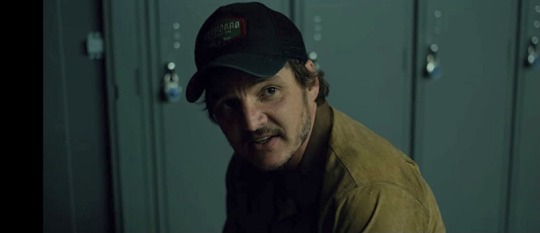
Frankie is the most visibly and verbally reluctant to go through with the plan: he’s our voice of reason. He doesn’t seem like he wants to go in the first place, he has good reasons for not going, and even when they do get down to Lorea’s house, he doesn’t seem as keen to pack in the extra money (although it is important to note that he does go in search of another wall to break through and get cash from; erasing what we do see of Frankie’s own greed would change the character and interpersonal dynamics entirely, so it’s important to acknowledge that he’s got the same temptations as the rest of the men, or else we would logically have had an entirely different story— How these details are portrayed in the movie are contradictory without having solid grounding).
That being said, I think we could have had one of the most interesting dichotomies in a character: the voice of reason who caves to peer pressure.
Because of how lacking the script is, we don’t actually get a solid reason why Frankie agrees to the mission (I’ll explain my own idea further down). The times he’s asked to do something he’s already vetoed or said no to before, he caves the moment one of the guys (usually Tom or Santiago) asks him a second time with no actual change in what they say or how they say it, and we’re not given a reason to believe why he makes his decision. Santiago persuading him to be their pilot doesn’t take much convincing in the long run, and Tom only gives two rebuttals during the helicopter takeoff scene before Frankie says “Okay, she’ll make it.” (That’s not how helicopters work and he would have known that. The blades can’t pressurize the air to climb higher, and every pilot worth their salt knows it too. It’s not like physics stops existing because you want something bad enough). It would have been better for Tom or the others to put up more of an argument, or band with each other to push against his verdict, or go behind Frankie’s back when he disagrees.
Many people have interpreted his agreement to go along with the recon as him wanting to keep his teammates alive, only going down to make sure that he can fly them out, and while I like that interpretation, I think it gives the movie too much credit. However, because I like that interpretation, I think it could be fleshed out with just a little more dialogue in his scenes (which I’ll add to later), but like I’ve mentioned, we really needed to see more of why these characters were desperate to begin with so that we could realistically believe the motivation of greed.
The reason I think it should be more apparent that he’s acting out of a sense of responsibility to the group is because realistically, Frankie should already know the moment Santiago says he needs him that this isn’t just a recce; why would Santiago need “the best pilot [he] knows” if this is supposed to be a quick in-and-out reconnaissance mission? If they’re working with the agency and they’re just there to get the lay of the land and the house, he wouldn’t be needed as a pilot. Why would they need the helicopter in that scenario? What are they flying in, or what are they flying out?
So now we say Frankie knows that Santiago is planning to go rogue and haul the money out of South America from the start. That, in addition to the fact he’s a family man now, should be why he’s reluctant in the beginning, because he knows his friend won’t be satisfied just setting up the plan to get Lorea. He knows that Santiago is going to rope them into something more, and he worries that if he’s not there to get them out of trouble, they could get hurt. (All these guys suffer from serious brothers-in-arms ride-or-die loyalty, which is a great flaw to exploit, but it means they would make terrible friends in real life.)
Now for the reason why Frankie does have his own sense of greed? Consider this: Frankie says he has a new baby, and he also tells Santiago he lost his pilot’s license because of a coke charge (another point for the military failing discharged soldiers is that without treatment for [likely] PTSD, servicemen will sometimes turn to illicit drugs as a means of coping).
If he failed a drug test and lost his license, you could imply that he’d lost his job. And with his wife (?) so late in the pregnancy and/or just having had the baby, what if he didn’t tell her about either of those facts, and STILL hasn’t told her?
So NOW we have a man with two huge secrets, dwindling savings, and a family to care for (after a huge medical cost) who don’t know just how badly he’s screwed up, and has been lying to them about it. That is a compelling character motivation to take a dangerous job to receive a lot of money in a short amount of time, even before the promise of millions once they’re there. You guys have seen The Incredibles.
Frankie seems susceptible to being swayed especially when his friends butter him up when it comes to something he’s good at (“ ‘Fish. I need a pilot. I can’t do this without you.”), and while part of being the Mom Friend™ is that you feel a responsibility towards your friend group as the voice of reason, you also feel guilty always having to be the one to say No and you tend to want to keep an eye out when you know they’re going to do something that could get themselves hurt.
It makes for an interesting contrast in his character, especially when we get to see hardened Frankie as the voice of reason when they’re at their most desperate, a fact that is highlighted during the scenes involving his skill sets: getting the men to wrap up in the house and head to the van, figuring out the weight problem prior to takeoff, flying and subsequently crashing the helicopter, driving the Jeep and finally snapping at the others near the beach, insistent and hard and capable and forceful
Part of both peer pressure and being the Mom Friend is that your feelings are constantly side-lined. It’s why the guys are more mad about the mule falling off the mountain, not even seeming to realize that Catfish almost died. It’s why they continue to pack in the money, even though he says there’s a weight issue. It’s why it’s so weird and jarring for them when he finally does snap about the teenagers.
So maybe we have Santiago realize the necessity in appealing to his men’s humanity instead of their cold-hearted logic, because that is more in line with how Frankie ends up making decisions at the end of the movie
Benny Miller
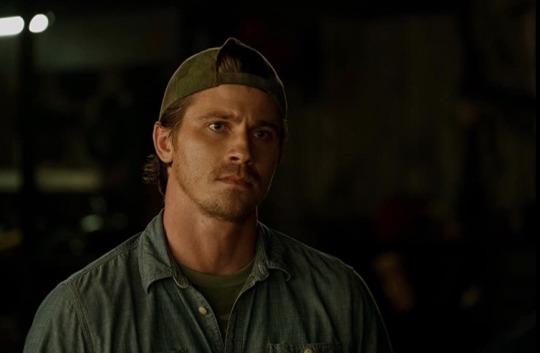
Benny, along with Frankie, barely gets an introduction, and it’s honestly laughable (which I’ll get to in a minute when I talk about editing). Obviously he needs the guys to focus and not distract him before a match, and I’m fine with him being the one to initiate the domino effect of getting the guys in on the heist, but it would have been better if it had happened after he lost the match. Have him angry and frustrated and tired of getting his face knocked in for less money and losing sponsorships, and that’s enough for him (as a presumably young single guy) to say yes to a quick buck via work that’s more in his wheelhouse like Pope is offering.
Criticism on the editing in the film: You know what happens instead of a full character intro? Benny says yes, the guys sort out some tentative details right before the match but as soon as the bell rings and the fighters tap gloves, Benny gets socked in the face and the movie immediately jump-cuts to an aerial shot of them driving in South America! We see Benny first, blinking blearily in the back of the Jeep, and you know what that edit conveys to the audience? Benny got knocked out in one hit and they dragged him unconscious to the airport, got him to stumble onto a plane, and he passed out in the car. You’re really going to tell me this guy is an accomplished MMA fighter? Because that’s absolutely not what the movie told us.
Now overall, I think Benny is the heart of the group. He’s the most openly emotional, whether that be toward excitement at greeting Pope in the locker room, Tom agreeing to plan the heist, or about the amount of money they hauled, or the open fear/worry directed toward Will when he gets shot or toward Catfish directly after the crash, or angry at the sloppiness of the job in the house: (“What was that?! We don’t leave messes like that!”). He’s immediately distraught and openly weeps at Tom’s death while the others are in shock before reacting.
Interesting note, I see people write him as rather cheerful and goofy, when he’s fairly solemn for most of the movie. He has those moments of excitement like I mentioned, and while he’s impulsive and his younger age is shown in contrast to the other men in some of his scenes, he’s definitely not a cheerful guy. I just think he’s the most open about those emotions and wears his heart on his sleeve. The other guys seem to have more reserve, so Benny being the heart is a good contrast. He holds them accountable and doesn’t hold back what he’s thinking.
It’s also interesting to see Benny and Catfish’s bond; Catfish is early to fight night, Benny yells his name first when the chopper crashes (instead of, you know, his brother with the gunshot wound), and it’s Catfish who yells that he’s going to kill people as they’re racing to the beach if Benny isn’t there when they get there. Personally my idea is that Will and Frankie (before he lost his license) both worked at the military academy, so Catfish knows both of the Millers pretty well, and Benny sees him as the same kind of brother in arms/responsible type that Will is. You could say Frankie is more compartmentalized about killing people in the name of necessity than Will might be (“As many as I had to.”), but I also read Will keeping track of confirmed kills as a way of purposefully bearing the burden of what he’s had to do, instead of killing people without regard to the lives he’s took. I think that’s conjecture based on canon because of Will’s weird contradictory characterization, but that’s the direction I’ve chosen to write him.
I don’t think Tom is as close to the rest of the guys because even if they all served together like it’s implied, I think it’s inferred that Tom would have been their CO, and it’s hard to be friends with your boss when you’re bound to complain about them at some point. You don’t invite your boss to a barbecue you want to relax at.
Lorea
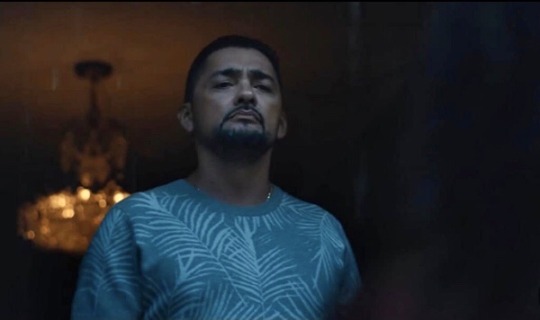
This is important: In the movie, Santiago makes it a point to say how imperative it is that they kill Lorea, and he specifically takes that responsibility on himself. When it comes to the scene where he kills Lorea, Santiago shoots him twice more after he’s already dead (presumably for good measure). The camera lingers on Santiago as he does it. That tells us this was much more personal to him than we’re really led to believe in the movie, because we aren’t given much about Lorea’s history.
Overall, Lorea is a bit of a non-character. He doesn’t actually have any personal connection to our main characters (most notably Pope), his only line is a single word, and we’re given no depth to him either other than the fact he’s family-oriented and somewhat religious. For all the movie’s intents and purposes he’s a shadowy drug kingpin who kills people indiscriminately (though we’re not given a reason for the executions at the tennis courts) and has a lot of money hidden in his personal home in the jungles of South America, and the framing/editing of his death scene puts so little weight on him as a person opposing Santiago that I didn’t realize it was him that Santiago shot until I watched the movie a second time. I was confused the first time around because I thought he was just another security guard.
I know the movie was trying to make it obvious how much of a Bad Guy™ he was so the characters we’re supposed to root for (and by extension we as the audience) don’t feel guilty for what the main characters do, but that’s shallow writing because he’s made into a racist, two-dimensional caricature of a violent Latino drug lord
It’s fine for an antagonist to be a static character (meaning they don’t have any growth or change in a story), but it’s not okay for him to just be an obstacle whose death is barely a blip on the radar of the MCs. I’m not saying there has to be a long and involved history, but we should have had one or two more scenes of him at the house, and the scene where Santiago kills him had to have more significance than making Lorea a prop.
Additionally, show us the familial and business connections as an extension of Lorea. We know his men set out after the MCs, so make it about more than just the money. Lorea’s men want revenge.
Because he has no personal connection or scenes with any of the main characters, there’s zero emotional tension concerning him. He doesn’t have to be some tragic figure or more nuanced villain, he can be a violent drug lord, but if there’s no emotional tension or history at odds with Santiago then he doesn’t really serve the purpose of the story in any meaningful way.
The fix? Two things: Santiago has to give us specific details about Lorea as they gear up for the recon, there needs to be an established history he’s working from, we see scenes of Lorea in his home separate from the protagonists, and Santiago actually has to confront him in the house. There has to be an exchange of dialogue, and to further complicate things, the family shows back up at the house before the guys get out in time. Show us the actual consequences of Lorea’s death and the heist itself, and it will heighten the tension for the rest of the movie as the guys frantically try to make their escape. Now there’s emotional consequences for what the main characters do, and it’ll hang over every other decision they make through the rest of the journey.
Yovanna
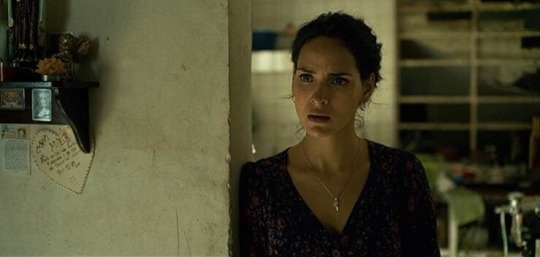
I liked Yovanna. She was earnest, determined, and entrenched in survival mode. Even for as little as we got of her and for how unfortunately stereotyped I thought her role was (just by nature of the given circumstances), I thought the actress was compelling and did what she could with what she was given. It would have been better for her character to have been involved with Lorea’s operation only because her brother was involved and when he screwed up something in his role, Yovanna volunteered to work for Lorea as a way to pay off her brother’s debt in the hopes of keeping him alive until they could both find a way out (which is where Santiago comes in). I don’t think we got a reason why she’s involved in the first place, and her brother again just seemed like a prop to complicate the MCs plans instead of an actual person.
This is a side note but she was hoofing it in that chase scene and I was impressed. She really sold the escape.
I honestly thought her and Pope’s dynamic was good because she’s doing what she can to escape with her and her brother’s lives, and it’s a good complication to have when Santiago needs her as a reliable informant so he can do his job AND keep people safe, while also asking her to take on additional risks the closer they get to eliminating Lorea. She knows this operation and wants out. Pope doesn’t know everything and wants in so they can all go home, with one violent drug lord finally gone for good.
What I especially loved was that there truly never seemed like a time that conveyed to us that they had slept together, but there was a chemistry that underlined the hint that, in a different time and under different circumstances, they might have taken an interest in each other. As it stands, Yovanna tentatively decides to trust Santiago, and we can see that Santiago truly does want to see her safety through to the end, regardless of his personal feelings.
Yovanna had guts and I was really relieved that she got to live. Action movies fall into the habit of killing the one woman to further the emotional toll on the men so I was happy to see her escape.
Now onto the tone of the movie, which will play into themes and character complexities.
One of the biggest failings of the movie was not addressing why they were desperate to begin with. Focusing a critical lens on how the military screws over folks once they’re discharged didn’t have to be lengthy or overt, you could have simply set it up around the same time Santiago talks to Will and never needed to mention it again. The US military has a history of coaxing people into service without giving the full terms of the deal and then not caring what happens to folks after they’re out of service, especially if they retire by choice
The movie starts off serious and grows even more serious as the characters’ morality takes a nosedive. It’s an action drama, that’s fine, but because we don’t get any solid moments of levity or humor, there’s nothing substantial to contrast the drama to. I keep coming back to The Losers, which is definitely a comedic action movie, but there are moments of sincere dramatic tension and stakes that show us the contrast and depth of realness the characters are put in. I’m fine with Triple Frontier being a drama, but if they had shown us glimmers of hope in each of these men, if we’d incorporated more than one side of their character into the entire movie, if we had seen moments where these men were good or at least had potential to be good, we as the audience would have felt more tension because the stakes would have been higher.
As is, it seems like these desperate men would have already been willing to take the measures they do when the plan starts to slip through their grasp; there’s no tension to the question “What are they willing to stoop to?” because they just go right ahead and do it, and then continue doing it, and since we don’t have much to go on in terms of their personal lives or ties with each of the other four men in the group, there’s no emotional pull to seeing their resolution.
The fix: Have a scene in the beginning where we introduce the characters in a lighter setting all together, but where they can’t out-and-out talk about the mission, or incorporate the family members into the scenes we see Tom talking to the men like the scene we get with Tess. Have a barbecue Friday afternoon/night or set the scene during Tess’s lacrosse game. Maybe Tom and Molly’s marriage is dangerously rocky but they’re not separated, get the families and guys together, show us what they have to lose. Keep Tom from being there just yet because he’s caught up at work so Santiago has to go to him the next day anyway. THEN we can get into how they’re still desperate for money, they’re all struggling in different ways, and give Santiago a bit more of a challenge in persuading them but show that they still might be inclined to agree to the recce because things aren’t as good as they seem just under the surface.
You can still follow it up by Santiago going to Tom at Will’s behest, and we can still really get into the meat of the logistical discussion the next day at fight night. I bring it up because we MAYBE get five lines each from Catfish and Benny in the movie before Benny gets presumably knocked out in the ring and then??? Jumpcut to South America??? Who are these guys? We know almost nothing about them, we don’t know how they factor into the group or what these five are like all together prior to extreme circumstances
Anything that follows should always be introducing the characters. We need to see the light starting to drain from their eyes as the story continues. I think the violence was used too liberally and at the point of the village sequence I honestly stopped being affected by it because the stakes stopped being real; there was no sense of restraint or balance in how they navigated each obstacle. Any obstacle with a human element could just be solved by shooting or threatening people, and as an audience member, it meant that any time they encountered a new problem, I was left asking myself why they didn’t shoot people because it had solved most of their problems so far. I don’t care if it’s a violent action movie, but the violence has to mean something or it just starts to be gratuitous and loses any effect.
I’ll address Tom’s death when we get to it, but it was also one of the biggest failings because 1. We already didn’t like him as a person or character 2. His death wasn’t a plot twist, it was the logical progression of events —> 3. Because of his own greed and wrong choices so —> 4. It didn’t strike me as a tragedy because of all of the aforementioned lack of character depth and interpersonal dynamics. If you’re going to kill off a main character it has to mean something. He didn’t sacrifice himself so there’s nothing to admire. Logically, he got what was coming to him. They gave us nothing to assume there would be any effect back home either. And in the end, I don’t get the impression the audience was surprised or affected by it, because it seems like everybody agrees that Tom is The Worst™. Death is not character growth. The compounded narrative issues left us asking the question “Was this movie supposed to be a tragedy?”
Now why am I writing this in the first place? Nobody from the movie itself will ever see this post, and it doesn’t change that a poorly written movie was produced, so why do I care?
I care because I want to see better stories written. I want to see better stories get the chance at having this kind of budget and opportunity. In short, I think we’re entitled to ask for better movies and we’re entitled to criticize bad ones, especially when they have such harmful overtones like Triple Frontier.
With this new setup in mind, I’ll move forward in 3-4 more posts with tweaked scenes, additional commentary and criticism, and speculations for what could have been.
#Triple Frontier#Santiago Garcia#Frankie Morales#Will Miller#Benny Miller#Tom Davis#movie critique#movie rewrite#my writing#I’m just going to post this lol#Triple frontier fanfiction#except it isn’t really at the moment lol#Pedro pascal#Oscar Isaac#Ben affleck#garrett hedlund#Charlie Hunnam#Adria arjona
44 notes
·
View notes
Note
Hi love the writing! Could you do something angsty around 26 or 35 with max??

Summary: You found out Max cheated on you
Warnings: angst, swearing
Word count: 2.5k
26. “Those things you said yesterday, did you mean them?”
35. “What will you do if we break up?”
'Max is looking at you' you read what your best friend Anthony, an engineer at Red Bull Racing, wrote.
And you worked at Red Bull Racing too, you decided with Max Verstappen, your boyfriend, that this is the best way for you to travel with him. You didn't have a complicated job. You dealt with filtering the negative ad on the team and then you gave it to Victoria to deal with the articles as she knew.
'Okay, let him look,' you write on the piece of paper that Anthony wrote quickly on.
You were at a meeting with all the Red Bull Racing employees, to your bad luck. Being in the same room with Max Verstappen was the last thing you wanted at the time.
Sure, your relationship was beautiful, or it had been anyway. He was whatever you wished from a man and more. He looked like a bad boy but he was the cutest and most thoughtful man you knew and he made you feel safe even when you couldn't see him.
His words still resonate in your mind and you had to make a supernatural effort not to cry.
You knew Max Verstappen loved you. He told you that every day and showed you through the gestures he made. He never gave you a reason to doubt him, and you didn't look for scandal either.
But every time you saw her, a lump appeared in your stomach. Without wanting to, you became careful around you, looking for her or Max. When you saw them talking, you looked for any excuse to go near them.
But your fear was unfounded, wasn't it? Max loved you, you were together for two years and you were fine.
But you also looked at her. She had also had a long-term relationship with Daniil Kvyat, a relationship of almost three years and they have a little girl together. There can be nothing between them.
Anthony has told you several times that Max and Kelly have been spending a lot of time together, at least lately, and you said you weren't worried. Why would you be?
But last night all your worries and fears came upon you at once. Anthony told you he saw Max leave the paddock with Kelly and didn't come back for about three hours. He didn't want to pay attention to this thing but when Anthony went to the driver to show him some sketches he noticed a small bruise on the backside of his neck.
"Really?" he tells you laughing. "How old are you to leave hickeys on your skin? Only teenagers still do that."
You felt all the color drained from your face. Hickey? You never left anything like that on his skin.
Anthony probably realized that what he said was not about you.
"Y/N... I'm so sorry..."
"It's ok," you say and smile at him even though you wanted to die at that moment. "I need a little bath, I'll be right back," you say and get up from the chair.
You started crying in the bathroom. You were disappointed, scared, disgusted, and shocked. To learn that someone you trusted unconditionally had been lying, cheating, and had developed an emotional bond with another woman behind your back was not registering in your brain.
Yes, you weren't a model, you didn't look like one, but Max always told you that you were perfect and that no other woman compares to you.
You literally could not wrap your head around what was happening...
You hoped that your darkest thoughts would never come true, but they did. Max and Kelly. Together. Behind your back.
It feels like every nerve in your body has either frozen or left your vessel completely. Your body literally enters a state of shock; adrenaline. You are absolutely stripped. Vulnerability. Disbelief. Disgust. Horror. Anger. Confusion. Shattering, crippling, traumatizing heartbreak.
Trust, honesty, and respect are necessary for a relationship, and Max just shattered all three at once. You have been the victim of an emotional crime. You ask yourself, how could this person fuck me over like this?
I trusted them.
I loved them.
I was loyal to them.
I kept my end of the fucking bargain.
How could you emotionally manipulate me?
What was I lacking?
Am I the problem?
Truly sickening, reality-twisting, mind-fucking stuff. You just couldn't believe that this was happening to you. Infidelity is something you hear about quite often, in books, movies, the media, or to other people, but not to you. This was somebody you loved with all of your heart, who told you he loved you, who had never shown the slightest inclination of dishonesty or moral transgression or disloyalty.
"Y/N, are you okay?" you heard Anthony behind the door, the fear and worry present in his voice.
"I'm fine," you say, though no one would have believed you. "I'll be there in a moment."
You splashed some water on your face, looked in the mirror, and bit your lip. You looked like hell. The eyes were red, the small veins that irrigated the eyeballs were broken, the face was red, in a combination between the violent crying crisis and the anger you had.
What were you going to do? Will you pretend you didn't know anything? Will you tell him you knew? Were you going to break up with him or were you going to wait for him to break up with you to be with Kelly?
You finally came out of the bathroom and Anthony was waiting for you at the door. He hugged you tight and assured you that everything would be fine. But he had no way of knowing that. It was nothing more than his simple hope that his best friend would not lose her fucking mind.
The phone starts ringing. Anthony lets you go and he goes to see who's calling you. He gives you a worried look. You immediately realized that it was Max who was calling you. Tears began to flow down your cheeks again and Anthony took your reaction as an invitation for him to answer the phone.
"Hey, man," he replies, and you don't hear what Max is saying. "No, she went for a coffee and left her phone on the table. Okay, I'll tell her. Okay, bye."
You approach him after he's finished the call to make sure you don't hear Max's voice.
"He said to go to his room."
"I don't want to see him."
"I realized that. Let's go, we'll deal with this problem later."
You went for a walk. The fresh air calmed you down a bit, but you had all kinds of thoughts in your mind.
How many times has this happened? Did you really want to know that? You really wanted to know how many times he kissed her and then he would come to you and tell you that he loves you.
If Anthony hadn't seen the hickey, how many more times did he planned to cheat on you?
Did he love her? That would have hurt you the most, knowing that you failed to give Max the love he needed and had to look for it in the arms and bed of another woman.
"Just know that I understand your feelings. I've been through this myself." Anthony breaks the silence and you look at him. "To be cheated on, it's a feeling of helplessness and zero self-worth. You feel as if you didn't do enough for that person which is why they reached out for someone else sexually or romantically. You blame it on yourself half the time. You dig for answers in your memories to try to figure out where you went wrong, where things started to go in a different direction. You hope that it won't happen again. You hope that the saying "once a cheater, always a cheater" it's just a myth. They broke your trust, how could you ever trust them again, right? You become paranoid when they go out at night or they don't answer your phone calls by the first ring. You find yourself having more down and depressed days than happy days. And a lot of questions will always replay in the back of your mind. Why? Why now? Why with them? How could this be happening to you? No matter how many times you get an answer, it won't be enough. Day after day, it'll get better but worse at the same time."
After two hours you returned to the paddock. You were immediately notified that Max was looking for you everywhere and he was worried he couldn't find you. Ironic, isn't it?
"Y/N!" you hear Max's voice.
"Do you want me to stay with you?" Anthony asks, standing in front of you to block your image of Max.
"No, it's okay. I'll handle it somehow..."
Anthony nods and leaves, staring angrily at Max.
"Hey, I was looking for you everywhere. Are you okay? Your eyes are a little red." he asks and if you didn't know better you'd think he cared.
"Let's go somewhere private."
You went to his room. You sat on his bed and thought about what you could say. You were thinking about what Anthony told you when you walked together.
Max hands you a dose of Red Bull and you take it, feeling your throat very dry.
"We need to talk," you tell him and you feel your eyes start to sting. It was not yet time to start crying.
"Okay? Is something wrong?"
"Is it true what Anthony told me?" you ask and you see that Max doesn't know what you mean; how would he know? "Is it true that you and Kelly spent some time together?"
His face went blank for a moment as he tried to understand.
"What you mean?"
You reach out your trembling hand to the collar of his polo shirt to lower it where Anthony told you it was the mark.
And Anthony was right. There was, in front of you, the hickey Kelly made on him.
Max didn't expect that. He looks at you with wide eyes and you hear his heart start beating harder. Sweat dripped down his forehead.
He looked away from you, numb. You discovered his secret. You didn't know if he was afraid of your reaction or sorry you found out his little secret.
"I didn't intend to hurt you," he says, and you realize he's telling the truth.
He had a guttural voice.
You smile at them. A broken smile that hid the primordial desire to cry and hit him with all your best.
"I don't care about your intentions. They're irrelevant. You didn't intend to hurt me? Well, you didn't intentionally try to keep me from harm either."
You don't know where you had the strength to look into his eyes and not cry. Max looks crushed. Because you found out? Because you're breaking up? Because he has to put an end to the affair with Kelly?
"How long was it actually going on before I found out?"
You see Max trying to think of an answer that doesn't affect you so much or destroy you at all.
"For less than a month," he answers.
One month? Where were you a month ago? In Spain. Did something happen there? Did you notice anything strange about him? To his behavior? No. You didn't notice anything.
Was he really that good at hiding his mistakes?
That, of course, if he considers the relationship with Kelly a mistake.
"Did you ever think of me when you were with her?"
He did not answer. You didn't even know if you wanted to know the answer to that. What would it be like to answer that he never thought of you and that his mind was soaked in serotonin that only Kelly could think of those moments?
"I never stopped loving you."
"I don't believe you loved me while you were cheating on me. Love and betrayal are incompatible. I don't feel safe with that kind of 'love.'"
"So? You're breaking up with me?" Max asks.
Although you still had so much to say, you no longer had the power. You were so mentally and physically exhausted that you just wanted to be alone and cry.
"There's nothing else to do, is there?" you say and leave his room.
Anthony was waiting for you. He noticed that you had no tears on your face and frowned.
"What happened? Did you guys make up?"
You hug Anthony hard and cry. At that moment you gave up being strong. You gave up pretending, even in front of you, that you were fine.
Fuck it, you weren't fine. You were far from fine.
You looked back at Christian Horner, who was presenting something on the video projector. You lost the whole meeting with the crew. You had no idea what was being said.
Honestly, you don't even care what they said. You only worked there because you were Max Verstappen's girlfriend. But for eighteen hours, this was no longer true. So what's stopping you from going to Christian and telling him you're resigning? What keeps you from going home and forgetting about Max, forgetting the last two years of your life and starting over?
"That's it for today, thank you very much, friends, and let's get back to work, yeah?"
Everyone gets up from their seats. Anthony draws your attention and beckons you to look at the garage door.
You could faint then and there. No one and nothing ever prepared you for the emotions you were experiencing then. Kelly Piquet was at the garage door, waiting for the meeting to end. She was staring at Max, but he was just looking at you.
"Can we talk a little?"
You nod to Anthony that you're fine and he can leave. You look at Max and you see that he doesn't look very good. He had dark circles and you're sure he didn't sleep last night either, just like you.
“Those things you said yesterday, did you mean them?” he asks, looking down at his shoes.
"Yes," you answer categorically, looking at his face, waiting for him to raise his head so you can look him in the eye.
“What will you do if we break up? You will leave here or-” you interrupt him.
"Not 'if I break up with you,' we've already gotten over it," you say and Max looks at you with wide eyes. "We already broke up last night. I'm still here because I haven't had a chance to talk to Christian yet to tell him I'm resigning."
"Are you leaving?"
"I have nothing to do here. I came to Red Bull Racing for you."
A tear runs down Max's cheek.
"What can I tell you to stay?"
"There's nothing left to say. Now go," you say and you feel a lump in your throat. "She's waiting for you."
Max turns to the garage door to see who you're talking about.
"I gave her a text message last night and told her it was all a mistake between us."
You smile at him. "Goodbye, Max," you say then you shout for Christian.
#max verstappen imagine#max verstappen oneshot#max verstappen#f1 fanfiction#f1 oneshot#f1 one shot#formula 1 oneshot#f1 fandom#f1 2021#f1#f1 x reader#f1 imagine#red bull racing#formula one oneshot#formula one imagine#forumula one#formula one#formula 1
321 notes
·
View notes
Note
So what do you think of Kaede and Kokichi's relationship? And if Kaede remained the protagonist how do you think it would change?
Considering it’s Kaede’s birthday today I think this is a really fun question to come back to!
Kaede is an absolutely amazing character, and I love how different her relationships with the rest of the cast feel from Saihara’s. She and Ouma have an especially interesting friendship in their FTEs together (one of Kaede’s FTEs with Ouma might be one of my favorite FTEs ever, really), so I don’t mind going a little more in-depth on my thoughts about their dynamic, as well as about how that dynamic and the story itself might’ve changed if Kaede had remained the protagonist!
Warning for spoilers as always, though I’m pretty sure most people know about the chapter 1 twist by now.
I think one of my absolute favorite things about Kaede is just how easy it is to get attached to her in such a short amount of time. She’s only around for the prologue and a single chapter, but despite that (or rather, because of the sheer length of the chapters in ndrv3, which tend to be much longer than dr1 or sdr2’s chapters), we still get to see so many different sides of her and just how complex of a character she really is. And I think that’s largely the reason for her continued popularity to this day: Kaede might not stay around for long, but we still really feel like we know her by the end of it.
And really, I think that’s pretty similar to how the actual characters feel about Kaede themselves. Despite how short her time is with all of them, she leaves such a powerful, lasting impression, even after her death. This is a pretty big change from previous DR games, where the chapter 1 culprits especially tend to suffer a pretty big lack of relevance or relationship to other characters in later chapters. Often times the victims are at least somewhat memorable (Maizono and the Impostor both at least come up a few times in their respective games), but characters like Leon or Teruteru just don’t feel like they have much of an impact on the other characters or the plot itself after their trials are finished.
This is totally different from Kaede, whose positive outlook and outgoing attitude already makes her fairly likable to most of the others, but who also openly invites the others to rely on her once she establishes herself as a leader figure fairly quickly in chapter 1. Most of the other characters latch onto her almost immediately, either because she seems so reliable and helpful (Saihara and Tenko in particular seem to like this about her), or because they can’t help but respect her and what she’s trying to do for the group (characters like Momota, who really values group cooperation, come to mind).
Personally, I think Ouma fell into the latter category. He and Kaede have something of a complicated relationship almost right from the get-go in chapter 1, but it’s still pretty clear that Ouma did respect Kaede a lot and recognized that she had the group’s best interests at heart, even if he didn’t always agree with her methods.
Likewise, I think Kaede was somewhat curious about Ouma and really wanted to get along with him, despite how difficult he could be. We see in Ouma’s introduction, both in the demo and the actual game, that Kaede clearly recognizes on some level that part of his annoying attitude is really just his way of teasing others, and that he doesn’t seem particularly malicious. More specifically, she describes him as “having a childish streak that makes him hard to hate,” which is a pretty spot-on description of Ouma in a nutshell. In short, she knew he was annoying and childish (on purpose, most of the time) but she definitely didn’t think of him as evil or cruel. This may in part also be because she didn’t live long enough to see him embrace the fake villain routine by the end of chapter 4, of course.
Ouma has a few teasing remarks throughout most of the game, but it’s not really until the death road of despair is discovered that he and Kaede butt heads for the very first time. This is because of a big, fundamental difference between their ideologies: while both of them very much have the group’s best interests at heart, they completely disagree when it comes to whether it’s worth it to cooperate as a team or not.
By the end of the game, Ouma is extremely paranoid, refusing to cooperate with absolutely anyone unless it’s out of some mixture of chance and necessity (such as working with Momota in chapter 5). He keeps all his cards close to the chest, and refuses to confide in or trust any of his remaining classmates, believing it’s fully possible any of them could be the ringleader.
But before the events of chapter 4, we see that he’s actually not opposed to the idea of selective cooperation. He strikes up a tentative collaboration with Miu early on, commissioning her to create some extremely useful inventions with the intent of using them to try and end the killing game. He also extends an invitation of cooperation to both Kaede (in one of her FTEs) and Saihara (in chapter 4, in the parlor of the VR world), though he goes about this in such a sly, underhanded, and off-putting way that both of them shoot his offer down flat. Even he’s not beyond the idea of teaming up with people he perceives as “useful” or “smart,” as long as it’s a much smaller, one-on-one effort rather than trusting or working with the entire group.
By contrast, Kaede is someone who believes that group unity is almost a necessity if they want to escape the killing game. This is very much in line with the role she establishes for herself as a leader. Unlike characters like Momota, who has always sort of longed to embrace a “hero” role, or Saihara, who is considerably more awkward and unwilling to be a leader because of how guilty he feels, Kaede’s role is much more about boosting and maintaining the group’s morale.
This is lampshaded several times by the classical music pieces that she references, often in an attempt to either clam the others down or fire them up at the idea of working together and escaping. It’s also a fantastic little clue that her own positive outlook is something a bit more crafted than it seems on the surface; she always tries to be optimistic about things and face her problems head-on, but that’s in large part because she tries to energize herself and present that reliable, dependable persona to the rest of the group. In short, she believes that if she reveals her own uncertainty or lack of faith in her plans, the rest of the group’s trust and morale will fall too.
Like I mentioned, this difference in their outlook is really what begins to cause problems for them once they discover the death road of despair in chapter 1. Kaede sees the tunnel as their one opportunity to escape without having to rely on the killing game itself; even if it’s extremely difficult and damn near impossible to get through it, the chance of injury is a risk she’s willing to take, no matter how many times they have to start over. But Ouma disagrees with this mindset and criticizes her in front of the entire group, pointing out how everyone else is already exhausted and even injured, and saying that she has no right to make that decision for the rest of them.
He even goes a step further and accuses her of strong-arming the rest of them by “denying them the right to give up in an impossible situation.” He claims that by positing herself as an inspirational figure, she has the “moral high-ground” no matter what the rest of them do or say, and clearly doesn’t think it’s possible for them to continue down the death road without someone getting seriously injured, or worse.
These harsh words really take Kaede aback, especially since most of the rest of the group seems to more or less agree with Ouma. She’s extremely hurt—not just by the fact that no one seems to really want to keep going with her plan, but also, I think, because she felt as if Ouma was right on some level. In my opinion, this is why she cries once she’s alone in her room later: because she did feel as though she’d forced everyone else to go along with an unreasonable plan. It’s the first time that we really see the cracks in her leader persona beginning to show, as well as the self-doubt that she carries.
I honestly think many people who dislike Ouma on their first playthrough of the game may have started here, right at this moment. Because so much of this seems to be fairly black-or-white initially—Kaede is presented as the unequivocally good heroine, trying to get everyone to work together and escape, and Ouma by contrast seems mean and unreasonable for arguing with her in front of everyone. We’re not supposed to linger on the fact that he makes several good points about everyone else’s safety and exhaustion because how he goes about it is off-putting and unlikable.
Not only that, but we as first-time players aren’t supposed to know about all the similarities that Ouma and Kaede actually have in common, despite their differences on the matter of group cooperation. We’re not supposed to know just yet that they both want to save the group, no matter what it takes, or that both of them are willing to go to extreme, sometimes morally grey measures in order to try and stop the killing game. We’re not supposed to know right away that Ouma can be every bit as self-sacrificing as Kaede, despite the selfish things that he says in front of the others, or that when push comes to shove, Kaede is willing to lie almost as much as he is.
We don’t know any of that, initially—which is why that scene hits so hard and sets Ouma up to be so unpleasant. But I think going back on a replay and evaluating it again is pretty interesting specifically because of all these similarities that I’ve listed. The fact that they clash here is especially interesting, given the sort of roles they embody to the rest of the group, with Kaede deliberately choosing to be someone that the entire group relies on and finds trustworthy, while Ouma later sets himself up to become a villain who’s hated by everyone. And despite this, their goals are largely one and the same: expose the ringleader and end the killing game.
I think it’s specifically because Kaede realized she couldn’t continue pushing everyone to do the things she wanted them to, no matter how badly she wanted everyone to cooperate and escape together, and that’s ultimately why she turns to Plan B when she hears from Saihara about the bookshelf hiding the ringleader’s lair in the library. And for all that she does want to trust and cooperate with everyone else, she actually goes about this plan in the most Ouma-like way possible: by doing everything herself and without telling anyone her real intentions, not even Saihara.
Something I especially like about Kaede as a character is just how nuanced she is. Because she is simultaneously the brave, trustworthy, outgoing protagonist that we see her as, but she’s also so, so much more than that. She’s fiercely determined and cares about everyone else, yes, but it’s also because she cares so much that she’s willing to do things like lie and attempt murder behind everyone else’s back.
If we look at the audition videos as any sort of clue as to what the characters might’ve been like before the start of the game, I do think there was a somewhat more skeptical, cynical side of Kaede deep down that didn’t quite trust other people—and that’s all the more reason she wanted to trust them and work together with all of them, because she knew exactly how hard it was to do so. It’s such an interesting contrast from Ouma, who could easily have used all his lies and charm to cooperate with people if he wanted to, but who instead continually pushes people away because of his skepticism, all the while pretending to act completely arrogant and self-assured in his plans. Deep down, I think both of them were much more vulnerable than they were ever willing to show in front of other people.
And I think by the end of chapter 1, Ouma became more or less aware of that side of Kaede, once she confesses everything she tried to do to end the killing game. Prior to this, I personally think Ouma still very much liked and respected her guts and her attempts at leading the group, but that he ultimately thought she was doomed by her reliance on trust and cooperation when they didn’t even know who the ringleader was within their group. But I think that after hearing just how far she was willing to go to stop the killing game, including but not limited to lying to everyone else and going behind their backs with her own plan, he couldn’t help but respect her even more. Despite his accusations that she was too soft or naïve for trusting everyone else, her actual attempted solution was far closer to his own outlook than he initially gave her credit for.
This is why, just before Kaede is about to be executed, Ouma drops all of his usual acts and facades with her and gives her a sincere goodbye, telling her that she “wasn’t boring.” And this is really the highest compliment someone like Ouma can give: she did take him by surprise and surpass all his expectations from her, and I do believe he was genuinely sad to see her go when she attempted such a huge sacrifice for everyone else’s sakes.
Truly, the only part of her plan that I think he disagreed with was the act of (attempted) murder in and of itself. He felt that despite her good intentions, she had “crossed a line” that shouldn’t be crossed, and that she fell into the ringleader’s trap the moment the idea of murder crossed her mind. Considering how much DICE’s “no murder” taboo guided Ouma throughout the game, it’s not surprising at all that this is where he disagreed with Kaede. Though ironically, he himself crosses the same line in chapter 4 when he decides the only possible solution to Miu’s attempt on his life is to kill her himself, and therefore winds up getting his hands dirty without ever directly committing murder, much like Kaede herself.
Questioning how they might’ve gotten along if Kaede had actually lived past chapter 1 and continued being the game’s protagonist is interesting, mainly because so many factors would change as a result. Kaede and Saihara are so fundamentally different as protagonists, and Kaede herself is much more in line with what we would expect from a Hope’s Peak protagonist instead. Kodaka himself has described her in an interview as being extremely similar to Asahina, and I personally think she’s something of a combination between Asahina’s outgoing attitude and Maizono’s carefully crafted façade (not to mention moral ambiguity). So it stands to reason that the game and its themes wouldn’t quite be the same if Kaede were still the protagonist.
On the one hand, I do think there would be interesting potential for a possible alliance between her and Ouma, especially given how similar they could both be. Ouma himself proposes such an alliance to her in one of his FTEs, though she does get angry and shoots him down, as I mentioned earlier. But it’s interesting to consider if Kaede might’ve been more willing to cooperate in smaller, one-on-one alliances if she had attempted her plan in chapter 1 and failed without getting executed for it.
There’s also the fact that Ouma claims to remember her and everyone else adamantly in his FTEs with her, even going so far as to claim that she and everyone else forgot about him, even though he never forgot about them. It’s unclear whether he’s referring to his memories from before the game still being intact (which is likely, since he’s pretty skeptical of the flashback lights right away), or if there’s some other explanation for it, but personally, I don’t think it can be dismissed as a complete lie. Even if Kaede herself accuses him of lying and making it all up, he goes uncharacteristically blank and claims that “even he’s not that good at lying.”
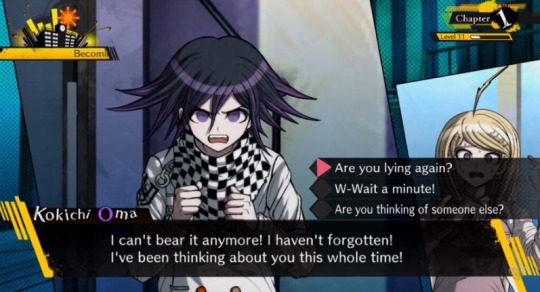
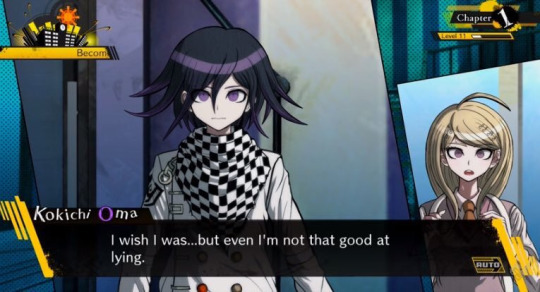
This adds huge potential to Kaede sticking around, as there could easily be an underlying mystery element. In addition to the trials themselves and the mystery of the outside world, it’d be very possible to explore their dynamic further, as well as why Ouma said the things he did and if he was actually telling the truth about knowing her and everyone else from before. Kaede is absolutely persistent enough that I feel like she would’ve pressed him for details about this, especially once it became clear in the main plot that their memories were unreliable.
On the other hand, it’s really unclear if Ouma would’ve still been willing to offer that alliance to Kaede once she had attempted to commit murder. Assuming the events of chapter 1 stay more or less the same and the only difference is that Kaede survives instead of getting executed, this raises some potential problems with Ouma actually working together with her or trusting her. She did, as he puts it, “cross the line”—even if her murder attempt wasn’t successful, Ouma claims that she was already too far gone the moment she even considered murder as a possible solution. This could definitely cause another clash of opinions between them, especially as Ouma is much too paranoid to work directly with anyone who he thinks might kill him.
Another potential source of conflict in my opinion is the Hope’s Peak flashback light in chapter 5. Unlike Saihara, who deals primarily with questions of “truth or lies” and is ultimately able to see through Tsumugi’s false ultimatum in chapter 6 with the choice of either the “hope ending” or “despair ending,” Kaede is, as I mentioned, much more in line with what you’d expect from a Hope’s Peak protagonist. She’s extremely smart of course, but she has a bit of a reckless, headstrong streak where she tends to act based on emotion rather than reason, and this could get her into quite a lot of trouble once Tsumugi started rewriting everyone’s memories in chapter 5.
Saihara was able to see that both of the choices Tsumugi presented in the final trial were bullshit and would ultimately keep the cycle of Danganronpa ongoing, but I’m not entirely sure if Kaede would realize the same thing, or even if she did eventually realize it, I’m not sure it would’ve been in time to stop it. Because of her self-sacrificing nature, I personally think she would’ve chosen to be one of the sacrifices for the sake of “hope,” much like Amami presumably did in season 52. This ultimately means that Kaede sticking around might have ultimately led to a “bad end” of sorts, where even if the rest of the group went free aside from her and one other sacrifice, Danganronpa itself never gets dismantled and lives to see another season.
The only possible way I see for Kaede to avoid falling into this trap and making this choice is if enough of her classmates rubbed off on her or helped her see things in less black-or-white terms like “hope” or “despair,” and in more nuanced shades of grey instead. But considering how completely fooled almost everyone was in the actual events of the game, it’s difficult to say if this would happen. She would definitely need to talk and debate with someone who viewed the flashback lights a lot more skeptically, whether it was Saihara or Ouma (or maybe even Angie), before she could reach the truth about what Tsumugi and Team Danganronpa were really after.
This analysis has gotten pretty long by this point, so I’ll just wrap things up by saying that I really do love Kaede and Ouma’s friendship, and I think they had more potential of getting along than either of them might’ve realized in canon. Despite their fundamental differences, both of them were two characters who went farther than almost anyone else in trying to stop the killing game, and both of them weren’t afraid of getting their hands dirty if necessary. I think the fact that Ouma claims to remember Kaede and everyone else from before the killing game is super interesting, and I would’ve absolutely loved to see it touched on more if Ouma had lived longer.
All in all, Kaede is such an amazing, morally grey character who really helps to establish what we can expect from the rest of the game, and I think that’s part of what makes her so memorable. Maybe one day we’ll get some sort of DR:IF equivalent where we get a semi-canon look into a scenario where everyone lives, and hopefully there we could see not only more of Kaede being a protagonist figure, but also more of her interactions with Ouma and everyone else.
#danganronpa#new danganronpa v3#ndrv3#kaede akamatsu#kokichi ouma#ndrv3 spoilers //#my meta#okay to reblog#lamekit
189 notes
·
View notes
Note
Hi :) Are you following the zheng shuang scandal? Would you say that her career is pretty much over now? The rate the news has been unfolding is so crazy to me. It’s only been 3-4 days. Was wondering if the gov would handle her matters personally.
Hello Anon! Yes, I’ve followed the news about the actress, primarily because it offers insight on how the current administration deals with stars exhibiting what it deems as “immoral” behaviour. As of today (2021/01/26), it’s difficult to imagine her career will survive at all. While she isn’t the first to be categorised as a “bad-history entertainer” (劣迹藝人), she’s the first to be explicitly banned by the National Radio and Television Administration (NRTA; 國家廣播電視總局), the department that controls—and censors—content of all radio, television, satellite, and Internet broadcasts in the country. Before, the NRTA didn’t publicise the names of the entertainers the government no longer wishes to see, which allows a possibility for reversal in a few year’s time if the “bad-history” wasn’t too damaging, and production companies are willing to take a risk and produce shows with the entertainers that may be difficult to pass the censorship board. But with such a high profile announcement, the government’s stance is unlikely to turn around in a foreseeable future.
Hmm. Let’s backpedal a little to get everyone on track. Before, I’ve shared some info re: the censoring of books, of audiovisual media. What if the government decides to “cancel” an entertainer instead? How does it do it? What are the standards?
The actress’s downfall is a (sad) example.
I shall skip names, the gossipy elements. Whether she made mistakes or not, no one deserves having their private matters exposed and sensationalised like this; no one should have to undergo such a humiliating, public trial. Essentially, the heart of the story goes as follows: the actress, a romantic-lead type who has been popular for several years, secretly got married. On 2021/01/18, her estranged husband claimed on Weibo that the couple had two children using US-based surrogate mothers, and the actress had abandoned the children in the US under his care. Meanwhile, his friend provided an audio from approximately the 7th month of the surrogate pregnancies, at which time the marriage was already falling apart. In the audio, the actress expressed dismay that abortion was no longer possible; her family talked about abandoning the newborns at the hospital or giving them up for adoption.
The next day (2021/01/19), the actress responded. She didn’t deny the existence of her surrogate children and claimed that she had been extorted. More importantly, she said the following:
“身為藝人我深知我國疫情的防控與重視。** 在中國國土之上我沒有違背國家的指示,在境外我也更是尊重一切的法律法規。”
“Being an artist, I deeply understand the attention my country (China) has placed on controlling the epidemic. On China’s soil, I didn’t do anything that violates the directives by the government. Outside the country, I’ve been even more respectful of all laws and regulations.”
This apparently hit a nerve of the administration. On the same day (2021/01/19), the Communist Party’s Central Political and Legal Affairs Commission (CPLAC; 中央政法委) — one of the most powerful commissions that oversees the entire legal enforcement system of the government — published an opinion piece , in which it said:
但[女星姓名]的回应,却通篇强调自己没有违法,丝毫没有任何悔过、道歉的意思。…
But the response of (name of the actress) insists that she didn’t violate any laws, doesn’t show a hint of remorse, regret…
要知道,在我国代孕行为是被明确禁止的。… 作为中国公民,因为代孕在中国被禁止,就钻法律空子就跑去美国,这绝不是遵纪守法。…
It should be known, that in our country, surrogacy is explicitly prohibited … as a PRC (People’s Republic of China) citizen, to use a legislative loophole and go to the US due to the ban of surrogacy in China is absolutely not obeying the law…
要知道,没有营养的炒作带不来长久流量。公众人物的魅力,来自其高尚的职业操守、良好的社会形象、文质兼美的优秀作品,而不是疯疯癫癫、任性胡闹、缺爱卖惨的“人设”。作为公众人物,几度疯狂游走在法律边缘,把这样错乱的世界观、价值观、人生观,置于众目睽睽之下,贻害世风,这绝不是无辜!
It should be known, that hype devoid of significance will not bring in traffic (click rates). The charisma of public figures comes from their noble professionalism, good social image, high quality works in character and content, and not from “personalities” rooting in craziness, petulance, mischief, the selling of one’s lack-of-love and misfortunes. As a public figure, to wildly roam at the edge of the law, to place such wrong and chaotic world views, values and life perspectives in the public eye, to cause harm to the morals of society — that is definitely not innocence!
Things to note here:
1) The CPLAC reacting within a day of the actress’s statement ~ unlikely enough time for teasing out / verifying the facts or truth of the matter.
2) The implication that Chinese citizens must follow Chinese laws, even when they’re overseas. (What about, for example, same-sex marriages?)
3) These words that, IMO, bordered on insult: “craziness, petulance, mischief, the selling of one’s lack-of-love and misfortunes”.
The actress’s career was hanging by a thread with this opinion piece. State-controlled agencies chimed in, many of which echoing CPLAC’s stance that surrogacy is explicitly prohibited in China. By night time of 2021/01/19, rumours abounded that multiple media companies had already listed the actress as a “bad-history entertainer” and would be shelving all her works and cancelling all her scheduled appearances. Prada terminated her endorsement.
The final drop of the hammer happened a day later, in the evening of 2021/01/20. The NRTA issued a statement that explicitly named the actress and contained the following lines:
代孕不是私事,与法不合,有违社会主义公德。…
Surrogacy isn’t a private matter. It doesn’t agree with the law, violates the civility of socialism…
从事广播电视和网络视听的演艺人员尤其是知名艺人,作为公众人物,有很大的社会影响力和示范作用,应当自觉践行行业自律准则,严格律己修身,严私德,讲大德,守公德。
Artists who work in TV and web audiovisual productions, especially famous entertainers, have significant social influence and demonstrative roles as public figures. They should be conscious about the self-discipline required for their industry, be strict in their behaviour and personal virtues, speak of great kindness and defend civility.
行业主管部门的相关政策要求是明确的,严格的。广大人民群众不愿意、不接受、也不允许丑闻劣迹者污染我们的社会公德和公序良俗。
Policies regarding the management of the industry is clear and strict. The public does not want, does not accept, does not allow those with scandals and poor history pollute the civility, the good order and customs of our society.
我们不会为丑闻劣迹者提供发声露脸的机会和平台,一如既往,坚决为广大人民群众提供健康向上荧屏声频。
We will not supply opportunities and platforms for those with scandals and poor history to sound their opinions, to show their faces. Just as before, we are determined to provide audiovisual content that is healthy above all.
And just like this, less than 72 hours after the estranged husband posted on his Weibo, the actress’s career is over. The NRTA, which has The Say on who and what get exposure time on screen, has spoken. The actress had no way of self-defence. Her 11 million followers on Weibo didn’t get to decide whether she’d stay or she’d go.
This is a brutal punishment but for what, exactly? Some netizens have whispered while the others shout their condemnations ~ but I thought…. surrogacy isn’t illegal?
And they’re correct: surrogacy isn’t explicitly outlawed in China, despite what CPLAC and other state agencies has claimed. In 2001, the Ministry of Health banned medical institutions and health care workers from "practicing any form of surrogate technology". However, no laws have ever passed that prohibit individuals from commissioning or providing surrogacy services—especially when the services are overseas.
The actress, therefore, wasn’t lying when she said she didn’t do anything that violates the directives by the government on China’s soil. Her “crime” of using surrogate mothers was, at worst, a legally grey area. For years, China has had a booming, semi-underground surrogacy market, their client base including older parents who wish to have another child after the country relaxed its birth limit (the so-called “one-child policy”) in 2015, infertile couples, and to a lesser extent, the LGBT+ community. Blued, China’s most popular gay social networking/dating app, has offered overseas surrogate services for several years that connect their clients with US-based surrogates. It pulled the services after the actress’s incident.
But all that doesn’t matter. People in China understands this: the law book is there, but those in power at the moment always have the final word ~ and that word doesn’t have to match the legal codes, or the previous final words of their predecessors. As for the moral outcry re: the actress having wished to abort / give up her unborn children, it’s worth mentioning abortion has long been used to to enforce the country’s decades-long birth limit policies, and forced, violent late-term abortions were not unheard of. Many people in China are also aware of that.
But again, it doesn’t matter.
I’ve described the government’s reactions in detail because they put in words the expectations it has of its entertainers. Entertainers in China are expected to not only obey the laws, but also have proper world views, (moral) values and life perspectives (collectively called 三觀, literally, “three views”) as defined by the government. The state has also made clear that such expectations grow with the fame of the entertainers.
Entertainers at the top of the c-ent industry, especially the idol types with many young fans, are therefore expected to get things right. These opinion pieces are reminders that the administration keeps a close eye on them, can “cancel” them with a few words if they fail.
The term for “canceling” an entertainer is 封殺 (literally, “seal and kill”).
The actress isn’t the first to be “cancelled” by the government. The first time the NRTA issued a directive regarding “poor-history entertainers” (劣迹藝人) was in 2014, which essentially called for shutting out any entertainer with a history of bad behaviours. It demanded all production companies, TV stations, online media companies and theatres to stop producing / broadcasting audiovisual content with these people, citing that TV and film media should be used for “spreading the progressive culture of socialism and promoting socialist core values” (”传播社会主义先进文化、弘扬社会主义核心价值观”). As these entertainers will no longer be exposed to an audience, these directives effectively kill the career of most who are affected.
What makes up the “poor-history” of “poor-history entertainers” then?
- The 2014 edition named drug use and prostitution (including hiring a prostitute) specifically.
- The 2018 edition, an announcement made by a top NRTA official, stated that audiovisual programmes should adhere to the “Four Never-Use” guidelines when inviting guests for their shows. Those guidelines were vague but for the last line: “In addition, the NRTA explicitly requests that programmes should not use entertainers with tattoos; (those associated with) hip-hop culture, sub-cultures (non-mainstream cultures), decadent cultures.” (”另外,总局明确要求节目中纹身艺人、嘻哈文化、亚文化(非主流文化)、丧文化(颓废文化)不用。”)
Some may be asking: wait … hip-hop?
Yes.
It was believed that hip-hop artists were targeted due to a scandal at the time, in which (another) well-known actress had an extra-marital affair with a rapper. Analysis of the rapper’s lyrics found sexism and suggestions of drug use (the rapper later apologised and claimed his “core values” had been distorted due to influence from “black music”.)
As this guideline hasn’t been retracted under any formal capacity, it can still be used to axe any show, shut out any entertainer.
If you’re wondering about SDOC, for example, this again illustrates the need for some … mind-reading skills to navigate life in China. A good way to achieve that without superpowers is to have the right connections to higher-ups, who can offer hints on what can get away at the moment and what cannot (this is true not only for c-ent, but for most business practices in the country; building 關係 guanxi— literally, “relationship”— is a must for those who wants a piece of the Chinese market).
- In 2020, NRTA expanded the “no exposure” rule to live-stream shows on the internet as well as on- and offline charity events, where previously “cancelled” artists had started to find jobs in to make a living. While that notice didn’t further elaborate on what makes “bad history”, the accompanying article in People’s Daily (The State-controlled Newspaper) went into more details. In addition to drug use and prostitution specified in 2014, the article named tax evasion; lying about education levels; *suspected* (涉嫌) extramarital affairs, domestic violence and inappropriate speech.
It’s worth emphasising that many of these activities are not illegal. “Suspected” also means these activities do not have to have happened ~ it’s the impression that they’ve happened that counts. Hence, back to the actress who had surrogate children, not only did it not matter whether surrogacy is actually illegal, it didn’t matter whether the leaked audio was real or taken out of context, or that the babies didn’t end up being aborted / adopted. The article once again stresses that private matters are no longer private for entertainers who are in the public eye as social influencers, and these directives on “poor-history entertainers” — colloquially called “封殺令”, with 封殺 meaning the “seal-and-kill” and 令 meaning command (as in Chen Qing Ling 陳情令) — are there to set the standards, the bottom-line for c-ent. It did call for more specifics in future directives: more guidance on what makes “bad history”, the ways these entertainers can redeem themselves. As of today, however, such specifics have not been provided. As a result, to avoid crossing the NRTA, the media has ended up “overachieving” in certain cases, wiping out the screen time of entertainers who only have a remote chance of being viewed as having “bad history” to play it safe. Last October, for example, a young singer was briefly edited out of all his recorded shows because his parents (not him) was revealed to be deadbeats owing millions in debt.
And so, without a known way out yet, “bad-history” entertainers such as the actress will likely remain “sealed and killed” for a long time. Entertainers recently caught with extramarital affairs ~ a relatively minor “offence” ~ have been missing on screen for 2-3 years, and the heavy-handed treatment by the government this time is likely to put a pause on any companies considering using these people again. Even if they’re finally allowed some degree of comeback, their career prime will be over and and their NRTA “sentence” will likely follow them everywhere they go, which makes their getting face time in any high-profile (high-investment) projects unlikely. Those who must work to make their ends meet will probably end up like so many entertainers who never made it big, or are at the very tail end of their career ~ drifting from city to city singing in local clubs, getting paid poorly and harassed by rude customers...
===
** A side note: In case anyone wonders why she brought up COVID, it’s a similar idea as Gg apologising for “佔用了一些社會公共資源” “occupying social resources” in his first team post after 227 (2020/03/01). For an authoritarian regime that has placed the most attention on maintaining social stability (ie. quelling dissent), disrupting the government’s narrative re: current events and potentially reversing the overall tone the administration is trying to reach in public discourse can be a greater offence than any actual “wrongdoing”. 227, as an incident, was guilty of that.
(And I’m bringing this up because I find this relevant to the safety asks I have in my inbox. Arguments among fans do not themselves render Gg and Dd unsafe, but can become a significant issue if they “occupy social resources”, disrupt the government’s narratives and/or its political machinery in some ways. IMO, 227 took a dangerous turn not because the fans were arguing over a piece of fanfic, but because a group of fans took over the reporting machinery intended to rat out dissidents. It was a mistake that I hope no fans ~ regardless of who they support ~ will repeat again.)
142 notes
·
View notes
Text
The Rebel/叛逆者: A Review of Sorts
After being only semi-invested in the Rebel, I ended up getting so into it in the final weeks of its release, I’ve shelled out on IQIYI premium just to get the final couple of episodes a few days earlier.
That’s right kids, it’s a Review of Sorts. Unfortunately, I could not find a translation of the novella the drama is based on, so will be looking at it as a separate entity.
Most of this post is spoiler-free, however I have dedicated a few paragraphs at the end of it to discussing the final episode, as there are a few specific things about it I wanted to mention. There is a clear spoiler warning before that part.
If you don’t want to risk it, TL;DR version of this review goes something like this: Rebel is very decent, and positively one of the best things that I have seen to come out of China since I’ve jumped into that particular rabbit hole. It’s pretty well written, it’s very beautifully dressed and shot, and the cast is killing it. I thought it dropped the ball a little in post production, and I did not always love the pacing. Other than that, it’s incredibly decent, and well worth watching, unless communist propaganda really irks you, in which case stay very well away.
I have been having many conversations with @supernovasimplicity all the way through watching this drama, so there are likely to be some thoughts here that are influenced by those.
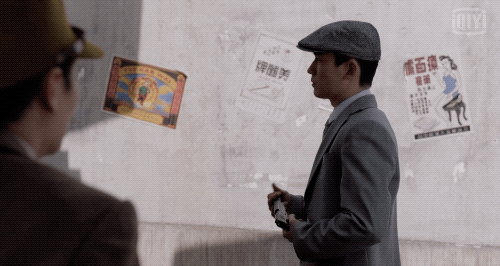
The story centers around Lin Nansheng, a struggling servicemen in the Guomingdang party. He has a great analytical mind, and absolutely no emotional capacity for his job. He has trouble handling violence, he is impulsive, he cannot speak to his superiors without bursting into tears, and has nothing even remotely resembling a poker face. And that is what makes this drama as enjoyable as it is.
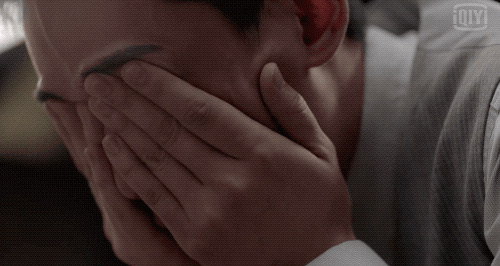
I don’t think Lin Nansheng’s journey would have been nearly as exciting had he started it from a place of competence. He botches up everything he touches because his big brain switches off the moment his emotions kick in. And so, when you see him grow in confidence, learn to control himself, learn to fake his smiles and compliments, you can’t help but feel a strange sense of pride. It also makes Lin Nansheng very likeable as a character for reasons other than Zhu Yilong’s ability to look like a bush baby.
It did take me a while to feel fully engaged with his performance - not because there is anything lacking in it, but just because it’s hard to be truly surprised by his choices after the exposure I have given myself to his work. That said, at about a half-way point I got charmed by him anyway, and there were quite a few scenes that were truly mesmerising. There were scenes where he broke out of the familiar mould of big unguarded eyes and fluttering wet eyelashes, and tried something that was not pretty: every time to a great success. I am hoping to see more of that in his future work.
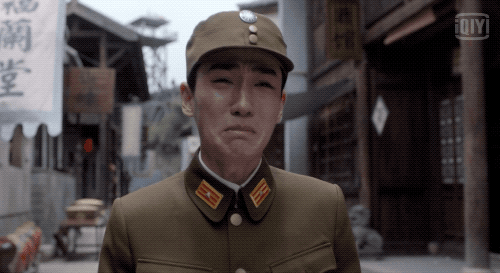
I really wanted to like the female lead, Zhu Yizhen, but unfortunately both the way she was written and the way she was performed by Tong Yao left me somewhat cold. It did not help of course that the screenplay ended up sidelining her at every turn, leaving her with very little personal agency. She was set up so interestingly, but in the end her sole purpose became being someone for Lin Nansheng to pine over. It is particularly curious from a perspective of meta storytelling: seeing how this is all centered around superiority of communism, which as a whole was, arguably, ahead of its time in the matters of binary gender equality.
The ensemble cast of the drama is stunning. Wang Yang came very close to stealing the show at several points as Chen Moqun, somehow managing to make his rather unlikeable character interesting. I can say the same thing about Zhu Zhu who absolutely shined as Lin Xinjie, showing an incredible range and imagination in her performance.
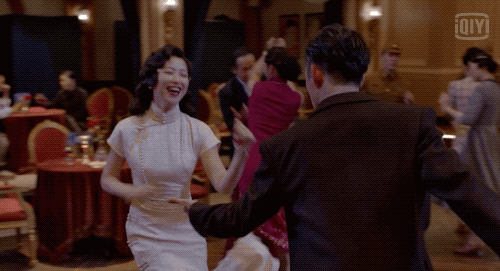
The overarching story of the show is engaging, with some incredibly suspenseful elements; every narrative arc including a nice progression through it. As spy thrillers go, it was fairly well plotted. You could if you go looking for a few things that did not pay off in a satisfying way (notably, the Chekhov’s cyanide capsule), but you overall the story really was well told for the most of it.
I did, however, feel like the pacing started to fall apart in the last quarter of the drama. Last episode in particular really did feel rushed, not just due to its pace, but also in a way it failed to pay off the final mission in any visible way. There will be more on that in the spoiler section of this post.
Important to note that The Rebel is a show made in Communist China in the year 2021. It does not ideologically side-step from the path that was laid out for it by that fact. Which is to say, it is, undeniably, filled with propaganda. Communists are the good guys, and if you think a good guy (or gal) is not a communist, they probably secretly are. With one exception of a friendly character who is not a communist, and whose fate we actually never find out. Curious, that.
The Rebel is not a kind of a show where censorship-appeasing scenes are shoehorned in. It’s a kind of a show in which the main theme is Sacrifice For the Party.
Aside from the being the moral vector of the show, Mao’s gentle teachings explicitly help get Ling Nansheng out of prolonged depression following his injury, and almost annoyingly, this sat incredibly well with the character, as he was written. Lin Nansheng is conceived as this naive idealist who wants to be on the front line, who needs validation and support of others. His - and I can’t believe I’m saying this - his being disillusioned in his beliefs and choosing to join a party which includes people whom he likes and trusts makes sense. Him finding this one thing that gives him hope and letting it propel him into gaining confidence and competence makes sense.
In many ways, the Rebel is a story of Lin Nansheng’s failure to become an antagonist within the world of the drama.
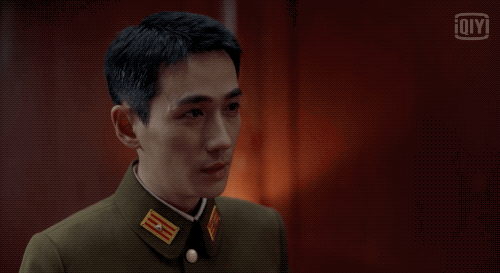
I have honestly spent this past couple of weeks pondering whether being well written makes political propaganda better or worse, whether the subtlety of it makes it more or less palatable, whether it’s enough, as a viewer, to be aware of it to shrug it off. Ultimately, this is not something I could or should make moral judgements on, but I do believe that it’s possible to acknowledge the fact that propaganda exists in the drama, and still appreciate it for a good piece of television that it is.
That said, I am very well aware that me being kind of okay with it stems entirely from my own removal from the culture this is made in, and I am, perhaps, lucky to even have a choice as to whether I want to engage with a product which is, undoubtably, here to dress political ideology in fancy clothes.
I have, on the other hand, also seen many things in Russian media of the “Annexation of Crimea is Good Actually” variety and those make me feel very unwell, so feeling somewhat at ease with blatant political propaganda in Chinese media makes me the biggest hypocrite.
But, I digress.
Before we go into some specific plot-related things, I would like to mention that the Rebel has this weird dichotomy in which the production is sublime, and the post-production… not so much. The show very well shot. Every element of it sits perfectly together, not a single prop out of place, not a single extra underdressed, not a page of script not put to good use. It’s lit to perfection. It’s scored beautifully. So much of this show is just stunning.
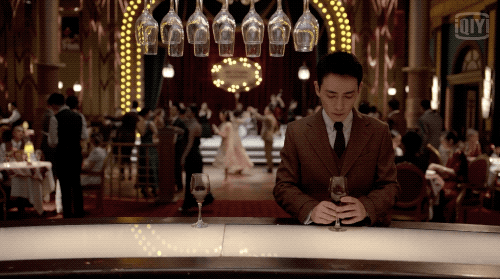
And then… there is post-production.
This is not even about bad CGI (and the CGI is, indeed, bad), it’s just that most of post-production as a whole feels rushed.
Starting with surprisingly imperfect editing, which at times just fails to make the scene flow together. The final line of dialogue would be spoken within a scene, and it would fade to black instantly without a single breath to indicate a full stop. A montage sequence would be created, but every shot within it condensed to a second, making it feel incredibly fast-paced when the effect should be the opposite. There would be a cut away from a speaking character and to the same speaking character from a slightly different angle, making it dynamic without any reason to do so. There are a couple of truly startling jump-cuts.
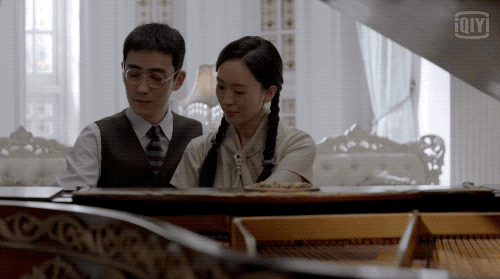
I did not speed this gif up. This is part of a romantic montage, edited like it’s a goddamn action sequence.
And of course dear old friend slowing down footage shot at 24FPS. Please don’t do this. You think no one notices - but we do.
There are other tell-tale signs of production rushing to the finish line: occasional, but very noticeable ADR glitches, very sloppy job done at sound mixing, which contribute to parts of the show feeling ever so slightly off.
It’s not unforgivable, but it does make me wish the same amount of care and efforts that went into shooting this drama would also go into it after it was all in the can.
Oh, and just because if you know me you know I have a professional fixation on fights, and I am happy to say most action scenes are toe-curlingly delightful. Hot damn those fights are good. I am absolutely in love with the shot below, for example. Placing an actor behind a piece of set so he can exchange places with the stunt double during a one shot is such an old trick, but the execution, timing and camerawork are just... flawless. This is what perfection looks like.
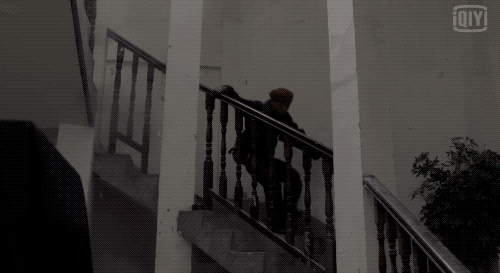
Now we got all that out of the way...
SPOILERS FOR THE SERIES FINALE BELOW
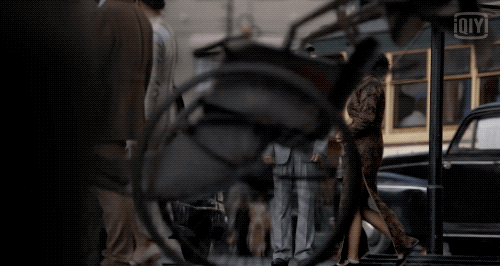
Here’s the thing. I wanted to love the ending and I found that I could not.
The final mission was presented as important, and honestly the scene in which Zhu Yizhen is sending the vital message out as Lin Nansheng holds his ground in hand to hand fight is incredibly dynamic. Party, this is due to the fight itself being incredibly well choreographed, yes, but it’s also where it sits within the narrative, how high the stakes are for everything surrounding it.
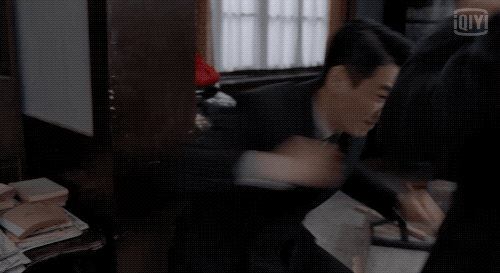
But then, the tension all but bleeds out. The Important Message is sent, the fight is won, and we are treated to ten minutes of a very slow car chase, problem of which is not even its speed as much as its placing within the story. As in, by this point both of those operatives have lost their cover, and completed their Very Important Mission. It would be very sad if they died, but their survival does not technically contribute to their cause. Moreover, Zhu Yizhen getting mortally injured in order to protect Lin Nansheng as part of her mission read a little empty when the mission is technically over.
While I personally found Lin Nansheng slow recuperation and his low key ending enjoyable, I think I would have preferred to have seen a more tangible pay-off to all the sacrifices made in the name of “bright communist future”, just a little more justification for every moment of death and despair we witnessed. I would have certainly at the very least preferred to see Wang Shi’an’s death on screen. Considering how many likeable characters martyred themselves on screen, denying us the death of the one antagonist just seemed cruel.
I really did love the ambiguity of the final few scenes however, if we consider the children choir at the end a fantasy. The idea that Lin Nansheng will live out his life in this hope that Zhu Yizhen is still alive, imagining her just outside of his field of vision, his only joy being in this fantasy of her… now, that is incredibly strong. I equally like the idea of rest being promised to him at the end of his journey, and said rest being painful, and slow and unwelcome.
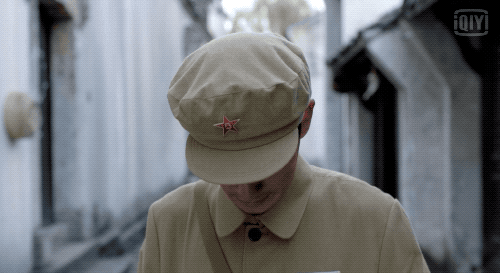
But it felt like as they chose not to to lean into the “sweet” part of the bitter-sweet tone of the ending and we’re unable not commit to the “bitter” part either, so it lands with a splat which is somewhat lacklustre.
---
This concludes my thoughts on the Rebel.
I am more or less out of Zhu Yilong’s filmography to watch, which is probably a good thing at this point. I have just emerged out of several back to back work projects - literally today - and will hopefully once more have time for things I grew to enjoy doing during the lockdown.
Those things, if you have not guessed, include watching Chinese television and writing things about Chinese television.
45 notes
·
View notes
Text
My BnHA AU List
Sorry for the length. Fics that are currently available to read have links. To those of you mentioned in this post, I wanted to make sure people knew where the ideas originally came from. (And you’re all awesome anyway!)
Can't See The Forest For The Trees - Genderbent Midoriya Izuku who became a vigilante known as the Forest in Musutafu. Has been operating for five years dealing mostly with information gathering and dispersal and some smaller situations that crop up on the streets. Todoroki Shouto is on patrol in the area and takes an interest in the unknown vigilante after she helps out with a situation where he got in over his head. AO3
A Piece of Patchwork (Improperly Placed) - AU where Izuku and Aizawa swap places in canon. Izuku fights the hero system to become the first quirkless hero, graduating alongside Present Mic. He gets called in to help in a situation where the villain has the ability to steal quirks, five years before the start of canon, providing part of the back-up team for All Might. Part 1 is the battle against All for One, part 2 is an alternate ending to the fight. Part 3 is Izuku learning to use One for All, which was forcefully given to him by All Might at the end of the battle. Part 4 is the other half of the role swap, where Aizawa grows up alongside Bakugou and is trying to get into UA. AO3
The Fallacy of Greatness (AKA Tenth, in my files) - AU where the whole first year class of UA in canon is born 4 years later than in canon. All Might encounters a 10 year old Izuku who asks if he can be a hero. Even after rescuing Bakugou and proving his heroic spirit, All Might elects not to give One for All to a child as young as Izuku. Izuku, desperate for someone to believe in his dreams, realizes that he has to be his first believer and decides to take matters into his own hands and prepare for a future in heroism on his own. AO3
The Capture Scarf Caper - Based on an idea from @terrible-my-hero-academia-aus Izuku finds Aizawa's capture scarf discarded in an alley and takes it home. He figures out how to use it and becomes so proficient that it accidentally gets mistaken for a quirk. Deciding to capitalize on the strange bias he's come up against, he uses the capture scarf to get into Class 1-A. Unfortunately, this means his teacher is the original owner of his scarf. Suddenly his deception is a lot more desperate and precarious. Meanwhile, Aizawa is trying to figure out why his instincts are telling him to pay such close attention to this anxious kid. AO3
The Better Part of Valor - Suspected Traitor Izuku AU a la @gentrychild. After Aizawa discovers one of Izuku's hero analysis notebooks, he drags Izuku to an interrogation room trying to get him to confess to being the traitor in UA. Izuku comes to realize that several of his classmates were also made aware of this theory and have been feeding information on his movements to their teacher for a while. Betrayed, he starts to pull away from class, falling back into some of the same habits from middle school to go unnoticed and fall off of people's awareness. At some point, his classmates realize that he's no longer staying in the dorms, they only ever see him in class, and All Might is the only person he will voluntarily interact with.
Civil Disobedience - All Might doesn't track Izuku down after the slime incident, but Bakugou's parting words cut far deeper after the day he's had. Realizing that everyone talks about how great of a hero Bakugou will be, Izuku comes to the conclusion that he wants to be the exact opposite of what Bakugou is. He elects to become a villain who goes after and exposes corrupt heroes. Adopting the username Wasureta for his villain work, he collects information on heroes who aren't performing their job as they should and releases it to the court of public opinion, taking away the support that has kept them from being exposed before this. As he digs deeper into the cesspool of rotten heroes, he manages to collect enough information to rake Endeavor over the coals and ends up with an interesting new follower. Dabi, meanwhile, is shocked by the ruthless but polite teenager he found when he tried to find Wasureta and he's not sure if he's impressed by what the kid has accomplished on his own, or horrified by the scope of what he controls.
Hunting Prometheus - There is another quirkless student attending Aldera Middle School, but she wasn't born that way unlike Izuku. When she was seven, her quirk was stolen from her by a man with a smooth voice and a forgettable face and she's been existing in a state of carefully cultivated rage since that day. Before, she never even considered becoming a hero. Now her only goal is to become a hero so she can find that man and punch him in the face. (OC fic, obviously)
Lost Stars in an Indifferent Universe - Leverage AU, five parts, origin for each member of the team. Izuku is told to be realistic and he tries to be following his disastrous encounter with All Might. But realistic means that he has already exceeded the life expectancy of quirkless individuals, acknowledging the fact that no amount of studying or work will let him join a remotely helpful career, and he is stuck living with his mother while he wastes away as a janitor at a nearby middle school following the completion of his high school education. When he returns to a tall building he hadn't managed to convince himself to jump off of yet, he finds that the abandoned space has been taken over by a black market of sorts and gets folded into a world of grey morals and an underground economy based on merit instead of quirk. When he becomes aware of an illegal quirk experimentation operation and tries to blow the whistle, several attempts are made on his life in order to shut him up. Instead of disappearing, he gets angry and decides to collect a team to strike back and prove the shady shit the lab is up to. (Izuku=Mastermind, Shinsou=Grifter, Hatsume=Hacker, Shoji=Hitter, Eri=Thief)
Love and Other Things Not Bound By the Laws of Time - Mr. Peabody and Sherman AU. Nezu adopts a young Midoriya Izuku whose mother died shortly after he was diagnosed as quirkless. Determined to show his new son that one's quirk or lack thereof means nothing in the grand scheme of things, UA's principal develops the WABAC machine to travel through time and prove just how capable people were before quirks manifested. He indulges Izuku's passion and curiosity, encouraging him to look into as much or as little as he wants on any subject. It becomes clear that, while not supernaturally intelligent, Izuku is a genius whose ability to make connections and strategize is by far his greatest asset, especially as he still holds onto the goal of becoming a hero.
The Quiet Revolution (collab w/ my sister) - The Todoroki siblings need therapy. Instead of getting that therapy, they decide to meet up for dinner every Saturday night, begin a tradition where they burn their father in effigy each week, accidentally start a highly successful Minecraft YouTube channel, and generally cause the downfall of the existing hero system through the power of networking.
You Can Tell What I Am By The Lines In My Skin - BnHA/Naruto AU. Naruto dies in his own universe and is reborn into the My Hero Academia Universe as Midoriya Izuku. He remembers who he was, but his chakra, which followed him into this life, is always out of reach. He trains as best he can to keep up his regular ninja skills but can't break through the barrier separating him from his chakra. He still meets and trains under All Might. When he receives One for All, however, the sensation that fills him is entirely familiar. It breaks through the barrier as though it isn't even there, and settles inside like it's always been there. Honestly, he had been missing the angry furball anyway, so he was glad Kurama managed to follow him to this world. With access to his chakra again, the world is about to discover just how effective one shinobi can be in a world of heroes.
War Games - (Inspired by RogueDruid's Hero Class Civil Warfare and others similarly inspired by it.) A year-wide hero class exercise is announced. Bakugou is announced as the Hero leader while the villain leader's identity is kept secret. Izuku knows it's him before the letter appears in his room. The students are allowed to pick whichever side they want, but most choose the hero side, which has won the exercise every time it has been run. This year is no different. Todoroki realizes that Izuku is the villain leader and signs up with him. Izuku goes and recruits Momo and Monoma to his side. Then, after consulting the rules, he folds in Shinsou and Hatsume as well. Monoma plays decoy villain leader and attempts to collect a few more people, but they've already signed up for the hero side. Izuku, without explicitly saying that he's signed up with the hero team, gets folded into the hero strategy sessions since no one expected him to make a different choice. He proceeds to get "taken out" in the first villain assault, and most people don't realize what's happening until it's far too late.
Life's A Game (And I'm Player One) - AU in which Izuku realizes that he does have a quirk but can't tell anyone about it because a) he can't prove it and b) it could be dangerous if he talks about what he can see. His quirk, which he privately calls Stat Check, freezes time just for him in order to open up what looks like a video game character bio that explains a person's quirk, as well as containing vital statistics. It only works in person or on unaltered photographs with a person's face or a distinctive enough feature to identify them. As he gets older, more tabs are added to the bio, and he starts to notice signs above certain people's heads telling him what level he needs to be to fight them (he stops seeing these after receiving OfA, until he sees AfO in Kamino Ward). In pictures, only the first tab is available unless he took the picture while time was frozen, in which case all the tabs are accessible. Because of this, he has accordion folders filled with photographs of people instead of analysis notebooks.
Of Unpainted Fences and Raw Ingredients - Smart Izuku AU. He has been writing essays about hero society, morality, and several other issues since before UA, but he doesn't realize how much people are paying attention to them until the essays start becoming required reading for certain classes. Meanwhile, the teachers are desperate to get in contact with him, not expecting that the essayist they have been gushing over is sitting near the back of the class, trying not to blush.
In A Mirror Darkly - Aizawa is out on patrol with Shinsou and Midoriya when they are attacked and the boys are apparently obliterated by an enemy quirk. The rest of the class attempts to help Aizawa, but he blames himself for their deaths. It doesn't help that he keeps seeing flashes of them in the mirror out of the corner of his eye and could swear he heard one or both of their voices in the middle of the night. Meanwhile, Shinsou and Midoriya are stuck out of sync with the rest of the universe and can't communicate with anyone except Aizawa, and only through mirrors. Izuku figured out that they have maybe two weeks before they waste away since they can't interact with anything being stuck in this in-between space. The only way they can get out is for Aizawa, who was there when they de-synced, to touch them and bring them back in sync with the rest of the world.
Guerilla Tactics - Vigilante Class 1-A AU. After the slime villain debacle, Izuku runs away from Bakugou and the heroes. He literally runs into Todoroki Shouto and they commiserate about how the heroes have failed them. Realizing a bit late exactly who Shouto's father is and why he's trying to run away, Izuku offers to come up with a plan to help him get away cleanly. (This is sort of the worst timeline, where most of the good teachers aren't employed at UA, Nezu is not the principal, and the HPSC is in charge of almost everything.) The plan they come up with involves Shouto failing the recommended exam, then disappearing the day results arrive home. Izuku, meanwhile, attends the regular exam and sees how the whole points system benefits those with flashier quirks and easily aimed egos. He gets to talking with a lot of hero hopefuls and sort of steals them out from under UA when their applications are rejected. They move into an abandoned sector of outer Tokyo and start working as vigilantes. Dadzawa makes an appearance, as if summoned by the horde of teenagers with no form of parental guidance to speak of.
No Rest for the Wicked (Or The Damned) - Person Of Interest AU. Instead of apologizing to Izuku when he asked if he could still be a hero without a quirk, Inko points out the other ways he can be a hero, by building the things they would need to fight crime. Figuring that one of the main problems with villains is that no one knows when they're going to attack, Izuku creates an intelligent program that can assess a high volume of data and extrapolate when and where a villain attack will take place, and who the villain will be. When his mom is killed and he's badly injured in an attack his AI predicted, Izuku realizes that no one is taking his information seriously because he's quirkless. He decides to take matters into his own hands and reaches out to an unlikely helper. Dabi doesn't know why this kid decided he was the best option to stop a lot of the more violent crime he somehow knows is going to happen, but he promised and then delivered Endeavor's fall from grace, so he's willing to see where this goes.
Binary Stars - Slight Megamind AU. Before their respective planets were destroyed, Izuku and Bakugou were placed in small space pods and sent towards Earth. Bakugou's people were warriors who looked enough like humans that they intermarried (unbeknownst to humans), thus bringing about the first quirks. Izuku's people, however, are survivors. Their planet was populated by predators so their greatest asset was their ability to camouflage themselves. As Bakugou's people often hunted Izuku's people, they gained a sort of sixth sense for them, which is why Izuku's very presence pisses Bakugou off. (All for One is from Bakugou's planet. He was exiled for stealing power. The last power he stole was what he gave his brother, and the brother always resented him for getting them both sent away.) Izuku still receives OfA, and is the first of his species to have a quirk/power like that.
The Wings of Icarus - Spy AU. Todoroki Shouto works for Yuuei, an espionage agency run by his father. He's been training practically since birth, no thanks to his father, and is second in the spy business only to a person known as Icarus. When something goes wrong on a mission, he is rescued by a short man with freckles and deep green eyes shortly before he passes out. He is found at one of the entrances to Yuuei with a note from Icarus to the tune of "I think you lost this", making Shouto the only person to have actually seen Icarus. Meanwhile, Nezu is running a small but successful info brokerage out of a bakery with three kids he picked up off the streets years before: Izuku, Shinsou, and Hatsume. Codenames: Icarus, Psyche, and Daedalus, respectively. Nezu is known as Zeus.
Dark is the Night (Momo is Batman: version 1) - Based on an idea from @terrible-my-hero-academia-aus . Momo loses her parents in a villain attack when she's eight. She throws herself into her studies in earnest, determined to be a hero. In the meantime, however, she has a hard time ignoring all of the hardship she sees on the streets, all of the crimes that go unanswered. However, to duck the vigilantism laws and disguise her identity, she wears a suit that covers every part of her body (think Cassandra Cain as Batgirl) because no one would assume that someone with a creation quirk that needed exposed skin to function was under it. She produces everything she needs at home. Aizawa notices that there's someone off about Yaomomo, something fake. It isn't until he runs into her on patrol that he figures something out.
Used to the Darkness (Momo is Batman: version 2) - Based on an idea from @terrible-my-hero-academia-aus . Bruce Wayne was reincarnated as Yaoyorozu Momo. She remembers everything about her previous life, but she has adapt all of the fighting training she knows to her new female body. The intelligence and detective skills are useful in this new world, especially since a good portion of logic and deduction has fallen by the wayside for the majority of those in law enforcement. The quirk is something else to get used to, but it's highly effective at producing materials of various things needed for vigilantism. She's interested to see how far she can take the limits of the superpower this universe had given her. At the very least, she's more than capable of recreating the gear she had. Even though her parents haven't died in this universe, she still ends up going out at night and trying to help in whatever way she can. Upon meeting and befriending Todoroki Shouto, she realizes the good she can be in this universe. She attacked the corruption in Gotham wherever she could. Why shouldn't she be able to do the same here? The night is still dark and the people who hide in it are the same cowards they've always been. It's about time someone reminded them that the dark hides more than just their actions.
A Rose By Any Other Name (AKA the Haruhi AU) - Based on a prompt found on @rayshippouuchiha‘s blog. Midoriya Izumi is having trouble staying in uniform after starting middle school because her bullies have decided to step up the abuse a little bit and keep burning them. She had three sets of uniforms, and all three are burned by the third day of classes. What's more, the nurse doesn't have any spare girls uniforms and her teacher insists that she needs to be in uniform and not in her gym outfit. Since the nurse does have a boys uniform that would fit her, Izumi elects to follow her teacher's instructions and shows up in a boys uniform as she doesn't care as much about the clothes she's wearing as she does about following what her teacher said. Cue a gender identity crisis. AO3
Nothing But The Truth - Izuku is hit by a truth quirk while out on patrol and Aizawa is made to babysit him until it wears off. Although he tries to avoid more sensitive lines of questioning, Aizawa asks about his analysis notebooks and ends up accidentally learning about One For All, Izuku's life prior to receiving it, and what his Problem Child's true goals regarding heroism are. (Might become a series with this as a oneshot, or a multi-chapter story as originally planned.)
Panacea - Izuku has a hidden quirk his whole life, one that people didn't even consider could be a quirk. He has a super-powered immune system, and it can and will treat damaging quirks as an infection to fight. His burns from Bakugou's quirk heal faster and faster, emitter quirks used on him start to be less effective after the first couple of times until they don't work at all. He has the ultimate cure in his blood and no way to share it. And then he receives One For All, a powerful stockpiling quirk with a secondary aspect that makes it capable of passing from person to person regardless of heritage. Izuku doesn't realize it, but his invisible quirk got a free pass to start changing the world, one touch at a time. (Possible Dad For One) (Just had the stupid thought that Izuku's quirk is basically Cure For All)
Prototype - While getting scolded after the Slime Villain incident, an underground hero known as Prototype shows up and forces the other pros on the scene to back off. They then walk Izuku home (accidentally forcing him to miss All Might's offer). During the walk, Izuku confesses that he is giving up on his dream of being a hero since everyone says it's impossible. Prototype points out that Izuku was the only one on the scene who was thinking about a solution from more than one angle, which is a useful skill for an underground hero to have. They offer to take him on as their apprentice in the underground, promising that if he still wants to be a hero, an apprenticeship would be more flexible and faster than trying to become a hero through one of the heroics schools. They advise Izuku to think about it and discuss it with his mom, since he would probably be spending a lot of time training out of the house and not every parent is willing to let their child basically move in with someone they barely know. Izuku, after talking things over with his mom, decides to go for it, embarking on a totally different journey to being a hero than he ever expected.
Yesterday's Sunshine (A Storm On The Rise) - Based on @hey-hamlet's End of An Era AU in which the mind of a 19 year old Izuku fighting a losing battle against Paranormal Liberation Front and the League of Villains is sent back to his 14 year old body, a mere month after he started training with All Might. He is traumatized and trying to hide the fact that he is shocked to see the people he knows died walking around again, untouched and whole. He's determined to make everything better this time, to keep his loved ones from dying or betraying him in the worst ways. He also needs to try and stay ahead of the people around him, who are trying to figure out why this child who shouldn't have encountered many villains in his life, is so terrifyingly good at putting them down hard. (I'm considering adding an aspect of DFO.)
Searching for Tododeku - Or Five Times Shouto Tricks Midoriya Into A Date and One Time Midoriya Asks Him Instead. Featuring semi oblivious Izuku, Shouto stealth-competing for the title of supreme memelord with Kaminari, and a cameo of Endeavor's crippling addiction to tabloid magazines.
Planar Shift - An All For One-Izuku body swap just weeks prior to a fight that would have left AFO and All Might both greviously injured. Izuku is quick to realize that the person he ended up in doesn't seem to be a nice person (and he tries not to think about what it would mean if the person is in his body around Kacchan) and has a lot more quirks than a person should have. His childhood doctor is there, as is a strange boy with delicate skin, a disintegration quirk, and a love of video games but little else. Then there's the purple mist person who reads as both alive and dead to one of Izuku's new quirks. When he figures out that All Might is trying to track this villain down (and will probably think it's a trick if Izuku tries to explain his situation), he decides that he should get himself, the kid, and the not-dead-but-not-alive person out of there. He doesn't know how long he's going to be in this body, but he wants to be the hero those two need, even if he's technically a villain.
Environmental Damage - Hitman Izuku AU. When Izuku's mother is killed when he's young, he manages to track down the killer but the police won't take him seriously because he's quirkless. Neither will any of the heroes he approached with it. So instead he goes back to the criminal underground where he found most of his information and talks to an assassin who had a soft spot for him. Izuku agreed to become the man's apprentice so he can take out the person who killed his mother himself. After that, he starts selling his services to people who can't get out of bad situations, offering a much reduced rate compared to other contract killers. Then a kid his age with red and white hair approaches him about killing the Number Two hero.
Summertime and Seaglass - Aizawa keeps running into this mute homeless kid on his patrols. He's not sure what to make of him, except that he needs someone to care for him, especially as the nights are getting colder. Treating the kid a bit like an abused and feral cat, he starts taking food with him to offer the kid when they meet up. It's more or less an accident when he learns the kid's name is Midoriya Izuku, a child thought to be dead and burned three years before when he and his mother were caught in a villain attack that was ended violently by Endeavor. Aizawa wants to give Midoriya and all of the other victims of Endeavor's carelessness the justice they deserve, and maybe by the time he's done the kid will let him bring him in from the cold.
The Importance of Being Batman - (Based on an idea from @terrible-my-hero-academia-aus .) Izuku spends a lot of time on forums for quirkless people, getting support and advice from other people like him who don't have a quirk. He gets the attention of an old Admin, Toshinori, and they talk about heroics, pre-quirk comic books, and the importance of representation and symbols in modern media and culture. After failing to get into heroics in the entrance exam, Izuku shifts his focus slightly. Batman didn't have any special powers in the comics, but he was one of the best heroes in his universe. Izuku decides that if he can build the skills, knowledge and (most importantly) money to become his own version of Batman, that would be almost like being a hero. It's time that society learns that 'useless' is a matter of choice, not birth, and even someone who doesn't have a quirk can do incredible things.
#MHA AUs#BnHA AUs#My AUs#BnHA AU list#MHA AU list#boku no hero academia#my hero academia#fanfiction#my fanfic ideas
90 notes
·
View notes
Text
Ellie’s (lack of a) character arc & why the result is an unsatisfying story
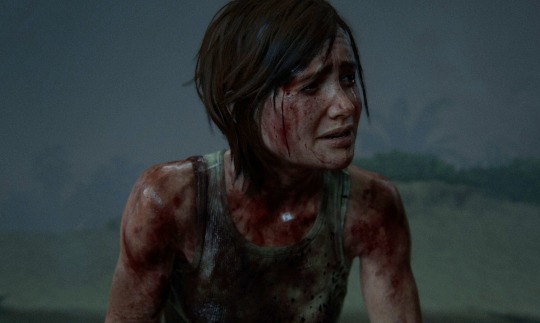
Let’s state the obvious: Ellie does not have a character arc in The Last of Us Part 2. A character arc is defined as a gradual transformation or inner journey of a character in response to changing developments in the story. And you may argue that Ellie from the beginning of the game is not the same as the one at the end of the game, and I would agree with you. She went from a woman consumed by revenge (not really but we will stick with that for now) to a woman able to forgive her aggressor and move on. However, there are problems with this supposed inner change on multiple levels. a) the change is not gradual b) the change comes out of nowhere c) the change is not informed by anything I don’t think there’s any need to thoroughly explain the first statement. Ellie has the same goal from the beginning to the very last second before attaining her goal. At no point in the story is she self-reflective, questions her methods, there’s no moral dilemma for her, no inner conflict, no doubt that causes her to put her own actions into a new perspective and possibly change her motivation. From beginning to end she believes to be 100% justified in her goal to kill Abby. Subsequently, if Ellie were actually consumed by revenge, the only logical conclusion to her story would be for her to eventually drown Abby.
Which neatly leads me to the next point: her change comes out of nowhere. The decision to let Abby go, as is implied by the narrative, is triggered by a random, arbitrary flashback of Joel. First of all, the timing here is outright comical. For what reason is she having this specific flashback at this very moment? Sounds like contrived, convenient bs to me to give the appearance that her decision is informed by something (which it isn’t, and we'll get to that in a moment). Second of all, getting a flashback to the most important person in your life that has been brutally murdered in front of you, seeing an image of what could have been and what was unjustly taken from you, is not gonna inspire you to forgive your aggressor. If anything, it would make you more determined and sadistic. And third of all, I hear you all yelling "but it was a flashback to their conversation about forgiveness and that inspired her to forgive Abby." And I have multiple qualms regarding this line of thinking. Number one, forgiving the person you love most in this world for having lied to you cannot be compared to forgiving the person who brutally took said person from you. This actually further accentuates my previous point, this is the person that robbed you of your opportunity for reconciliation. Implying that Ellie's thought process here is „I wanted to forgive Joel, but this person robbed me of any opportunity to, so I have to forgive her” is muddled, nonsensical and quite frankly unrealistic. And number two, is the implication here that this is the first time Ellie has thought back to that conversation? That’s a whole new level of nonsense. She will have reflected on all moments with Joel, including this one, and yet at no point prior to this moment had she considered even the possibility of forgiveness, as I have illustrated earlier. So why now? Very obviously to get a payoff, which was neither set up nor properly developed. And moving on to my last point: it is not informed by anything. I know a lot of players didn’t want Ellie to kill Abby, and even I felt that way at first, albeit presumably for entirely different reasons (I was so drained and removed from the narrative by that point that I only thought to myself "just go home, you psychos"). But upon reflection, I concluded that that would have been an unsatisfying conclusion narratively speaking. Nevertheless, Abby seems to have grown dear to many players. After all, they have spent several hours with her, they have seen her struggle, overcome her obstacles, fight for what she believes to be right. Their feelings towards Abby are informed by the person they have seen her to be and by the experiences they went through with her. Yet Ellie is missing all of that context. She has not been with us throughout our three days in Seattle, she doesn’t know Abby outside of her having horrifically killed Joel and she has not gained any new information that would lead her to change her opinion about her. And so, we have another example of the story making characters do things that are not informed by anything, for the sake of a poor payoff. And since we're talking about characters acting nonsensically, let's talk about the roughly three minutes leading up to Ellie nearly drowning Abby, shall we? Ellie approaches the beach absolutely determined to find and kill Abby (repeatedly murmuring Abby’s name to herself). Yet when she reaches the pillars, she cuts Abby down, letting her free Lev and follows them to the boats, indicating that Ellie has changed her mind, showing pity/empathy upon seeing Abby a mere shadow of her former self. And yet again, we have Ellie acting in a way she never has before. She didn’t have pity for Nora who was coughing her lungs out, or for Jordan who had advocated for letting her live, or for any other innocent WLF or Seraphite that came in between her and killing Abby. But the one person she holds a grudge against to the point of killing hundreds of innocent people without batting an eye, that is the person she is suddenly capable of feeling pity/empathy for? Is it really that surprising that Ellie's actions here feel forced, uncharacteristic, and illogical? But it actually gets worse. In an additional display of Druckmann not knowing how humans work, we have Ellie putting her backpack with all her gear in the boat, looking at her bloody hand and then remembering "Oh yeah, that's the woman who killed Joel. I almost forgot.” And at this point in my playthrough I was laughing out loud. And so, we have Ellie all of sudden determined to kill Abby again, so much so that she is willing to threaten an innocent child’s life (this by the way was the final nail in the coffin for me, they thoroughly obliterated Ellie’s character throughout the entire game, but this goes against the very core of her being). And we know the rest, they fight, Ellie nearly kills Abby but eventually lets her go. To summarize what happened in the three minutes before our big emotional payoff to our 25 hour-long journey of playing this epitome of misery porn: Ellie has 3 - count them 3!!! - changes of heart. Her motivation does a perfect 180 almost every minute. This is not how people work! That’s lazy, contrived beyond believe, and borderline comical levels of writing, because Druckmann prioritized having a final boss battle on a beach over organic, coherent, and logical storytelling (but I guess it was worth it for the goddamn visuals). However, what’s most infuriating is that there are such easy fixes if one only thinks about it for more than two minutes that could erase nearly all for the major issues I just illustrated while maintaining the plot points of the two fighting on a beach and Ellie letting Abby go. If we have Ellie walk to the beach immediately, finding Abby there untying the boat (Lev nearly passed out in the boat, Ellie not seeing him) and she then attacks Abby, immediately we have erased two of Ellie’s changes of heart, she remains consistent in her goals/motivation, not jumping back and forth between two extremes. The two women fight much like we see it in the game, and then as Ellie is about to finish it, we hear Lev calling out to Abby. And there we have our motivation for Ellie to not kill her. Not because she gets a random, convenient flashback, not because she forgives Abby (Abby has done nothing to earn Ellie’s forgiveness), not because Abby has earned her redemption, but because Ellie cannot find it in her to put an innocent child through the pain Abby has put her through. Because at the end of the day, Ellie’s hatred for Abby does not outweigh her capacity for compassion and empathy for those deserving of it (a core characteristic of hers that was established in the first game). Because Ellie would rather let an individual live that is undeserving of it than cause the same pain she was put through to an innocent child that is undeserving of it. Granted, if we were to go with this ending, we would still have to build towards it properly and therefore would have to tweak the rest of the game, mainly by showing Ellie being self-reflective, merciful towards innocents, and even doubtful about her goals at times to make her final decision informed by prior developments in order to have the character arc actually be a gradual transformation leading to a logical conclusion. I have been a writer for nearly 4 years now, which means I am in no way an expert, or the most creatively talented person around and yet I would argue that this ending would be much more satisfying to most players than the alternative we were presented with. Because as it stands, none of our actions or decisions (and yes that is something important to consider when we are working within the medium of video games), or Ellie’s for that matter, lead up to this conclusion. The conclusion to this story, the final moment, the big emotional payoff hinges on a random flashback, not on any other developments that previously occurred in the story. Subsequently rendering all of the 25 hours entirely pointless, none of it had an influence on the finale, none of it mattered narratively speaking. So, is it even a surprise that many found this to be dissatisfying? I noticed a few people who are fond of Abby accusing people feeling differently of having too much of an emotional bias or even going as far as to say they are less emotionally intelligent. This is problematic for two reasons, a) different people have different reasons for disliking Ellie’s final choice. Some still hate Abby as much as in the beginning, others feel drained and indifferent, and others still feel similarly to how I feel in that it’s mainly narratively dissatisfying. And b) the same story can have a different effect on any amount of people (otherwise, we would have settled the discussion about what the greatest movie all of time is long ago). My point being, that no matter how you feel about this particular story you are 100% justified in feeling this way, and yes that includes people that by the end of the game still hate Abby just as much as they did the moment she bashed Joel’s skull in. That does not necessarily have to be personal bias, more often than not it’s the ability to see through the storytelling techniques used, rendering them mostly ineffective for these people (and I include myself in this). I wanted Ellie to kill Abby not because I was unable to empathize with her or couldn’t see past my own personal bias, but because that would have been the logical, narratively satisfying conclusion to this specific story.
#tlou#tlou2#the last of us#the last of us 2#the last of us part 2#ellie#ellie williams#joel#joel miller#abby#abby anderson#writing#storytelling#character arc#rant#themes#motivation#rewrite#I posted this before but deleted my account so here it is again
51 notes
·
View notes
Text
I'd debated about whether or not to post this because it's definitely a rant and there is definitely a lot of negativity, but I need to vent after last night's episode (with some leftover issues from earlier this season, too). If Betty is your favorite and you don't like to read anything negative about her, you will not like this post.
1. The way the voicemail has been blown completely out of proportion by the writers, reviewers, and some shippers is ridiculous. We keep hearing about how it was terrible, emotionally abusive, toxic, and something that Jughead definitely needed to apologize for, but nothing he said was actually out of line. There is absolutely nothing in that voicemail that Betty should have been surprised about, let alone treating it like it somehow turns her into the victim in the fall of Bughead.
It's not surprising that Jughead has now apologized twice for the voicemail, even if he doesn't actually remember all of it, because he knows that it hurt Betty. He can also probably guess what he said because he knows what he feels and how it can be exaggerated when he's feeling depressed or under the influence of drugs and alcohol. Generally if you actually admit what you're thinking or feeling when you know it would hurt someone, you feel bad about it. It doesn't matter if it's true or not, or if you're under the influence. A good person apologizes if they know they hurt someone. Jughead is a good person.
Just a note here, I've seen other people saying that Betty's actions while high should be excused just like people have said Jughead's voicemail should be excused because he was under the influence. Being under the influence DOES NOT excuse the voicemail.
The fact that Betty cheated on Jughead, did continue to sneak around with Archie while debating whether or not she wanted to "officially" pursue him, hid the whole affair until Jughead actually caught on and she had to make up a direct lie to his face or confess, never actually explained anything to Jughead (things like she was the one who stopped the affair, she wanted to stay with Jughead, etc.) even after he asked if they could talk about it, stood him up at Pop's a year later, and then stood him up again at the book release party justify Jughead's voicemail. And he has apologized for it twice.
2. That is why it was so intensely frustrating for Betty to just brush off his apology (again) and then turn the conversation to her, but without actually apologizing for anything. When Jughead mentioned not really being able to remember the voicemail, she could have brought up what bothered her in it so (a) he would know and (b) they could actually discuss the issues, which could have led into Betty actually explaining what happened with the cheating, including how the affair ended, and she could have apologized for that. It still wouldn't have been fully satisfying because Betty never apologizes first for her actions, but it would've been better than nothing. She also could have apologized for standing him up, although at least she explained why she didn't make it to the book release party.
3. However, she still didn't admit to or apologize for giving away Jughead's manuscript. The entire reason Jughead relapsed into drinking and almost plagiarized Cora is because Betty gave Jessica his manuscript. No, Betty does not get credit for "saving" Jughead because she was present when he got a phone call from Samm and admitted that he wasn't the author. She's the reason he was in that position in the first place. Yes, she had been drugged. Yes, Tabitha was present and didn't stop her. No, neither of those things excuse it. It also doesn't excuse her from sharing the voicemail with Tabitha and Jessica.
Why not? She and Tabitha were still shown as functional when all of this happened. Jessica admitted that she drugged them to try to get the manuscript. They were both capable of thinking and arguing. Betty chose to give the manuscript to Jessica. It wasn't until afterward that Betty and Tabitha started being really impacted by the drugs. Jughead's manuscript wasn't Betty's (or Tabitha's) to give away and doing so completely screwed Jughead over.
There are some questions here--did he switch over to his typewriter and that's why there was no backup? did he forget to save a copy on his laptop? did his laptop crash or get lost? who knows, but in the story it doesn't matter. There was one copy and Betty gave it away, placing Jughead in the position of losing his agent or plagiarizing another author.
Also, for playing the voicemail, Jessica had just brought the drugged fries to the table. No one is shown as having felt the effects of the drugs until Tabitha made a comment about being warm after the voicemail is over. Betty had been reluctant to help from the beginning, before Tabitha mentioned the "don't be a Betty" line, and made fairly rude comments about Jughead throughout the episode. I don't think she needs to apologize to Jughead for sharing it, but I also thought that playing the victim and having some people blame it on "being high" was ridiculous.
4. You cannot convince me that Betty cares about Jughead in the slightest when he was telling her he was an alcoholic and he's trying to get better and he's clearly drinking alcohol right in front of her and her response is "I'm an addict, too. I'm addicted to serial killers." She's struggling, yes, and it's good that she's opening up, but if she cared about Jughead at all an appropriate response here would be "So, why are you drinking?" or "are you okay?" Show some sort of concern for someone who is relapsing in front of your face. Jughead does it for Betty when he suggests she should take a break, even though he's in a moral quandary caused by Betty, depressed, and drunk.
Also, no, chasing serial killers is not an addiction in the same way as drugs or alcohol and it's insulting to say they're the same. Chasing serial killers could be described as a compulsion for Betty, or a hyperfixation, but it's not the same. It's difficult, but you can choose to not follow a compulsion without experiencing the often severe physical side effects experienced by actual addicts. I'm glad Betty recognized that she has a problem, but no, that is not an addiction.
5. The entire conversation is extremely awkward. It's clear that it isn't what Jughead had in mind, but his life that he had just been starting to get back together fell apart. He sank to new (or at least different) lows. Betty seemed like she wanted to leave as soon as she got there (understandable given how awkward it was, even secondhand) and disappeared once Jughead was distracted by a phone call. It's understandable, but disappointing. The part that was really frustrating, though, was that after talking to Jughead about how unhealthy her serial killer obsession is and how she's worried about her mom, she still goes out. Alice was passed out on the couch, which Betty paused to acknowledge. That should have been a turning point for Betty and it just wasn't. Screw these writers.
6. I loved that Tabitha and Jughead had mutual apologies, discussed their issues, and genuinely seemed to care about each other. I also loved that Jughead still cares and worries about Betty (frustrating as it is when it seems unreciprocated) because it's so true to Jughead's character.
7. It is absolutely fine and understandable if Betty has moved on from Jughead. She seemed to believe that if he found out about the cheating in their senior year, it would be the end of their relationship. She started shutting him out and trying to move on the next day.
However, as a Jughead fan, it's intensely annoying to see him still struggling with the lack of closure and continuing to have feelings for Betty after all of that. I would have preferred to see either both of them move on, then rediscover each other later (or not, depending on where the show is going), or have Betty be the one who still clearly has feelings for Jughead and have her regret blowing up the relationship.
8. Overall, I hate a lot of what the writers have done this season. I don't particularly like any of the backstories for the characters during the time jump, I don't like each character following a separate plot line(s), the lack of interaction between characters, and how disjointed everything feels.
The mothman plot was interesting, but seems destined for a disappointing end. There have been a lot of missed opportunities to bring storylines together (Jughead went missing while Archie was looking for escaped prisoners, he could have found Jughead; Jughead hitchhiked with a random trucker, even without the trucker attacking him he could have seen clues or found Polly; Sweet Pea or Fangs could have seen Betty playing hooker and organized an intervention instead of having the weird cult plot line; I'm sure there's more). Maybe it'll be better with a binge watch, but I'm having trouble maintaining interest in the final three episodes, let alone rewatching this mess of a season.
BONUS: I was relieved that the Bughead talk did not go with my worst case scenario. Based on the possible B/A return, I was a little bit worried that Jughead would apologize for the voicemail and remember what he said, then talk about how he always knew Betty had feelings for Archie. Betty, who said she'd been "wanting this since high school," would then nod along and say she was sorry for hurting him, but acknowledge those feelings. Then Jughead would ask why they never acted on those feelings after the breakup, Betty would talk about the FWB, and Jughead would go full B/A cheerleader and tell her to give it a chance (like the Pacey and Joey chat about Dawson at Mitch's funeral in Dawson's Creek). I was dreading that possibility and I'm so glad the show didn't go there. I'm sorry if I've given anyone nightmares.
18 notes
·
View notes
Text
A Refutation of Telltale’s “Is the Jedi Order a Cult?”
I was directed to this video that claims that the Jedi Order is a cult during a discussion on reddit earlier, and while the person who linked it respectfully asked to end the discussion we were having, I figure the video is worth addressing on its own, separately from that discussion. So I’ve cleaned up the points I made over on reddit and stripped out the stuff relevant to that conversation, to explain just what I took issue with with this video.
To the video-maker’s credit, he does acknowledge that the Jedi are presented as correct within the narrative of the films. Having run into one too many “the point of the prequels was the flaws of the Jedi” across the Internet, I have to say it’s refreshing to see Jedi-critical arguments made without that assumption.
I still disagree with pretty much all of the points made in the video, and found it to be uncharitable, blatantly incorrect at times, and almost completely lacking in concrete examples and evidence of his claims, but he has a right to his own interpretations, especially in that he acknowledges that they’re not the intended takeaway. But I hope that my response will show that it’s not something actually reflected by the source material, and that the Jedi are not actually a cult, even setting aside creator intentions.
Disclaimer – I’m not familiar with this video-creator’s other work, but from what’s said in the video, it does seem that this isn’t his usual kind of material, and that he intended this as “lighthearted” video. With that in mind, its lack of robustness and misinformation is forgivable – this response is mostly meant as something for me (or you, if you want) to point to the next time someone brings this video up to support their position, not as a criticism of this video-creator or his work in general. If you choose to engage with the video directly, please be kind.
He begins his arguments by claiming that the Jedi erase people’s identities by having them block their emotions completely - this isn't true; what we see the Jedi say is "be mindful of your feelings" (Mace Windu, TPM), and "don't let your personal feelings get in the way" (Obi-Wan, AOTC), and "don't let your feelings cloud your judgement" (several times). All of that requires acknowledgment of one's emotions and dealing with them appropriately.
He then claims that those who leave are shunned - this is again, blatantly untrue. For instance, at the beginning of AOTC, Dooku is still spoken of highly long after he has left the Order - the Jedi are reluctant to even entertain the idea that he could be behind the attack on Padmé. The Sith are for one thing, not necessarily ex-members of the Order, and for another, they’re "shunned" because they're going around torturing and murdering people, not because of heretical views on the Force. We see in TCW that the Jedi Order co-exists peacefully with other Force traditions, even dark-sided ones like the Nightsisters.
Another claim he makes is "There aren't any checks and balances for the Jedi Council", which is again, untrue - the Jedi are accountable to the Senate, and, if anything, that arrangement is skewed in favor of the Senate, because the Senate is not truly accountable in turn. The Jedi Council is ultimately pressured into decisions against its will, especially as the war goes on – most notably, Anakin’s appointment to the Council in ROTS.
He is critical of the Jedi taking in children, but the same can be said of any adoption - simply taking in children is not, in of itself, cult behavior, or else every adoptive family is a cult. The approach the author of this video takes to this category is too broad and does not adequately establish how to distinguish cults preying on children from healthy child-rearing.
He then claims that Jedi are expected to obey unquestioningly – but I disagree that this is evidenced in the source material. The Jedi are expected to respect their elders but we don't see harsh punishment for disobedience or dissent, merely disapproval. For instance, the most trouble Qui-Gon, as a noted maverick, gets is some exasperated side-eye. Similar to the previous claim, the approach the author takes is too broad and doesn’t distinguish a cult’s expectation of obedience from a parent’s expectation of obedience.
He claims that the Jedi control clothing and hairstyle - this is misleading at best. While the padawans all are expected to wear the braid, the hairstyle isn't set beyond that (many species don’t even have hair!), and even with the Jedi sporting a traditional outfit, we see their robes and tunics come in many different shades and colors. Some forgo the traditional robes all together, such as Ahsoka Tano, Luminara Unduli, Aayla Secura, some of them even wearing the ornamentation of their homeworld cultures on top of that (again, Ahsoka, Luminara, and Barriss Offee, and Depa Billaba, and Shaak Ti...).
Sith are, again, not ex-members as the video-author implies, and again, the issue with them is the torturing and murdering and enslaving people, not simple philosophical differences. The Jedi are perfectly allowed to speak with outsiders and presumably critics of their Order; they just don’t want to let a bunch of genocidal despots have their way with the galaxy. The video also makes an unfair assumption that Jedi can't get information from outside sources; there is no evidence for this – in fact, we see in AOTC that Obi-Wan turns to an outside source when he can’t get the results he wants from the Temple droids, and even trusts that outside source over contradicting information coming from within the Temple’s information base (i.e., the existence of Kamino – he does not simply accept that Kamino doesn’t exist, he seeks further wisdom on the matter).
The video-author completely omits the fact that Palpatine is arrested not merely because of being "on the dark side", but because the man had orchestrated a war for his own sake and was attempting to turn the Republic into a dictatorship under his control. That is a very good reason to arrest someone.
Regarding the good versus evil section - first of all, the Jedi in the first six films never once refer to "the light side". Not once. I don’t recall if it came up in TCW (aside from the beings on Mortis, but they are not Jedi), either. Luke does refer to the "good side" in the OT but his teachers don't call it that. This point also goes against the visual metaphors that Lucas makes use of: “Color plays an extremely important part. The bad guys exist mostly in a black and white world; the good guys live in an organic world of browns and greens. Philosophically the bad guys live in an absolute world of black and white, where the good guys live in a more naturally nuanced world.” - George Lucas, the Making of ROTJ. The Jedi’s belief system is more nuanced than “this is good” and “this is bad”, and their rules and Code are not purely about morals.
The video goes back to the identity thing – but as I've already said, several Jedi are seen wearing the garments and ornamentation of their birth cultures. They also keep their birth names, and seem to value names highly given how they approach the clone troops under their command. Here’s a good post going into that even more.
The "Code" and swearing-in ceremonies he cites are not used in the films or TCW. I’m not sure where the swearing-in is sourced from, either, and the “Code” is a meditation mantra.
The things the Jedi say are not to stop complex thought – his example of Obi-Wan even at once point telling Anakin to “use the Force! Think!”, indicating that he would like for Anakin to think things through – he echoes this later in ROTS, trying to get Anakin to consider the Chancellor’s suspicious behavior. There’s also the fact that the way Yoda speaks is by George Lucas's own words, designed to get people thinking about what Yoda is saying.
Comparing meditation to hypnosis is...completely uncharitable.
And again with the emotions thing - at no point are any emotions labeled evil, nor do they avoid them - they are expected to be mindful (i.e. cognizant) of them, and to not let those emotions rule their actions. There is nothing to indicate that their teachings are the most uncharitable and extreme interpretation you can take from their words (as this video does) instead of a reasonable and healthy approach to self-control that is actually valuable psychologically.
His final claims repeat the earlier claim of “shunning” - again, there is no evidence for this behavior towards non-believers, especially as we see them having friends outside the Order. And at no point does anyone say that there is no happiness outside of the Order.
I hope I addressed all his points and sufficiently explained why they don’t match up with what we see in the source material. If you want further reading on how the Jedi actually function, with robust sources, I recommend checking out @gffa’s reference guide for the current continuity. There is also my “in defense of the jedi” tag, which collects my and others’ meta posts on the Jedi, their philosophies, and actions.
471 notes
·
View notes
Note
1p allies and axis react to that the reader gave birth to they're child. When they ask here she wants the hold the baby? , her answer is like "I don't want hold that thing!"
Alright. So, before I start off I need to give a fair warning that as to why it would even come to that point … let’s just say that it is pretty dark. Warning for implied non-con, manipulation & coercion. You’re reading this at your own risk.
Yandere Allies
America
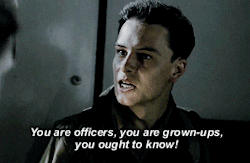
“What do you mean you don’t want it?”, Alfred would ask, completely dumbfounded by your vindictive reaction to your very own child. Lovingly, he stared down at the bundle in his arms. The reddened face covered with wax was just too adorable to be true.
“We’re finally going to be a family; it is the most wonderful thing I can think off. And you have to react like this.”
The malice in those sky-blue eyes was clear as he took in your exhausted state.
“Aren’t you ashamed of yourself? This is your child as well as mine and you have to go on and reject the best thing that has ever happened to you? Your lack of compassion is shocking. So, either put your big girl panties on and act like an adult or we’re going to have a serious talk!”
Let’s just say that Alfred wouldn’t take it well at all that you have such an aversion to your very own child. He would see it as grounds as to have a serious talk with you. If you’re lucky, it would be something akin to a psychotherapy section that he would do with you, only with a lot of condensation. Then, if he is in a very bad mood, it would be far more macabre.
Of course, the things he would do to you would be wrong, except in his mind where everyone of his actions would be justified. Through rejecting your child, you would have tarnished his image of you. Alfred would have thought that you had gotten used to idea of spending the rest of your days by his side. Those vile words of yours would have served to confirm the latter. And villainize you in his eyes.
You would have a lot of apologizing to do. Just keep in mind that if he would sense anything fake in your buttering up to him, the trust he would have established would crumble to ashes. And he is good at disconcerting true from false. However, if you’d hide any lies you’d have behind extreme emotions, then you could succeed.
Canada
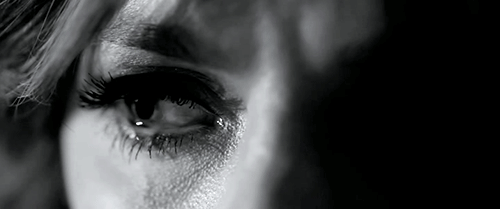
“But, she/he is your child”, Matthew would protest. The way you’d firmly shake your head would make his heart drop to your gut.
“A child I never wanted”, you would whisper, sweat glistening on your brow and making it seem as through you were submerged in a fever dream. “Only you wanted a child, I didn’t. How can you be so blind to not see that?”, you would murmur, too lost to evade the hole you were digging yourself into.
Your captor’s lips would thin as he was reminded about the darker aspects of your relationship.
Talk about popping a balloon with a needle, there goes all that happiness and excitement, blown away by a few cruel realisations. Of course, due to your relationship not being of an overly violent nature the fall-out wouldn’t be harsh in the direct, tangible sense. Needless to say, Canada would be pissed that you just had to go on and ruin the whole show and his dreams of a saccharine future.
He’ll skilfully dismissed that you would have been coerced into bearing a child (if not by the worst way you can get pregnant) and tell everybody that would even catch wind that there was something sinister buried deep, that you were just hysterical because of all the residue hormones from the delivery and the exhaustion. That is, if he has too.
China
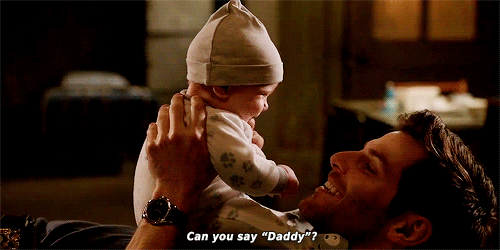
A fine, pencil thin eyebrow would rise as he condescendingly regarded your disarrayed constitution. Calmly, he would turn to the midwife he had order and take the new-born expertly out of their arms while stating:
“We thank you sincerely for your services. Please, leave now that I may calm my wife down.”
They would nod and quickly scurry out of the room.
Snake-yellow eyes would stare fondly at the infant weakly kicking at the blankets and thin lips stretched to an endearing smile as a tiny, waxy hand was extended up to his face. Gently, he would shift his arms so one hand was free. The baby would snatch the outstretched index finger as soon as they would have the chance, clumsily stuffing it in their mouth and sucking.
Yao wouldn’t even glance your way as he would seat himself on the edge of the mattress, however, his scolding words said with such calmness would add a crude shadow to the picturesque image:
“All your tantrums are growing increasing petty. You should restrain your emotions before you go completely out of control.”
You wanted to gap at him, at his patronizing words. But more than anything else, you wanted to cry for help. Not that any would come. You were stationed in the guest room of his estate and the midwife that had been summoned was the only other person anywhere near you.
She wouldn’t aid you, not that she could. Your “lover” had a way with words – his violence wasn’t physical; it was an intangible knife that made wounds that would never heal.
Instead, you would stammer shakily: “But you said we would give it up for adoption.”
“I said I would consider it. There is a big difference there. Besides, you shouldn’t torture yourself by denying your own nature.”
At those words you would find yourself trembling. Rage would simmer like a pool of magma in your stomach and combined with exhaustion it would make you shake – a brittle leaf in the autumn wind. Your voice would crack as you seethed: “Do you have to start with this sexist nonsense out me being a woman…”
A glare would be enough to silence you.
“It is not because you’re a woman. It is because you’re a human and humans care for their kin.”
To China, it would be barbaric for you to so callously reject your very own child, the fruit of your womb, a testament of the love you two have for each other. To him, family is infinitely precious and for you to smash that vision there would be severe consequences. Whether you would like it or not, you’re going to keep the child and you’re going to love him/her. Although, you might do all that out of your own “volition”, as in China would manipulate you to extent that you’d think those thought would be yours.
England
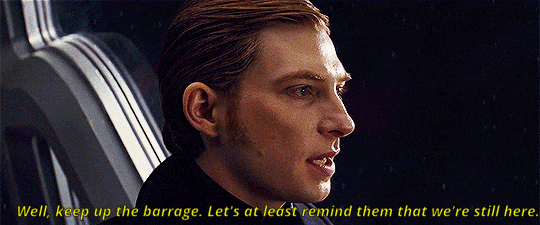
“Shut up!”, would be his immediate response and the waspishness of his tone would be enough to make the nurse raise their eyebrows in suspicion. However, the rage upon porcelain feature and the harshly snapped instructions of “Leave” and “Not you bloody dare tell anybody about this” would be enough to make your only gate way to freedom vanish.
Money would also help seal the deal.
The baby would be in the cradle at the foot of your bed, luckily, because the expression of malevolent fury on his face told you that he would’ve broken anything in his hands in fit of rage. It was the expression of hot passion and chilled anger that one would normally attribute to a general.
Still you summoned your courage to make your case: “I never wanted this, not any of this so not give me that look. You knew I never wanted a baby, you knew that didn’t want to…“, you would yell and choke on those last words because of the memories they’d evoke.
And that window of opportunity would be what Arthur would use to crush your case to dust:
“It is funny, really, because half of the time you don’t know what you want from life”, he would say, voice dangerous soft as he approached you, the fairy fire in his green irises making your skin itch as if there was something contagious directly underneath the first few layers.
“But that doesn’t matter anyhow because your feelings are irrelevant.”
You would open your mouth to protest but only a croak your come out.
“No matter what you say, your emotions are not accurate assessments of reality. What is reality is that you don’t know what is best for you. I do, better than anybody else and that is why you need me. Face it, you’re nothing without me.
“So, except your new role of mother. I promise, you’ll grow to love it.”
As the man himself just now stated, your wants and desires are meaningless to him in the grand scheme of things, or at least, he’ll convince you of that. If you would believe that yourself, then thing would be much easier for him. Arthur would see it as another chance to degrade your identity while putting his on a pedestal.
However, if you wouldn’t fall soon for his manipulations, then he would let you feel his anger in controlled bursts. The spite would surface over your time of recovery and he would purposefully leave you alone with the child so that you would be forced to take care of them.
France
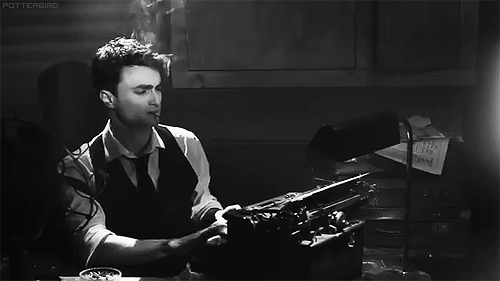
“You will”, he’d state firmly.
Your jaw would hit the floor. Him not getting sentimental would shock you.
“It pains me to see you like this, to see you so cruel, so take those words back. What happened to my (y/n)? What happened that her morals decayed to this point? Where is her heart? Where is her compassion?”, he would sorrowfully lament, like a heart broken poet.
His touching little serenade would be enough to make the fussing baby fall silent, not to mention you.
Guilt would rise up in your gut, toxic and hot. Just what had come out of your mouth?
This would be one of the matters where he’d leave no room for his delusions, where he would even go as far as to revive all the memories of your countless grievances for the sole purpose of teaching you a lesson. It would be needed, and he would be lucid enough to recognize you as a potential threat to your own offspring.
To say the least, he would be weary of you during the next few years, least you try to get rid of the child somehow, be it through cold blooded murder or by giving them away for adoption. With the outburst you would have displayed, nothing would be off the plate in his eyes.
Russia
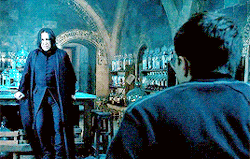
Violet-blue eyes would be harsh as the high north when they met yours, the warning glare enough to silence you and make something shrivel up in you. Defeated, you would press yourself back into the mattress hoping the accursed thing would swallow you whole because that would be better than all the damnation that the hardset features of your captor promised.
Therefore, it would be all the more petrifying when Russia would elect to ignore in order to turn his attention to the squirming infant in his arms, cooing lovingly and smiling.
Ivan wouldn’t take any nonsense on your part and if you hadn’t learned it at that point then you would be in double trouble. It might even descend into slaps. Although that would be a last resort, if he would feel his control slipping and resort to drastic measures in order to regain it.
He wouldn’t lose a word over your unforgivable behaviour, not the next day, not the next week, not the next year. If you would bring the topic up, then he would be quick to shut it down. However, just because he would verbalise the problem doesn’t mean there wouldn’t be any consequences for it. It would take for in the nuances of your life together – him not help you with the post-delivery recovery, often having a patronizing and degrading undertone in his voice when speaking with you, generally acting more spiteful towards you…
Those would just be a few examples. And he wouldn’t take written or spoken apologises either. Ivan wouldn’t care for lip-service, you would have to prove yourself to be a worthy and loving mother in order to get in his good books again.
#yandere allies#yandere hetalia#yandere America#yandere england#yandere china#yandere Russia#yandere canada#yandere france#yandere hetalia x reader#x reader
231 notes
·
View notes
Text
“The 02 characters didn’t get any character development”
Yes, they did.
“But -- “
Yes, they did.
Having had the gift of having rewatched 02 recently, I have to say that it still really, really confuses me how the hell people get this impression. It’s not even “I’m trying to see the best out of this” but that I genuinely do not get it, because as far as I’m able to see it’s pretty much literally right there!! This isn’t even tinfoil hat tier!
But in case you have any doubts, sit down because Shiha’s gonna sit here and write a meta about the 02 kids, and how they are perfectly reasonable characters that developed properly fine over the course of the series.
(All below translations of 02 dialogue are by PositronCannon.)
So the first thing to understand about 02 is that it is fundamentally made with a very different writing approach from Adventure in the first place, and therefore it is not meant to be compared in a one-to-one fashion.
This is a point I’ve said many times over and over, and I think it’s to the point where it shouldn’t even really need official clarification, but I’m just going to go ahead and bring up the words from Director Kakudou himself:
For instance, we had the prior series stick out in terms of its points about “what it means to be oneself”, and for 02 we made it so that you would pay attention to “the relationship between yourself and other people”.
Right, so: 02, by design, does not use Adventure’s character development methodology of “self-awareness”. It is built from the ground up by having its characters and character development predicated on relationships instead of singular characters. This might seem a bit odd on its face, but no man is an island, and, in fact, changing the way you interact with other people and with the world in general does speak a lot about one’s personal growth in its own way. And this also means that if you try to analyze 02 by holding it to Adventure-based standards of “character focus episodes” or the like, you’re already on a losing battle.
This means that character growth in 02 is not presented in a way where it’s up-front and center, but rather something you have to glean over the natural course of the series. We’re working off relationships, so you have to actually pay attention to the natural interactions between the characters or what they say even during “off-hours” -- the focus-episode format used by Adventure doesn’t apply here anymore. And it’s something apparent enough from how “evolution” is a metaphor for “personal growth” in this franchise -- in Adventure it was via the Crests, which meant self-awareness, but 02′s key evolutionary trump card is Jogress, which relies on the strength of relationships.
One thing I have to say in terms of my experience as a 02 fan is that I’ve found I actually appreciated it significantly more as an adult than I did as a kid, and that, in general, a lot of the things to appreciate about 02 are things that you really viscerally feel and understand when you’ve gotten that degree of life experience under your belt. Unfortunately, this is kind of a double-edged sword, too, because it ends up becoming the kind of series that often risks going over the heads of the very audience of children it was supposed to be targeting. It’s got a lot of very nuanced depictions of mental health and the childhood experience that are maddeningly subtle, to the point of possibly going over one’s head or even coming off as illogical without sufficient life experience, or simply just not being as visceral (the entire theme of “parents stroking their own ego with their kids’ achievements” hits the hardest when you’re college age).
So what this means is that 02 doesn’t exactly hand its themes or character development to you on a plate. But it is there, once you actually start looking for it.
Let’s start off by talking about our main core cast of characters. Adventure and 02 prided themselves on the fact that they tried very hard to not be adherent to anime tropes, but rather to portray well-rounded, nuanced characters that felt more like actual kids you might meet at school. So how does the 02 cast fare in not being pigeonholed anime tropes?
Daisuke: Even though official freely admits he has “the most anime-like personality”, it’s hard to say he actually falls that much into the generic shounen archetype. For one, he’s actually shockingly humble and polite in certain situations (he’s consistently polite with his elders, and is very quick to admit his own limitations). Actually, he comes off as a surprisingly friendly and deferential person -- it’s just that he happens to have somewhat of an abrasive exterior, and even then it’s implied heavily in the first half that this stems from a lack of validation and purpose. (He actually “deflates” really easily, so you can’t even say he’s all that arrogant past the surface.) Certainly he’s simple-minded, and kind of an idiot, but his abrasive exterior is actually pretty deceptive.
Miyako: Miyako floats an interesting duality of simultaneously being aggressively feminine and being aggressively un-feminine -- not necessarily in the sense she tries not to be feminine (on the contrary, she absolutely embraces it), but more that she’s also an aggressive, “inelegant” mess in ways atypical for a lead heroine in a shounen show, who are usually either cute or “badass action girls” and not...a mess. Despite that, she is also consistently portrayed as capable of heavy emotional depth and being very genuinely kind and concerned about others, which are not in any way diminished by the fact she happens to be an aggressive mess with a severe case of foot-in-mouth syndrome. It’s an interesting mix of character traits that you don’t see often.
Iori: “Designated young characters” usually fall into the “cute” archetype a la Adventure!Takeru or Tomoki, so it’s interesting that the youngest one is actually the most mature one, and impeccably polite at that (having been raised by a family that emphasizes formal manners and propriety). Even more interestingly, nobody actually treats him like he’s that much younger, and he’s given the weight of respect in a sense that has nothing to do with his age (think about how there are indeed quite a few kids who simply just get along better with older kids). Yet the series doesn’t shy away from his youth, and his overly black-and-white view of morality is portrayed as immaturity in its own way, along with the occasional “slips” in his facade or manners indicating that it’s still something he has to consciously focus on.
Ken: Ken’s development goes without saying (it’s one of the most consistently praised aspects of 02), but it’s also interesting to note the unusual way the series plays his redemption arc. Instead of making him a typical “jerkass anti-hero who learns to get a bit better”, the series completely blindsides you by revealing that Ken is, in fact, a naturally soft-hearted and kind boy, and then plays up the mystery of the severe kinds of trauma that would lead him down that path. And ultimately, even though the cause is revealed to have supernatural influence, the series also makes it clear that it doesn’t matter -- that, whether it was his conscious “fault” or not, he still is responsible for what he did. And on top of that, it also scorns the usual “redemption by sacrifice” mentality by pointing out that it’s a cop-out -- it doesn’t actually solve the problems that were caused, and, in fact, a much better way to make up for things is to fix them going forward.
Takeru: Takeru had the “designated young character” role in Adventure, and it turns out that once one of those gets a few years older, they’re naturally not going to be nearly as pure and innocent! The “sweet child” from Adventure has now grown into having slightly pettier emotions, even to the point of grudge, and things he won’t let go of. Oh, and also, trauma from three years prior is still going to have impact on an eleven-year-old kid. Who would have thought.
Hikari: Adventure’s most infamously inscrutable character also seems to have gained some individualized, not-quite-innocent traits of her own (observe how she deals with Daisuke’s advances), and, moreover, it turns out that her deferential humility and refusal to open up about her problems is...not a good thing! when it starts to actually bite her in the rear in front of her friends. Yeah, it turns out that being the “quiet cute girl” actually has its own mental health drawbacks. Oops.
We’re doing pretty well, actually! At the very least, they certainly feel like they already have the Adventure/02 brand of character nuance, where their personalities are inherently varied and nuanced enough that you may not quite find characters like them elsewhere. On top of that, we definitely get to see what makes these characters “tick” -- we get a lot of depth into their thought processes and what their likes and dislikes or strengths and weaknesses are, and that’s something 02 still completely beats out a lot of other kids’ shows or even certain other Digimon entries with.
But here we’re talking about character development. So what do we know about them at the very beginning of the series?
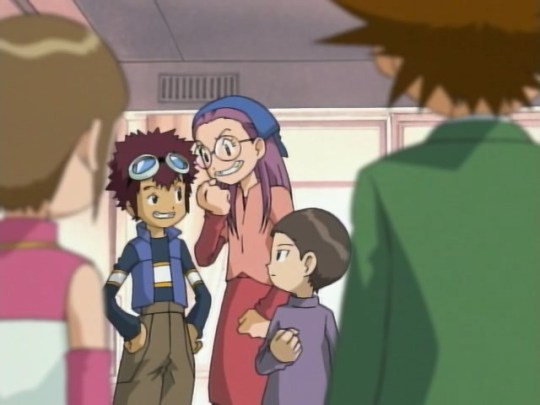
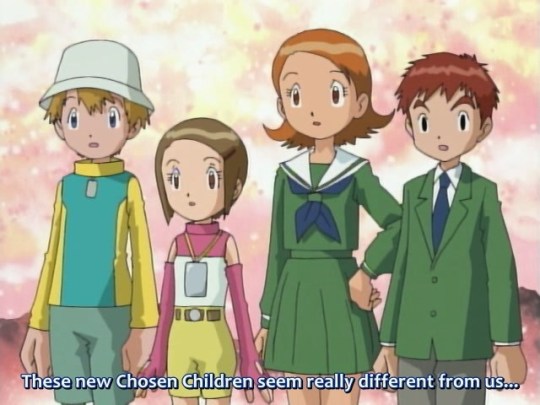
Having watched 02 in Japanese a few times and being very used to the core cast’s latter-half characterizations, rewatching the early episodes always strikes me really hard in the face with genuine shock at how shallow the kids -- especially Daisuke and Miyako -- start the series off as. It’s understandable in terms of the context of the series -- unlike the Adventure kids, who were thrown into a “survival, need to get home” situation off the bat and thus already understood the need to be wary, these kids started off having comparatively easy access to home at any time, and didn’t have a constant sense of danger and survival looming over their heads. It naturally took a lot of time for the gravity of the situation they were in to start really hitting them, and so even the relatively straight-laced Iori didn’t exactly take it all that seriously at the beginning.
Yet while it took them a significantly more delayed time to understand what they were dealing with and take it as seriously as they needed to...they started cultivating something else in the meantime.
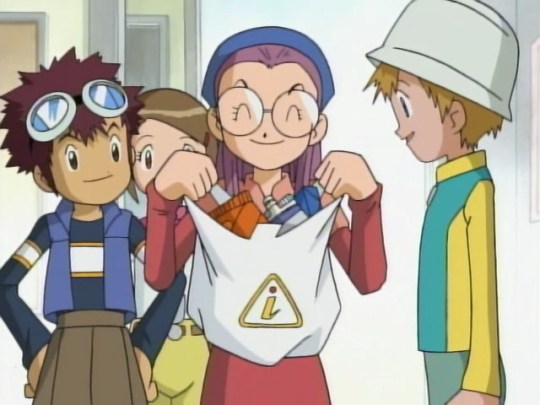
02′s first half is especially full of “random banter conversations” that seemingly involve nothing in particular, but, in fact, that’s actually part of the point. One thing I have always been quick to point out in regards to 02 is that it is rather unique among Digimon series in how it goes out of its way to portray its core cast as having become friends even in pure daily-life social friend terms, even if it had absolutely nothing to do with Digimon incidents -- these are kids who genuinely enjoy each other’s company even in the most mundane of situations. This was something that wasn’t the case for the original Adventure kids -- having been a group of kids thrown together by necessity, even though they most certainly kept in touch and trusted each other as fellow Chosen Children deeply, they started floating back into their own different social clusters after the events of 1999. Relationships are multifaceted, after all; you can still have a deep relationship and bond without necessarily being friends on a social level.
But already, off the bat, Miyako brings food for her new best friends, and it’s implied that she’s the main ringleader behind holding the picnic -- a picnic that started off having no intended relation to the Digital World territory war -- in episode 6. And, to be quite honest, can you really blame these kids? Even the Adventure kids wistfully entertained the idea of a long-term fun adventure through the Digital World in Adventure episode 54, wanting to enjoy its beauty and fun in a situation where they weren’t constantly running for their lives. Now that this luxury is actually available, why not take advantage of it -- and bond further with the others in the process? And for the rest of the year, these kids actively end up spending mundane conversations together and bonding to the point that, by the time we get to the end of 02, these kids have just genuinely bonded so much that they really come off as a cohesive, inseparable unit that would actively choose to spend time with each other if given the opportunity. In fact, even going through all of the TV Digimon series that exist as of this writing, I would say Appmon is the only one that really competes with 02 in portraying its core cast in this manner.
Again, remember: this is a series where characterization is dependent on how the kids treat others and interact with them, so you do actually have to pay close attention to these interactions and see how they change over the course of the series.
So once the episodes start coming in play, we actually learn a lot more about what happens when the characters start breaking away from their shallowness. For instance, episode 8, one of the first key episodes to understanding Daisuke’s character:
Daisuke: He'll be a great opponent. We didn't face off in the last tournament. Takeru: If you had made it to the finals, you would have, right? Daisuke: Don't remind me... Hikari: Can you win? Daisuke: It's not about winning or losing. Right now, all of the boys who play soccer in this country want to be like him. Just thinking about playing against him makes me excited!
For all Daisuke initially seems to be arrogant, he’s actually not that incapable of humility. Far from it, actually; he does have a genuine love for soccer and the spirit of the game, and, when completely and obviously unmatched, fully admits he has no chance and is set on enjoying the most he can out of it anyway. I feel like Daisuke’s surface-abrasive attitude really does throw off the fact that he’s a lot more genuinely humble than he’s given credit for. In the end, he’s satisfied enough with the accomplishment of pulling off one sliding tackle against Ken, and is able to enjoy that -- a foreshadowing of how the latter half relies so much on the fact that he’s capable of enjoying simple pleasures and being straightforward about them.

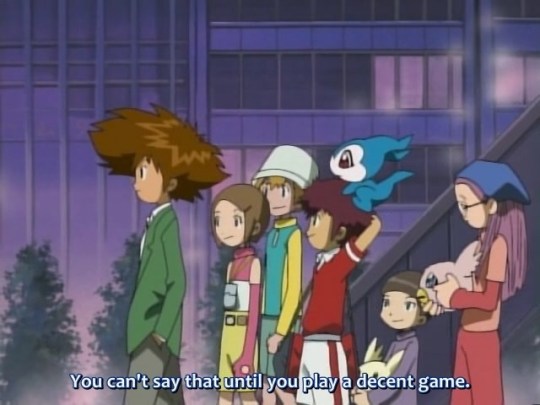
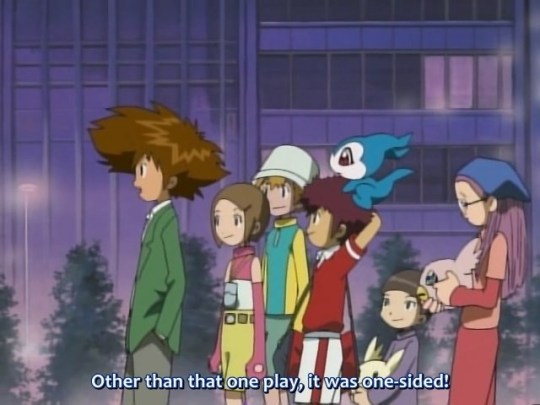
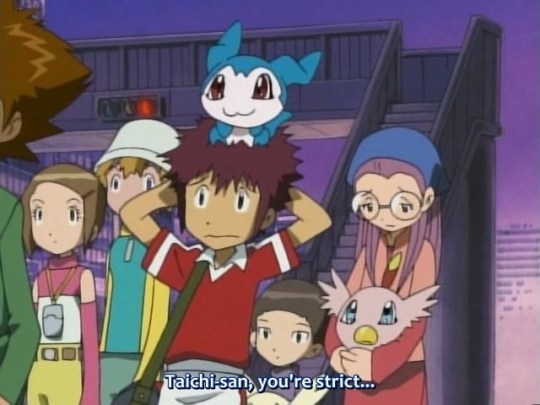
I find that this scene is really underappreciated, too (mainly because it gets lost in all of the other major things in this episode) -- while Daisuke jokes about his accomplishment, it only takes a single comment from his respected senior Taichi to shut him down.
There’s a huge reason I constantly emphasize that Daisuke respects his elders -- this part tends to get lost in translation a lot (especially the American English dub, which just smashed this aspect out of him wholesale, among other things) due to it being a bit reliant on Asian senior deference and cultural propriety, but Daisuke is respectful not only out of societal obligation but also because he genuinely respects his elders! The way he looks up to Taichi and chases after his approval is genuine, and even his interactions with the other Adventure kids have a major hint of him having genuine respect and deference to them. Daisuke is just a deferential person in general -- note that while his crush on Hikari tends to manifest when he’s at his most shallow, he’s actually the one putting Hikari on a pedestal (considering it his own responsibility to impress her), so he’s not actually as assertive as he tries to come off as. The first half of 02 arguably has him deflating more often than he actually stands his ground...and this is a trait of him that starts to actually change quite a bit over the course of the series.
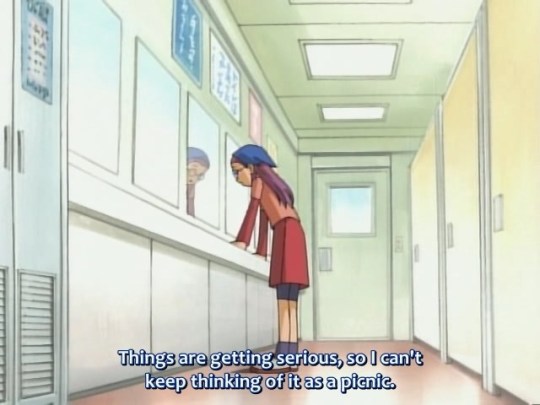
Miyako comes to terms with the fact that maybe she’d been taking this whole Digital World adventure thing too lightly in episode 10, indicating that she actually does have a good sense of priorities when they become increasingly clear! This is actually very important, because it fleshes her out as someone who’s emotionally sensitive -- too emotionally sensitive, to the point that “emotional sensitivity” is just as much of a driving point behind her later breakdown in episode 18, this time from taking her duties too seriously. Miyako is a very id-driven person, and so a lot of the early series is her struggling to find a proper balance on how to adjust her emotions in an increasingly escalating situation. Her heart is in the right place, she’s just not someone with an inherent sense of preparedness to deal with this kind of problem.
We get into the secondary Digimental arc, and there’s a noticeable consistent thread that all of them involve admission of personal faults. This is something that tends to throw people off at times -- wait, having bad traits about yourself is what awards you? -- but the point is that this isn’t like Adventure’s Crests, where things came from proof of exercising the virtue, but rather admitting that there are ways you need to improve, and showing a will to improve in that manner. In the end, people are not perfect human beings, and sometimes even understanding that you’re deficient is half the battle -- after all, the second half is all about a certain character named Ichijouji Ken coming to terms with some very, very serious personal problems.
In episode 11, Daisuke completely admits that he doesn’t feel he understands the concept of friendship the way Taichi and Yamato et al. see it, also latently admitting that he doesn’t see himself as worthy of the Digimental of Friendship. Beyond betraying a lot deeper issues within Daisuke that he seems to have actually had a background lacking in friends and sources of validation, he actually acts very self-effacing when admitting his issues to Taichi and Yamato, ultimately culminating in him calling himself pathetic. Or, in other words, he does want to be a better friend and to understand the concept better, and is harsh on himself for not doing better (which, of course, ultimately leads to how he eventually does gain better relations with the rest of the group and reaches out to Ken).
In episode 14, Miyako admits that she’s shallow and judgmental and tends to jump to conclusions based on first impressions. Recall that she’s comparing herself to Mimi in said relevant scene -- Mimi, whom she admires, and actually spends part of the episode trying to understand and empathize with the mentality of. This is not a statement of Miyako being proud of herself. Rather, this is Miyako being very straightforward about the fact that she needs to try harder to see through the essence of things and to see through to the emotional core of. Again, something she actually does start developing over the course of the series.
In episode 16, Iori gets his first major lesson on the limitations of being too stuck on principles in his attempt to be honest. Recall that Iori’s later character arc is very dependent on him realizing that his own view of the world is too black-and-white. It’s great if you could never tell a lie to anyone, ever, but in the end, that’s going to reach limitations of practicality -- after all, as Jou points out, what Iori did ended up not actually hurting Jou in comparison to the incredible amount of hurt it would have caused everyone by being too stubborn, and thus Iori would have failed to keep his responsibility to help the others because of one narrow-minded principle.
Hikari even gets in a bit during the infamous episode 13, where we learn that her “passive” attitude is biting her in the rear. In Adventure, Hikari’s passiveness and reticence had mostly been used as satellite development for Taichi (his insecurities as an older brother and his obligations to her), so this is actually the first time we get to see a proper perspective from Hikari’s side, and it turns out that his overprotectiveness has actually caused her to get dependent. But even though Taichi is the one the episode actually focuses on, the larger focus is more specifically on the fact that Hikari is too passive -- that she sees being taken by the Dark Ocean as an inevitable thing that’s just going to happen unless someone else steps in on her behalf. Takeru, of course, is having none of it.
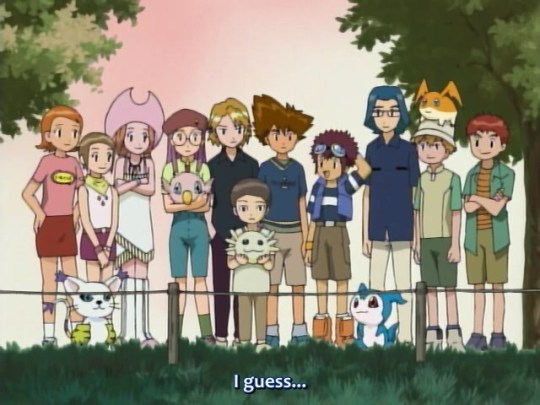
Once that’s out of the way, we go back to taking a look at the subtleties of everyone’s interactions. While everyone generally tends to focus on the second half of episode 17, it’s also pretty interesting to see how the 02 kids react to hearing about their seniors’ adventure in the first half -- remember that this is the first time the 02 kids are actually given any real depth about the degree of 1999′s events that’s not just random points of hearsay, and the way the new kids react to it indicates that they’re thoroughly floored. It’s later established that they didn’t even get the full story (it may not even be possible, given that the Adventure kids’ experiences may well have gone even further beyond what we got to see in 54 episodes), and yet the new kids are overwhelmed. 02 itself does not shy away from the fact that the younger kids really have no qualms about deferring to their seniors if need be, and treating them with utmost respect.
Another minor note, which I pointed out in my Daisuke meta earlier, is that the beginning of this episode is pretty much the last time Daisuke ever shows outright hostility towards Takeru for his relationship with Hikari -- it’s something you have to glean by squinting, but the implication is that the insecure and clingy Daisuke actually got to learn this episode that the two of them had a pre-established shared experience that he himself may not understand, and that it wasn’t just Takeru randomly swooping in and snatching away the closest thing he had to a friend for no good reason.
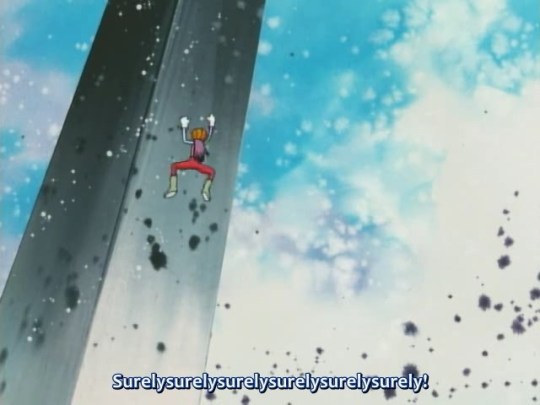
Once the Kaiser infiltration arc begins, episode 18 ends up being one of Miyako’s funniest episodes, but it’s a bit distressing that a lot of people in the fanbase often never let Miyako live this incident down, when in actuality this was explicitly not a good mental health day for her. (This is basically the equivalent of pinning Mimi as a conceited, self-centered jerk based on the fact she was one for a fashion in Adventure episode 25.) The beginning and ending of this episode establish that this is basically a result of Miyako...trying her hardest. She’s scared as hell, but she also learned in episode 10 that this is something she needs to take seriously, and the stress puts her into a mental breakdown. This is why she ends up having a heart-to-heart with Hawkmon at the end; her heart is in the right place, but she needs to find a way to channel her emotional sensitivity in a way that doesn’t make her into a complete mess.
And note that her own voice actress, Natsuki Rio, even pointed out that Hawkmon’s actions had enough of an influence on Miyako’s character that she had to play her differently thereafter.
At first I always played her with Maximum Excitement, and I kept thinking “someone, please, stop her,” but the more straight-laced Hawkmon did his best to pull her in and hold her by the reins (laughs). Thanks to him, Miyako became a lot more of a put-together person…thank goodness Hawkmon is her partner!
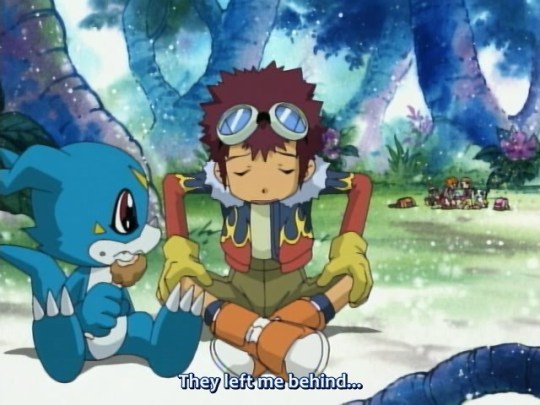
Episode 19 has two interesting things of note that I want to point out -- first of all, starting from the very beginning of the episode, everyone ditches Daisuke because they’re independently going in to infiltrate the Kaiser’s base. Note the complete lack of a plan here whatsoever -- everyone’s just going in on their own -- and the fact that everyone expects Daisuke to come up with what he wants to do on his own. For all it’s worth, even though Daisuke may have a designated protagonist aura to him, within the story itself...nobody actually sees him as a leader at this point in the series (and, to be fair, he’s never really tried to claim the position, either).
It’s similar to how Taichi was never recognized as a particular leader of the Adventure group until Adventure episode 28, but in regards to the full team dynamic, it’s actually inverse -- the Adventure kids were capable of making tactical plans together as early as episode 20, but fell apart emotionally in short order as soon as Taichi was gone, whereas here, the kids are fond enough of each other to hang out socially and support each other emotionally, but they take a while to get any real cohesiveness as a fighting group.
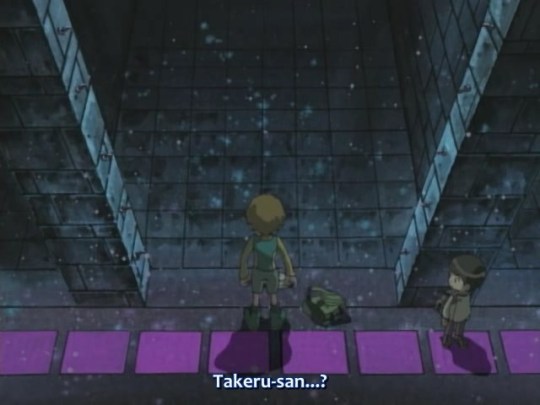
The other is that Iori personally witnesses Takeru’s sudden whiplash into his grudge against the darkness and the Kaiser, and it scares the hell out of him.
Takeru eventually laying a punch on the Kaiser is a pretty awesome moment (and, really, Ken kind of deserved it, so it’s hard to not cheer for him), but it’s also important to note that within the context of the series, this is not a good mental place for Takeru to be in. Iori, the person who should by all means sympathize with hatred of evil things at this point of the series, is still extremely unnerved by Takeru’s actions here, because he’d always seen Takeru as a mature person who’d always kept his composure, only to show a drastically different side of him that he hadn’t even shown a hint of before. That kind of “two-facedness” and emotional repression -- and this way of venting trauma in general -- cannot be good for Takeru at this point in time, and it’s also an important moment for Iori when he later admits during the two’s Jogress arc that he’s having a bit of a hard time understanding him.
And so episode 20 comes, and Chimeramon pretty much takes out the entire party, leading to this conversation.
Takeru: Let's escape. Daisuke: Escape? Takeru: We can't fight anymore. Our mission has failed. We'll retreat and wait for another chance. Hikari: You're right. We have no other choice. Iori: Understood. Daisuke: No. Miyako: Daisuke? Daisuke: We can't just say "another chance" like that. If we leave now, they'll keep attacking anything in sight. We don't know if we'll be able to get into the fortress again. So this is our only chance! Hikari: That's crazy... Iori: Exactly! Miyako: They're all back to their Baby forms... Chibimon: Daisuke... Daisuke: But...didn't you all see it? Destroying those towns...and all we could do was watch quietly. I don't want to see that ever again. I won't let them do whatever they want! So I'm going, even alone. I won't give up now. After getting this far, all I can do is go forward!
Why is this moment important? This is the first time Daisuke has actually stood a firm ground against anyone else in the party -- and not only that, with the entire party standing against him.
Recall that I mentioned earlier that, in spite of Daisuke’s abrasive attitude suggesting otherwise, he actually has a tendency to “deflate” pretty quickly when people tease or criticize him. He spends the first half of the series having a lot more bark than he actually has bite. Earlier in the series, if the entire party were to go against him, he’d be more likely to begrudgingly go along (while complaining) -- in fact, he actually did just that at the beginning of episode 7! But now that push has come to shove, Daisuke’s own sense of morals and bleeding heart have won out. (While his decision here is definitely a bit reckless, he does have a point; if they’d retreated, they might genuinely lose any future chances.) Even with the entire party telling him to pull back, he refuses to accept what they want him to do, and pushes forward.
This is where Daisuke first starts to really make strides towards what becomes his eventual major role in the group as “the one who pulls people forward”. It’s a moment after which the rest of the group themselves also start to treat him with more respect now that he’s proven he’s not just a doormat, and that when it comes to there being a real problem with real priorities, he does have the resolve and initiative to keep going.
Also, a very important point is that he immediately says he’ll go alone if he has to. He doesn’t begrudge the others for wanting to fall back, and has no condescension towards them; he just can’t stand the fact that he himself is being asked to sit it out.
So, you know. Episode 21 happens. Ichijouji Ken goes through some real trauma as Wormmon dies in his arms. And all Daisuke has to say is...
Daisuke: You should go home. There are people who are worried and waiting for you! Go home!
Remember when I pointed out that 02 takes a very unique perspective on Ken’s redemption arc, pointing out the futility of being too trapped in the idea of symbolic penance and focusing more on actively taking steps in the future to make up for and fix things? Here’s our first major sign of this, and Daisuke’s eventual approach to Ken -- Daisuke does not choose to scorn or lambast Ken for what he’s done, even though there are a lot of things Ken deserves to be harped on for, but rather instructs him to take the first active step towards fixing his mistakes, in this case fixing things with his family.
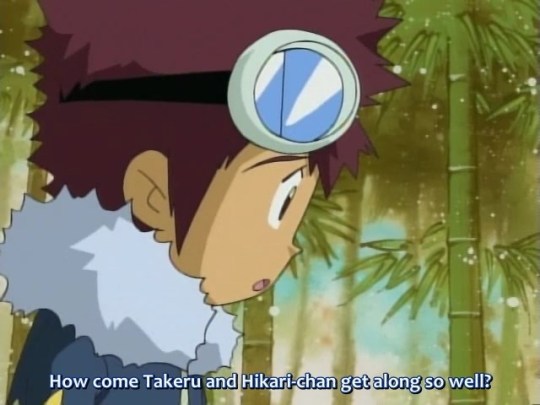
Episode 22 is Daisuke’s own “fanbase will never let him live this down” moment, but there’s still some interesting things to note here. Firstly, Daisuke’s “relapse” happening exactly when it seems like his duty to the Digital World is done and there’s nothing to do besides community service doesn’t seem coincidental, especially when this exact episode actually dedicates a full scene to Takeru, Hikari, and their partners going “...now what?” Secondly, as I touched on earlier, note that Daisuke’s never really seemed to have any resentment against Hikari for not responding to his affections -- in fact, he still considers it his own (and V-mon’s, by extension) duty to be the one to impress her. It’s a surprisingly refreshing take on the “shounen hero with a crush on a girl” trope, because in the end...Daisuke isn’t actually all that possessive of her, he just really wants validation from her, and respects her a lot.
More importantly, though -- note the way Daisuke handles this topic. He’s not actually mad at or resentful of Takeru anymore. In fact, he’s mulling on the topic and wondering what he could do to be on that level. Yup, even when Daisuke’s being shallow and jealous, he’s still learned to handle this issue ever so slightly more maturely than he would have at the beginning of the series.
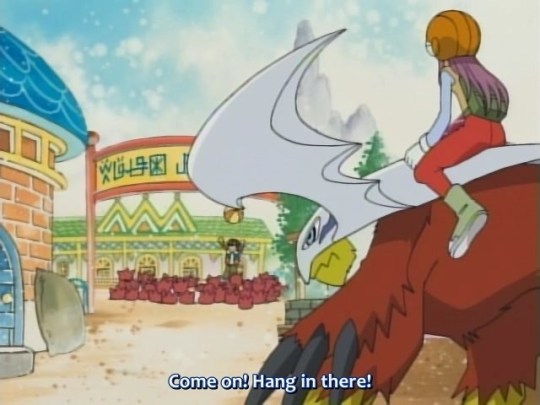
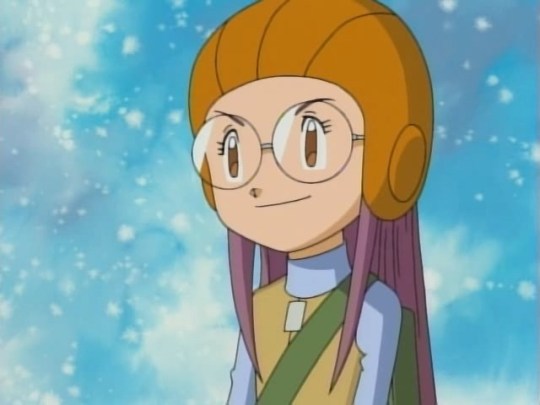
This is also important because only one episode later, once Daisuke becomes disappointed again at Takeru and Hikari walking off on their own, Miyako intervenes -- not only so that Takeru and Hikari can have their space, but also so that Daisuke can have some genuine fun and something to do. This is a very blink-and-you’ll-miss-it moment in episode 24, but it makes it very clear that Miyako was looking out for Daisuke’s welfare, too, and I think it’s very important in light of the events of the prior episode. Miyako, who had always been fumbling on what to do with her emotions, is starting to properly channel them into managing the dynamic between the team and checking in on how everyone’s doing, and that starts to guide her actions and relationships for the rest of the series.
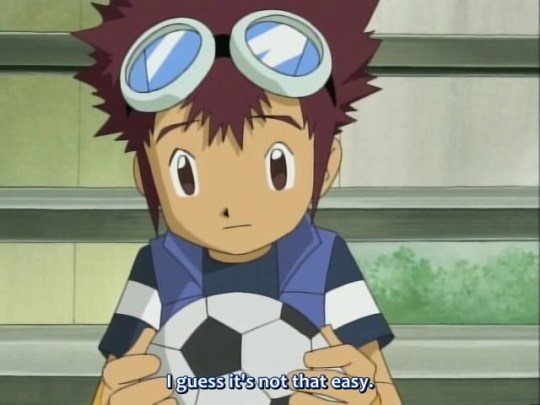
The next episode (25) is where we kick off not only the Jogress arc, but also the arc where we start going into everyone’s attitude towards Ichijouji Ken. This is important not only because Ken happens to be the effective central figure of 02′s story, but also because -- well, remember, 02 is fundamentally founded on the concept of relationships, so it’s only natural that the other kids’ relationship with the “team newcomer” will be a key aspect of the second half, and in relation to their own characters.
Remember how I said that Daisuke’s first-half character involved him being extremely deferential and often deflating whenever he was criticized or someone stood against him? At the time of episode 25, once again, pretty much the entire team is standing against him -- he’s the only one who’s this level of open-minded about getting Ken into the group, and everyone else is showing differing levels of opposition. But while Daisuke doesn’t begrudge the others for thinking this way, he also doesn’t back down, either, and reaches out to Ken on his own because he still really believes in what he’s doing. Now that he’s settled into what it means to be a Chosen Child, he’s started to gain a proper idea of what he wants to do, and what he feels needs to be done.
So, let’s recap everyone’s stances on Ichijouji Ken at the time of this episode!
Daisuke: Forward-thinking and optimistic; willing to believe that Ken should be given the chance to make up for his mistakes and that they should put everything behind him, even to the extent of believing that there’s probably a good reason for the more suspicious aspects about him (prior to the events of episode 25, it was unclear whether Ken was being a bit too callous about killing Digimon). Also the most actively aggressive in reaching out to Ken and trying to get him to join them.
Miyako: Forward-thinking; she openly states at the beginning of the episode that she thinks Ken’s learned his lesson, she’s just worried about whether he’s going to keep doing questionable things in the future (killing Digimon). Once it’s on the table that he’s not just doing this callously, she immediately is on board with him (to the point of even being the first in the group to use given name basis with him), but her stance on what to do with him is more on the edge of “give him space and wait for him to come on his own terms” (she ends the episode saying she’ll be waiting for him to come).
Takeru: States in the episode that he does believe that Ken’s changed, but doesn’t really know what he’s thinking (i.e. too inscrutable to really be sure about). The later episode 35 implies that Takeru was inclined to be a bit more sympathetic than you’d think otherwise, because he understands the trauma of losing a Digimon partner.
Hikari: Wants to wait a little longer and see how things play out. (Remember that Hikari has a known, consistent thread of taking a very passive approach towards things.)
Iori: Absolutely against it on sheer principle.
It should be noted that none of these stances are wrong. Iori sometimes gets a lot of flak for being the one with the most infamously cold stance towards Ken, but when you really think about it, Daisuke and Miyako are very lucky that their hunch about Ken was right and that he actually did happen to be a very kind boy who had a little too much trauma and some supernatural influence. The fact that Ken is a very emotionally withdrawn person for the rest of the series meant that the two of them ended up breaking through to him the most, but there’s nothing wrong with Takeru, Hikari, and Iori’s skepticism; Ken did some pretty shockingly horrible things in front of their eyes for the first half, and it’s entirely within their rights to determine how forgiving they want to be with him.
In any case, we get to episode 26 (the first Jogress), and most of that episode goes without saying, but I do want to emphasize Daisuke’s lines right before it happens.
Daisuke: If you die now, you won't be able to accomplish anything...I don't want that! Ken: I don't want that...There are still many things I must do.
Daisuke urges Ken not to go for the “suicidal penance” route not only because it sucks, but also because, as symbolic as it may be, it’s also counterproductive to the whole point of doing penance to begin with. If Ken really wants to make up for his mistakes, he’s only going to be able to do that if he’s actually alive to do it! There’s only so much you can do by drowning in self-pity by going “because I did this, because I did that” instead of actually taking responsibility for your actions.
02 itself is deliberately ambiguous on how much Ken’s transformation into the Kaiser was Ken’s own conscious will and how much of it was Dark Seed-induced supernatural influence, but one thing it’s consistent about is that it doesn’t really matter. Regardless of what the cause was, Ken did what he did, and it’s his responsibility to make up for it, and the only way to actually do that is to keep moving forward. The fact that Daisuke is so able to viscerally and directly address what Ken needs the most right now is what fuels their first Jogress, and why Daisuke becomes Ken’s closest friend through the rest of the series.
People have pointed out that 02 has a lot of moments of physical hits, but, notably, other than Takeru punching the Kaiser in episode 19 (which he really deserved, honestly), all of these hits are done with the express intent of bringing the other person out of a very, very deep mental abyss (Yamato punching Taichi in episode 10, Daisuke slapping Ken in 26, Miyako slapping Ken in 30, and Miyako and Hikari’s mutual slaps in 31), because they were in a state where words would no longer reach them otherwise. These are all circumstances of the kind where the person on the receiving end understands that they really needed a drastic wake-up call because of how deeply they’d fallen (and these aren’t some average mental abyss problems these kids are getting put through, either). It’s actually hard to imagine any of the 02 group getting in the kind of genuinely angry and vicious fistfights Taichi and Yamato would in Adventure, because of how close they are (the closest being Daisuke and Takeru grappling in episode 11, but it never got near that level) -- in fact, these kinds of things are done with the implication that they’re doing it because they trust the other person to not hold it against them (and in fact, the fact Yamato does this with Taichi in this way is intended to be read as a sign of how much better they’ve come to understand each other).
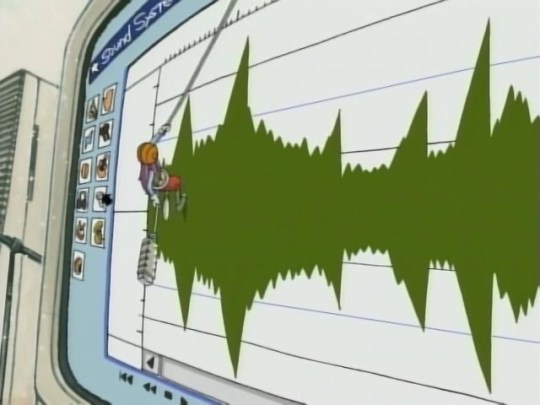
So, moving on with the series! The Giga House incident in episodes 28-29 is the first time the group works together in an organized effort, which is notable not only because it’s their first time coordinating with Ken, but also because it’s their first time properly coordinating at all. Remember when I mentioned that, back in episode 19, as much as the kids were pretty fond of each other and were great friends, they still hadn’t figured out how to actually fight as a team? Here we are, with them actually having started to figure that process out.
We then get to episode 30, where there’s actually quite a lot of interesting things to unpack.
Miyako: What's wrong with you? Daisuke: E-Eh? Mi-Miyako-san? Miyako: It feels weird when you add the "-san". Daisuke: Shut up! Man, you're all the same!
Miyako and Daisuke’s relationship is often misconstrued considering that they’re the two most chaotic in the group (their temperaments are very similar at times, which causes them a lot of friction), but I also think this blink-and-you’ll-miss it moment is pretty much their actual relationship in a nutshell. They fight a lot, and they’re ostensibly vitriolic, but they’re actually two of the most like-minded in the group -- they banter because they’re comfortable with each other. Recall that I mentioned that Daisuke is normally respectful with his elders, yet he’s the only person in the group who won’t use the -san honorific on Miyako (even though she’s the oldest)...but the one time he gets flustered and uses it on her, she tells him that it’s weird and he needs to cut that out. Or, in other words, “it’s not like you to be weirdly respectful of me like that, we shouldn’t have that kind of distance between us, stop it.”
(It’s also pretty notable that Miyako has never seriously used -kun or any other honorific on Daisuke, even right after meeting him -- the only other person she dropped honorifics on was Iori, whom she’d known prior to the start of the series, but she seems to have deemed Daisuke enough of a fellow disaster child that he merited dropping it.)
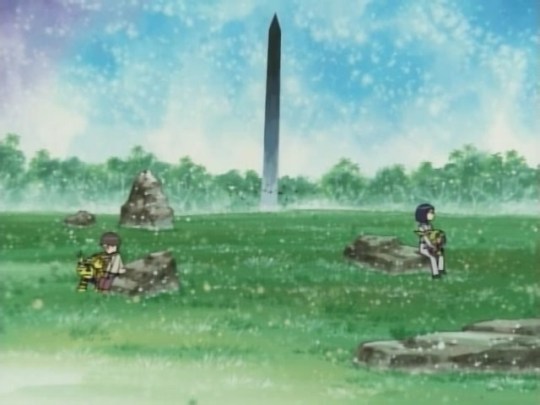
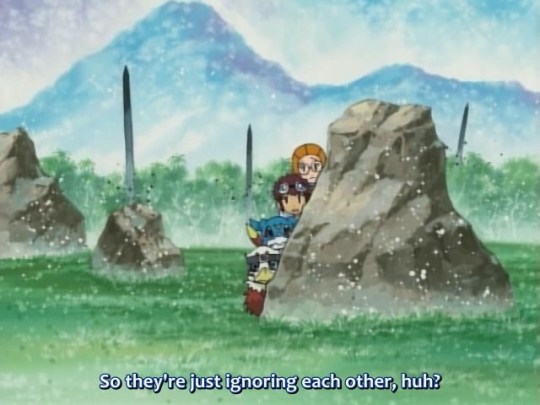
This is especially because, right after that, she recruits Daisuke into her plan to get Ken and Iori to get along -- in the end, when things really get serious, the two are incredibly like-minded (look at how in-sync they are when they scheme together).
30 is actually a surprisingly Miyako-centric episode, despite not ostensibly being one. For one, it says a lot that right now, her biggest priority is to get Ken and Iori to get along -- something that has absolutely nothing to do with herself. In episode 14, Miyako freely admitted that she had a tendency to jump to conclusions about people, and that she was shallow about aesthetics, but this is a very different Miyako from the one who harassed Daisuke for Ken’s autograph in episode 8, or immediately became distrusting of Digitamamon in episode 14. Instead, she’s simply just genuinely invested in seeing people she considers friends get along, and in a selfless manner -- one that has nothing to do with herself. She just really, really cares, a lot.
After all of the first-half hubbub of Miyako really having no idea of what to do with her emotions, the second half has her start channeling that energy into what’s always been one of her biggest strengths: checking on, connecting with, and caring about her friends. Daisuke may be an aggressive forward-thinker who can push everyone in the right direction, but unlike his predecessor Taichi, he doesn’t actually have particular charisma or leadership skills that can necessarily hold everyone together. In the absence of that ability, Miyako fills in for him, checking on the moods and feelings on everyone in the team and making sure everyone’s doing well. And that’s why she loses her temper and slaps Ken late in the episode -- because, really, she’s reached her limit on her “give him space” philosophy when he’s abusing it to be standoffish in a crisis situation, and, on top of that, she really, really did have a huge emotional investment in him.
Moving onto more Miyako in episode 31, her Jogress episode with Hikari, we get to see a little bit of the old emotionally compromised Miyako again, but -- much like the second Digimentals arc -- it involves the two of them acknowledging that both of them are not going about things the best way, and that there are things they can learn from the other.
Hikari: Miyako-san, you're a handful sometimes. Miyako: I knew that's what you thought of me... Hikari: But...I've always envied that. Miyako: Huh? Hikari: Because I can't be honest and say I'm scared or scream like you.
Miyako’s tendency to lose control emotionally results in her being insensitive much of the time, which she calls herself out on multiple times during the episode, and she can’t always be as “kind” as Hikari is -- but, on the flip side, her antics are something that can be a “light” (pun not intended) towards those who are falling in a bad mental state or into the darkness, and Hikari even acknowledges this when one of her trains of thought makes her break out into laughter. Miyako ultimately manages to get through to Hikari this way at the end of the episode, which results in a Jogress and mutual growth for both of them -- Miyako puts more thought into how to approach others (it’s pointed out at the end that she’s still thinking about understanding Ken and Hikari better), and Hikari gains more resolve and determination to fight against things instead of passively accepting her fate (she tells Takeru very directly at the end "I’m fine now. I’ll never go there again.”).
Iori and Takeru's Jogress is a little more complicated to the point where it spans multiple episodes, but a lot of it ends up having to do with the fact that the events of the BlackWarGreymon arc start really putting Iori's black-and-white principles into conflict -- it's wrong to kill something that's been proven to be alive, but it's also wrong to be evil. Putting a huge nail in that is that there's a stake in him forming a relationship with Takeru, but he doesn't really understand Takeru either -- the "two-facedness" he witnessed back in episode 19 scares even him, and he's so intimidated by Takeru that, in episode 35, he goes to approach Yamato about Takeru's past instead of asking the person directly. Takeru, hearing about this, complains that he could have just asked directly, but admits he understands why Iori did so.
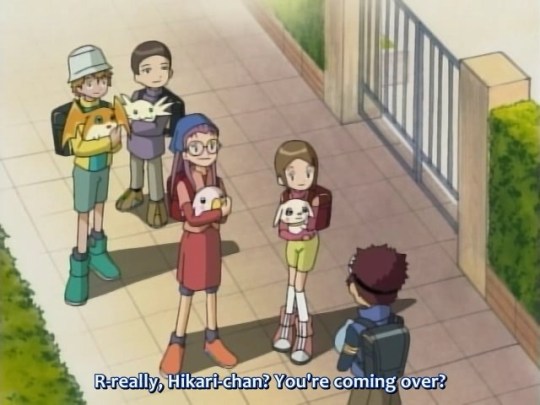
By the way, I should point out that episode 35 is the last time within the TV series that Daisuke is portrayed as having a particular interest in Hikari, and it’s just in terms of being slightly more excited that Hikari is joining his meeting. At this point, there are actual important things happening in the Digital World, and he needs to take care of Ken, too, and so...in the end, once again, Daisuke proves that he’s actually capable of putting aside those kinds of more shallow things when he really needs to.
On top of that, this is when the kids start actively working with Ken in the real world (and, if post-02 materials are any indication, continue to hang out with him even for social outings). The choice to have Ken live in Tamachi instead of Odaiba facilitated his isolation from the group during the Kaiser arc, and during around the third quarter they were all grouping up in the Digital World anyway, but the fourth quarter actually has the kids make an attempt to include Ken in their real-world outings despite the distance. Tamachi is not temporally far from Odaiba (approximately half an hour by train), but it’s a bit of a nuisance to get to, requiring crossing a bridge to/from the Tokyo mainland and paying extra for the Yurikamome. But at this point, he’s an important enough friend to them -- and them important enough friends to him -- that they’ll make it work.
At the end of episode 35, Iori finally decides -- to the point of recklessness, something that would have been previously very uncharacteristic of him -- to try and appeal directly to BlackWarGreymon to get him to stop destroying the Holy Stones so that they won’t have to fight. It’s emblematic of Iori’s heart being genuinely torn, because he’s having such a difficult time rationalizing all of these conflicting feelings. This comes to a head in episode 36, when Iori loses his temper at the rest of the group for “playing around”, but Armadimon snaps him back to reality to remind him that they’re tired and hungry, and this can’t be neglected. Iori himself ultimately becomes the one to proactively suggest that they take time to sit down and eat, indicating that -- little by little -- he’s starting to shift his thinking a bit, after being so incredibly stubborn for much of the series.
This is what leads to Iori and Takeru’s Jogress at the end of the episode, now that Iori is flexible enough in thinking to understand the emotional id behind Takeru’s mentality. And likewise, Takeru’s started to loosen up by 36, too --
Takeru: Sure, darkness is frightening, and we would feel at ease if we could get rid of it completely, but I'm sure that's impossible. Ken: Impossible? Takeru: Where there's light, there's always darkness. Hikari: The brighter the light, the darker the shadow, right? Takeru: Yes. That's why I think it's important not to lose sight of the light inside you, no matter how dark it is.
The thing about Takeru is that while he deceptively seemed more open and playful than Hikari for most of the series, he was actually bottling up a lot of emotions in a way not entirely different from the way she did. (Note how, despite how tied at the hip the two constantly are, they almost never actually talk about their thoughts on each other; it feels like a relationship where they implicitly trust each other but are practically reliant on that implicit trust to maintain that close of a friendship at all.) And he’s been keeping those emotions bottled up until they exploded in less-than-healthy ways, initially distancing himself from Iori. But being a lot more open about his thoughts on the matter allowed them to connect better, and eventually Takeru came to embrace a somewhat more reasonable stance on the matter after observing Iori.
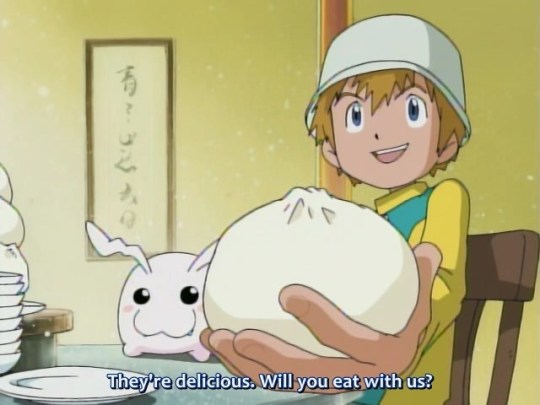
It also doesn’t seem like coincidence that this is the episode that ends with Takeru’s first major act of goodwill towards Ken.
This leads into episode 38, the Christmas episode. Fun things to note!
The episode opens with Daisuke and the other younger kids giving a “Christmas present” to their seniors in the form of letting them reunite with their partners. Remember how I said that the 02 kids always admired their seniors and looked up to them? Even this late in the series, the series does not shy away from the fact you’re supposed to see the 02 kids as their deferential juniors.
The Christmas party is, of course, notably, the first major moment of reconciliation between Iori and Ken, with Iori having gone through major harsh lessons about morality in the last few episodes, and Ken opening up more to the rest of the group. Said party is also yet another notable example of how much of a priority it is for the 02 kids to be “social life friends” and not just friends working as a Digimon incident team -- after all, having genuinely emotionally present friends is what Ken needs most in his life right now, considering that the party is treated as the first time he’s been truly happy in a long while.
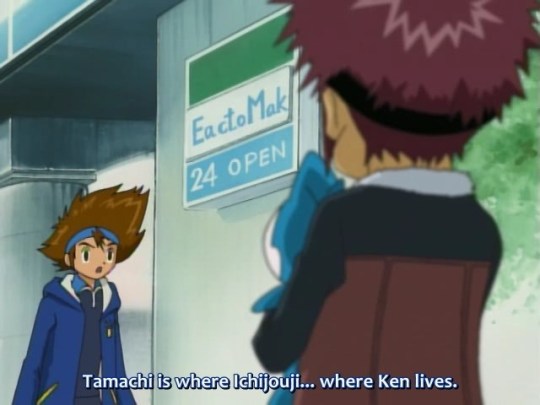
This is followed by episode 39, which is notable as the time when Daisuke finally commits to switching to given-name basis for Ken, and actually opens the episode standing against Taichi -- because he's so worried about Ken that he needs to go join him. This is something that's lost a bit in translation, but although Daisuke stands down against Taichi, he's not rude nor does he overstep his boundaries with his respected senior (he even opens his statement in polite-form Japanese) -- he's just saying, firmly and politely, "I'm sorry, but I can't go, I have to go help my friend." It’s a notable moment because while Daisuke has been becoming increasingly assertive and aware of what he really wants to do, this is the first time we’re actually seeing him refuse to defer to the very senior he’d spent so much of the series idolizing and looking up to.
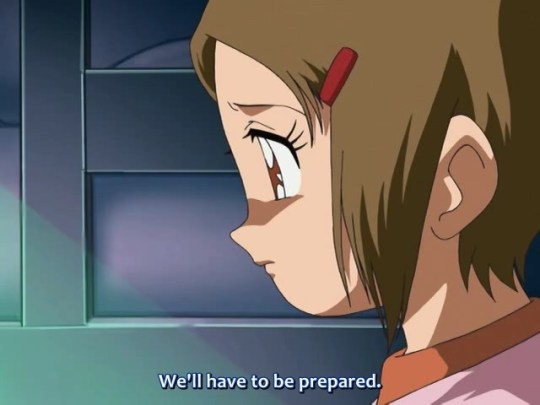
We get to episodes 43-45 (the Demon mini-arc), which is also the culmination of the 02 kids having to face the limits of pacifism. This tends to throw off people who are coming in from Adventure, since the Adventure kids ended up killing Digimon with a lot more ease in the original series, but it’s also important to make note of the fact that the episode itself deliberately portrays a gap in mentality between the Adventure and the 02 kids -- with Hikari torn between the two. It also creates an interesting subversion of expectations when Hikari, the one you’d expect to be more on the pacifist side, is the one who’s already accepted that it may be inevitable, whereas Miyako, the more aggressive and belligerent one, is the one staunchly against it.
The reason for this “paradox” comes out of a single line from Hikari in episode 44:
Hikari: You’re the one who saved him, Miyako-san.
The Adventure kids never liked killing. They were never enthusiastic about it -- it was just that they were almost immediately put in a situation where the entire fate of the multiverse was at stake thanks to some unambiguously evil Digimon who wanted nothing but wanton destruction. Even then, it was pretty clear that they never enjoyed it -- Takeru professed a desire to avoid fighting in Adventure episode 12, and the pacifist Mimi went through a breakdown in Adventure episodes 45-50 trying to avoid casualties. But one of the most important lessons Mimi learned at the time was that pacifism has its limits -- there’s no point if it ends up in more deaths than it saves, because at that point you’re adhering to moralistic principles more than you’re actually saving lives.
The fact that the Adventure kids and the 02 kids have a “different mentality” isn’t just happenstance, but outright embraced. Daisuke, Miyako, and Iori never had to actually deal with a conscious Digimon that was unambiguously evil for most of the series, and Archnemon revealing that her motives were pretty much nothing but wanton destruction in episode 29 was the first major warning signal to Iori that his pacifism might have limits. And during this Demon mini-arc, it’s not like these Digimon are threatening multiverse destruction or anything -- it really does seem like a constant “glimmer of hope” that maybe, just maybe, they can save people non-lethally. Alas, they can’t.
Daisuke, being someone who’s inherently practical-minded, starts entertaining the idea that push may come to shove as early as episode 25, and finally makes his first statement about practical limits in episode 43. But the more emotionally caught-up Miyako and Iori end up taking another episode to swallow it, and they don’t take it well. Most of the attention in 44 is given to Miyako, and it reconfirms that, despite her aggressive exterior, she’s emotionally sensitive and empathetic -- and while killing LadyDevimon is framed as truly the only thing that could have been done in that situation, Miyako is not faulted for being emotionally compromised, nor is Iori likewise when he faces a similar situation with Takeru and is forced to confront the people whose lives were at stake.
Episode 45, when Ken opens the gate to the Dark Ocean, doesn’t really have much to add on top of what’s already there, but this is basically “the point of no return” when everyone confirms their own emotional investment in Ken and understanding that he’s not just reformed, he’s genuinely struggling under the pain of what’s been happening -- and this is before they find out about the truth behind the Dark Seeds, and that Ken’s transformation into the Kaiser may have been supernaturally influenced, too.
It’s also interesting to see the different ways each kid reacts to Ken as they support him:
Hikari, the most outwardly compassionate, goes to support him the second she notices him in physical pain; Takeru notices that it might work, realizes Ken needs the support, and joins.
Iori and Miyako reflect on how Ken’s putting all of his efforts in, and lambast themselves before joining. Interestingly, given the circumstances behind what’s happened up until now, Iori and Miyako criticizing themselves take a different meaning -- Iori, who’d been scornful of Ken until recently, seems to be regretting that he distrusted him when Ken had been trying so hard, while Miyako, who had been open to him since episode 25, seems to be upset that she’s sitting there and not doing enough when he’s in all of this pain.
And Daisuke, of course, the most “forward-thinking” of them all, gives Ken a speech about what he’s done so far and reminds him that he’s already done more than enough for “atonement” -- which is, of course, what directly reaches Ken the most.
And when we get to episode 46, and the kids, now knowing about the Dark Seeds, hold a roundtable (and emotional support group) to discuss what to do about the Dark Seeds, Daisuke’s the one with the most spirit and energy about it, but...
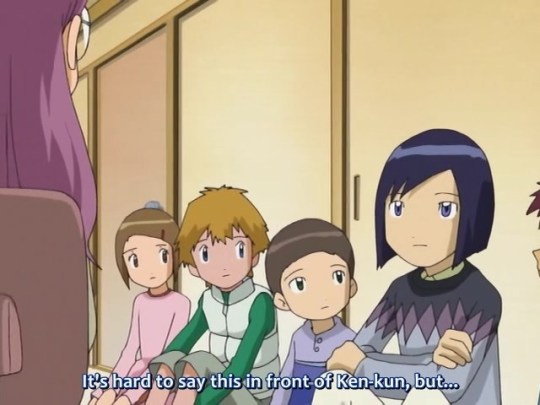
...the one actually leading the roundtable? Miyako.
Miyako: Sorry, that's all I can think of. Ken: Please don't worry about me. Miyako: (nods)
It’s subtle, but the scene in question does actually make a deliberate move in indicating that Miyako’s continuing to channel her emotional sensitivity and desire to go out of her way to help Ken -- of course, they all know how traumatic this is for him, but she’s the one who’s actively calling attention to how he must feel about it first and foremost.
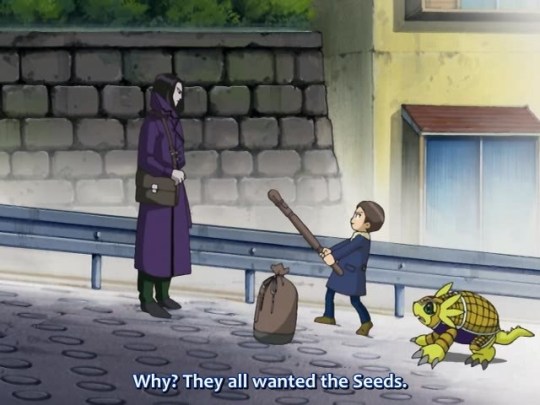
Episodes 47 and after end up becoming yet another major wake-up call for Iori (seriously, I do not understand why people claim he had no character arc when this wasn’t even remotely subtle) when he learns that Oikawa, whom he’d pinned as “evil”, has a deep relationship with the father he’d grown up idolizing so much, and it completely flips his world around -- even though he had started to get a bit more open-minded, he’s still trying to rationalize what should have been, in his mind, two diametrically opposite things. It fuels his confusion and desperate desire to understand more, not just about Oikawa, but about everything he’d thought about morality and why people turn to evil.
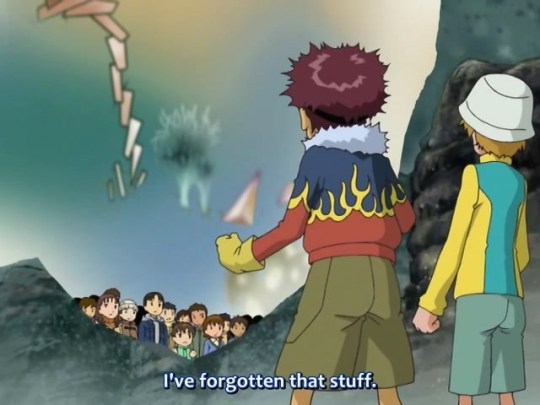
So we get to the final arc of the series, and it involves a confrontation with BelialVamdemon -- but said finale is heavily dependent on talking to the Dark Seed children and inspiring hope back into them. This results in a conversation where everyone talks about their career dreams, and Daisuke admits that he wants to be...a ramen chef, which completely blindsides even his friends.
What’s with this arc?, you might think. And moreover, why is Daisuke ending the series still kind of an idiot? Even Miyako still seems to be a bit of a mess and chaotic. Weren’t they supposed to be growing into dignified heroes, like Taichi and his friends were last series?
Well, here’s the thing -- the fact that the 02 kids end the series comparatively “undignified” is actually very inherent to the core theme of 02 itself. There were more than enough episodes that established that said kids are heroic in their own way -- caring about others, fighting on others’ behalf, and learning important lessons about what’s important to fight about. That doesn’t mean they don’t get the right to continue being disaster children while they’re at it.
Why?
Let’s look at a few official statements behind the creation and intent behind 02 as a series. From producer Seki Hiromi, from the Digimon Animation Chronicle:
That came from an idea I had while reading a newspaper article. I read a story about a nine-year-old boy going to Columbia University, and I thought, “This boy is going to college because he’s considered a genius, and everyone around him will be in their twenties, and he won’t get to have any friends his age. What kind of life would this boy end up having?”
Or some very interesting statements from head writer Yoshimura Genki from the 02 Blu-ray box:
When I was writing Ken Ichijouji, the main idea for him I used as a basis was the conflict between “the self that has to be a well-behaved child when adults are watching” and “being able to be oneself”, and the pain that came from it as a result. So for instance, in the same way as the Pinnocchio fairytale, or the short story A.I. that was adapted into a movie, or many other works, there are probably universal worries that all children feel as they grow, but also, there were ongoing unimaginable, atrocious incidents happening with children at the time, and perhaps it was those social conditions that gave me a hint on what to do. I think I had some thoughts that I wanted to convey to the children who were living through that time. I was given the opportunity to put those kinds of feelings, as much as I liked, into episode 23, and I am truly grateful to all of the staff, including the director. ... Also, this is about Daisuke’s character, but I believe I paid particular attention to making him “a child who could be himself”. He has no special talents, and although he’s clumsy and scatterbrained, I wanted him to be someone whose strength was in his straightforwardness, and wrote him that way.
Lying underneath the entirety of 02 itself is a theme about “children who are not allowed to be children”. Or, in other words, the pressure placed on children to be “talented” and “dignified” and “well-behaved”, often imposed on them by well-meaning parents who are unfortunately taking the opportunity to stroke their own ego, robbing them of the happiness and mental freedoms they should have as kids.
Ichijouji Osamu and Ken, who were placed under the pressure to be “genius children” and cracked under the pressure to please their parents. Oikawa Yukio, who was cut off from the Digital World in childhood by a well-meaning Hida Chikara, worried about his son getting into “foolish” talk. The Dark Seed children, who also fell victim to similar pressures that Ken did, and lost hope for life unless they could force themselves into that mold.
Takeru: If you want the Digimon to exist, if you believe in that, they will. Just like our feelings...Just like every child having the power to make their dreams come true. Keiko: That's just childish. Daisuke: You all have dreams for the future, don't you? Noriko: Dreams for the future? Takashi: I've forgotten that stuff. Daisuke: No way! You must have one! Takeru: It's nothing to be ashamed of. Takashi: Then, what's your dream? Daisuke: Mine? Mine's a ramen shop. I love ramen! I'll become the world's best ramen maker! Ken: I had no idea... Noriko: Well...actually, I wanted to be a kindergarten teacher. Hikari: Me too. Daisuke: What about you guys? Takashi: A baseball player! Keiko: I really want to be a pastry chef. Hiroshi: When I said I wanted to be a manga artist, everyone laughed, so I gave up... Takashi: We all had aspirations, and at some point we thought that wasn't allowed...But we were wrong, right? Daisuke: Let people say whatever they want! Noriko: You're right, we should be free to dream. Miyako: Not just dreaming. If you work hard, your dreams will surely come true!
Notice something about all of these careers mentioned? They’re all the kind of “overly childish” “wild dream” “undignified” “too simple” kinds of dreams that an average parent might be uncomfortably quick to shoot down because that’s “not good enough”. These are the kids who willingly accepted the Dark Seeds; they, much like Ken, probably grew up under parents who prioritized school performance and other “societally dignified” things that ended up eating away at their happiness.
02 has a lot of different themes, but the one that lies in its undercurrent from start to finish is “so why does a child have to be this way? As long as they still understand what’s important, do they have to be dignified people? Why can’t they just be free to have dreams and be themselves?” And Daisuke and his friends are there specifically to stand up against this mentality, and to remind Ken and the other victims of it that it doesn’t have to be this way -- that it’s okay to be your true self, and be a child, and not succumb to all of those arbitrary, shallow standards people put on you. Even if that means you’re still a bit of a chaotic disaster at the tender age of eleven.
Digimon, in the Adventure and 02 universe, have always been treated like a part of the self (they were literally conceived as a physical manifestation of the soul), but in 02 they gain an extra meaning of representing “the inner, deepest part of yourself that represents your wildest ‘childish’ dreams”. The symbolism of Ken spending the first half of the series trying to reject Wormmon for being “weak” -- in other words, rejecting his own kind-hearted self for not being the kind of “strong” entity he was pressured and groomed into being -- is not lost, nor that of the Dark Seed children gaining partners when they reconnect with their dreams and wishes, nor Oikawa finally, finally meeting his partner when he comes into contact with the past he’d really lost (and especially not the fact that his attempt to reclaim shallow reminders of said childhood involved trying to make his own Digimon).
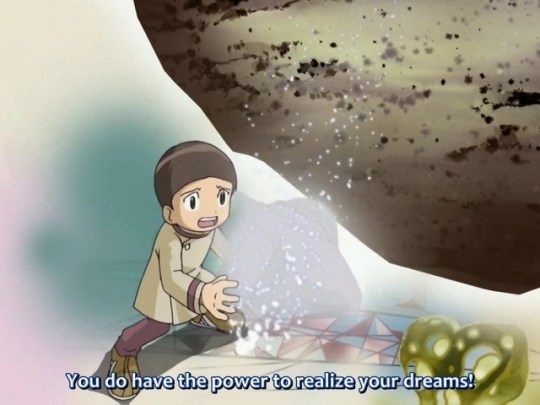
And notably, the series’s finale (prior to the epilogue) ends not on Daisuke but on Iori, escorting Oikawa to the Digital World despite how completely impossible it would have been for early-series Iori to even entertain the idea, finally coming to truly understand what happened with him and being most personally impacted by his death.
But in any case, where are we with the characters? We’re here to talk about how they’ve grown and developed over the course of the series. Let’s recap:
Daisuke: Started off the series as an abrasive kid with more bark than actual bite, constantly deferring to others and easily deflating, relying on shallow sources of validation like wanting attention from Hikari; gradually gained an ability to identify what was important and put his foot down for it, embraced his forward-thinkingness to reach out to a heavily troubled child as a friend, and ended up surrounded by a friend group that loves and respects him.
Miyako: Started off the series as a shallow, flighty girl with poor control over her emotions and difficulty in appreciating the gravity of things; came to channel her emotional range into empathy for others and compassion, bringing other people together and taking care of them.
Iori: Started off the series as a straight-laced but too principled child who stuck to “rules of what’s right” not only in morality but also in way of acting; started to appreciate the emotional nuances and heart behind why people do what they do and how it’s possible to be more flexible in “doing good”.
Ken: Well, his character arc is pretty obvious, but -- again, while his arc of learning to forgive himself is well-known, less often pointed out is that it centers very heavily on not only having penance but also not being too hung up on the past, and the futility of drowning in self-pity and regret instead of choosing to take responsibility and act more productively going forward.
Takeru: Started off the series as a seemingly mature but deceptively inscrutable character whose duality made him hard to approach; eventually opened up with the help of others and showed a capacity for being more flexible with his personal grudges.
Hikari: Started off the series emotionally repressive and passive to the point of self-destruction; eventually embraced connections with her other friends and became more active in taking a stand for herself.
Hey, not bad!
And, again, this is not a series you should be reading in terms of “self-awareness” in the same way Adventure was, but in the sense of their “relationships” and how they interact with others. By being less abrasive and more assertive, Daisuke gained the respect of his other friends. By putting her emotional capacity into caring about others, Miyako became someone who holds the group together. By learning to think a little more flexibly and be less stubborn, Iori arrived at a position where he could more easily sympathize with others in the group. Takeru and Hikari both moved from their previously relatively inscrutable positions to ones who could more effectively interact with and open up to others. And Ken, of course, became someone who managed to integrate himself into a group of true “friends” despite everything he had done against them in the first half.
This, in the end, is how you get what’s one of the tightest friend groups in Digimon history. In the end, the relationships themselves are almost like characters of their own that got development -- I say very often that you could take two of the characters and have an excellent scope of how they’d interact and play off each other by the end of the series. And although they end the series as possibly one of the most shameless, undignified disaster groups out there...they’re certainly still heroic, and in any case, given the lessons they learned throughout their own series, they probably wouldn’t have it any other way.
256 notes
·
View notes